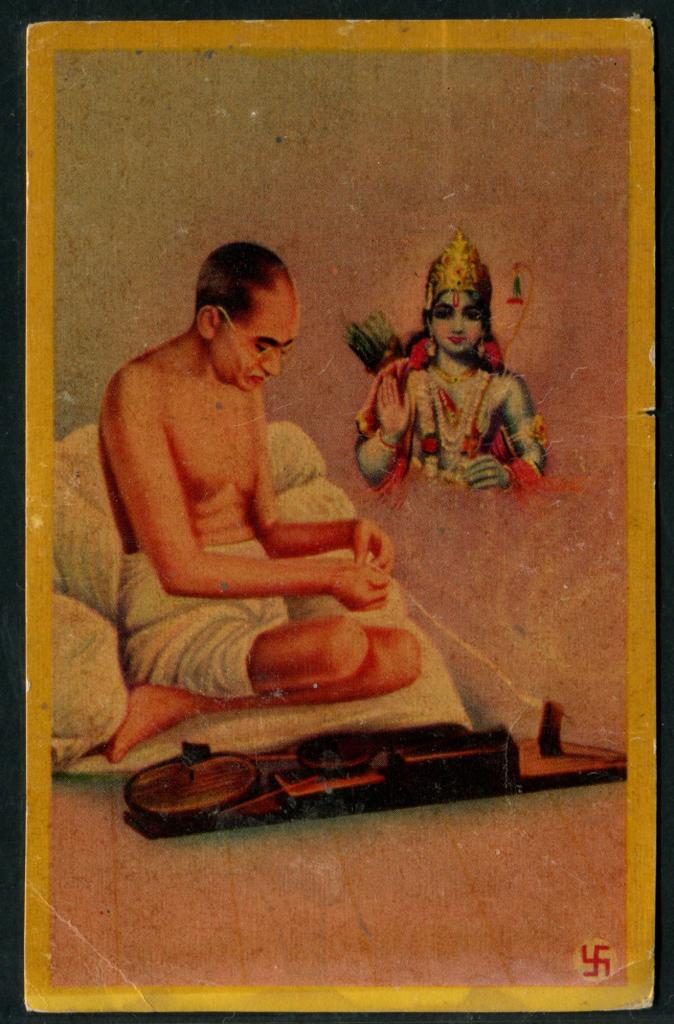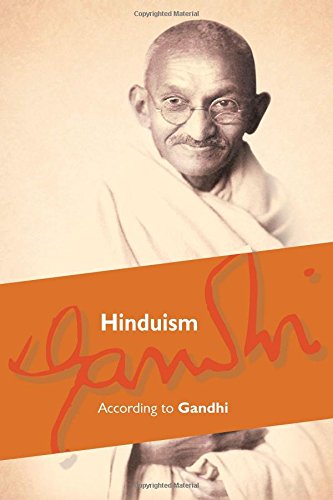ARCHIVE
At Benares Hindu University (Benares, February, 1916)
MOHANDAS KARAMCHAND GANDHI
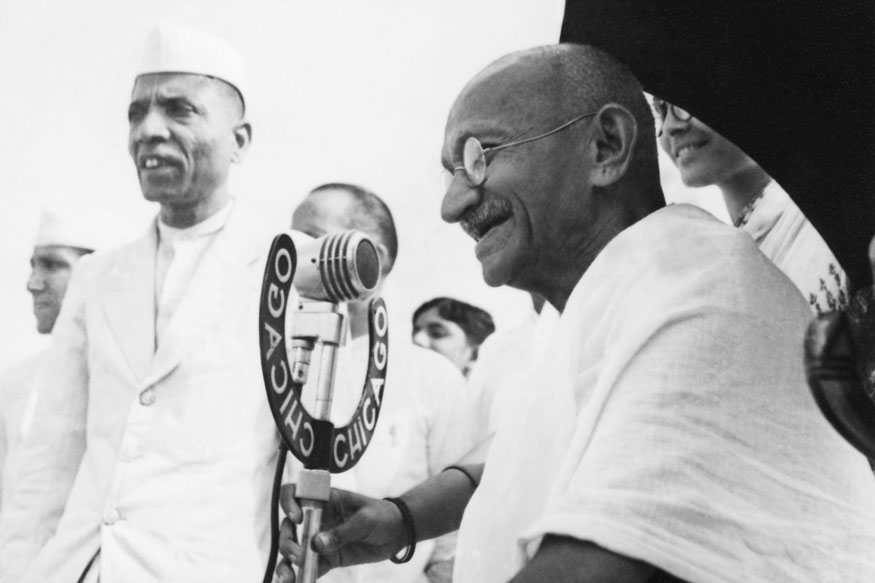
Mahatma Gandhi
I wish to tender my humble apology for the long delay that took place before I was able to reach this place. And you will readily accept the apology when I tell you that I am not responsible for the delay nor is any human agency responsible for it. The fact is that I am like an animal on show, and my keepers in their over kindness always manage to neglect a necessary chapter in this life, and, that is, pure accident. In this case, they did not provide for the series of accidents that happened to us—to me, keepers, and my carriers. Hence this delay.
Friends, under the influence of the matchless eloquence of Mrs Besant who has just sat down, pray, do not believe that our University has become a finished product, and that all the young men who are to come to the University, that has yet to rise and come into existence, have also come and returned from it finished citizens of a great empire. Do not go away with any such impression, and if you, the student world to which my remarks are supposed to be addressed this evening, consider for one moment that the spiritual life, for which this country is noted and for which this country has no rival, can be transmitted through the lip, pray, believe me, you are wrong. You will never be able merely through the lip, to give the message that India, I hope, will one day deliver to the world. I myself have been fed up with speeches and lectures. I accept the lectures that have been delivered here during the last two days from this category, because they are necessary. But I do venture to suggest to you that we have now reached almost the end of our resources in speech-making; it is not enough that our ears are feasted, that our eyes are feasted, but it is necessary that our hearts have got to be touched and that our hands and feet have got to be moved.
We have been told during the last two days how necessary it is, if we are to retain our hold upon the simplicity of Indian character, that our hands and feet should move in unison with our hearts. But this is only by way of preface. I wanted to say it is a matter of deep humiliation and shame for us that I am compelled this evening under the shadow of this great college, in this sacred city, to address my countrymen in a language that is foreign to me. I know that if I was appointed an examiner, to examine all those who have been attending during these two days this series of lectures, most of those who might be examined upon these lectures would fail. And why? Because they have not been touched.
I wanted to say it is a matter of deep humiliation and shame for us that I am compelled this evening under the shadow of this great college, in this sacred city, to address my countrymen in a language that is foreign to me. I know that if I was appointed an examiner, to examine all those who have been attending during these two days this series of lectures, most of those who might be examined upon these lectures would fail. And why? Because they have not been touched.
I was present at the sessions of the great Congress in the month of December. There was a much vaster audience, and will you believe me when I tell you that the only speeches that touched the huge audience in Bombay were the speeches that were delivered in Hindustani? In Bombay, mind you, not in Benaras where everybody speaks Hindi. But between the vernaculars of the Bombay Presidency on the one hand and Hindi on the other, no such great dividing line exists as there does between English and the sister language of India; and the Congress audience was better able to follow the speakers in Hindi. I am hoping that this University will see to it that the youths who come to it will receive their instruction through the medium of their vernaculars. Our languages are the reflection of ourselves, and if you tell me that our languages are too poor to express the best thought, then say that the sooner we are wiped out of existence the better for us. Is there a man who dreams that English can ever become the national language of India? Why this handicap on the nation? Just consider for one moment what an equal race our lads have to run with every English lad.
I had the privilege of a close conversation with some Poona professors. They assured me that every Indian youth, because he reached his knowledge through the English language, lost at least six precious years of life. Multiply that by the numbers of students turned out by our schools and colleges, and find out for yourselves how many thousand years have been lost to the nation. The charge against us is that we have no initiative. How can we have any, if we are to devote the precious years of our life to the mastery of a foreign tongue? We fail in this attempt also. Was it possible for any speaker yesterday and today to impress his audience as was possible for Mr Higginbotham? It was not the fault of the previous speakers that they could not engage the audience. They had more than substance enough for us in their addresses. But their addresses could not go home to us. I have heard it said that after all it is English educated India which is leading and which is doing all the things for the nation. It would be monstrous if it were otherwise. The only education we receive is English education. Surely we must show something for it. But suppose that we had been receiving during the past fifty years’ education through our vernaculars, what should we have today? We should have today a free India, we should have our educated men, not as if they were foreigners in their own land but speaking to the heart of the nation; they would be working amongst the poorest of the poor, and whatever they would have gained during these fifty years would be a heritage for the nation. Today even our wives are not the sharers in our best thought. Look at Professor Bose and Professor Ray and their brilliant researches. Is it not a shame that their researches are not the common property of the masses?
I have heard it said that after all it is English educated India which is leading and which is doing all the things for the nation. It would be monstrous if it were otherwise. The only education we receive is English education. Surely we must show something for it. But suppose that we had been receiving during the past fifty years’ education through our vernaculars, what should we have today? We should have today a free India, we should have our educated men, not as if they were foreigners in their own land but speaking to the heart of the nation; they would be working amongst the poorest of the poor, and whatever they would have gained during these fifty years would be a heritage for the nation.
Let us now turn to another subject.
The Congress has passed a resolution about self-government, and I have no doubt that the All-India Congress Committee and the Muslim League will do their duty and come forward with some tangible suggestions. But I, for one, must frankly confess that I am not so much interested in what they will be able to produce as I am interested in anything that the student world is going to produce or the masses are going to produce. No paper contribution will ever give us self-government. No amount of speeches will ever make us fit for self-government. It is only our conduct that will make us fit for it. And how are we trying to govern ourselves?
I want to think audibly this evening. I do not want to make a speech and if you find me this evening speaking without reserve, pray, consider that you are only sharing the thoughts of a man who allows himself to think audibly, and if you think that I seem to transgress the limits that courtesy imposes upon me, pardon me for the liberty I may be taking. I visited the Vishwanath temple last evening, and as I was walking through those lanes, these were the thoughts that touched me. If a stranger dropped from above on to this great temple, and he had to consider what we as Hindus were, would he not be justified in condemning us? Is not this great temple a reflection of our own character? I speak feelingly, as a Hindu. Is it right that the lanes of our sacred temple should be as dirty as they are? The houses round about are built anyhow. The lanes are tortuous and narrow. If even our temples are not models of roominess and cleanliness, what can our self-government be? Shall our temples be abodes of holiness, cleanliness and peace as soon as the English have retired from India, either of their own pleasure or by compulsion, bag and baggage?
I entirely agree with the President of the Congress that before we think of self-government, we shall have to do the necessary plodding. In every city there are two divisions, the cantonment and the city proper. The city mostly is a stinking den. But we are a people unused to city life. But if we want city life, we cannot reproduce the easy-going hamlet life. It is not comforting to think that people walk about the streets of Indian Bombay under the perpetual fear of dwellers in the storeyed building spitting upon them. I do a great deal of railway travelling. I observe the difficulty of third-class passengers. But the railway administration is by no means to blame for all their hard lot.
We do not know the elementary laws of cleanliness. We spit anywhere on the carriage floor, irrespective of the thoughts that it is often used as sleeping space. We do not trouble ourselves as to how we use it; the result is indescribable filth in the compartment. The so-called better class passengers overawe their less fortunate brethren. Among them I have seen the student world also; sometimes they behave no better. They can speak English and they have worn Norfolk jackets and, therefore, claim the right to force their way in and command seating accommodation.
We do not know the elementary laws of cleanliness. We spit anywhere on the carriage floor, irrespective of the thoughts that it is often used as sleeping space. We do not trouble ourselves as to how we use it; the result is indescribable filth in the compartment. The so-called better class passengers overawe their less fortunate brethren.
I have turned the searchlight all over, and as you have given me the privilege of speaking to you, I am laying my heart bare. Surely we must set these things right in our progress towards self-government. I now introduce you to another scene. His Highness the Maharaja who presided yesterday over our deliberations spoke about the poverty of India. Other speakers laid great stress upon it. But what did we witness in the great pandal in which the foundation ceremony was performed by the Viceroy? Certainly a most gorgeous show, an exhibition of jewellery, which made a splendid feast for the eyes of the greatest jeweler who chose to come from Paris. I compare with the richly bedecked noble men the millions of the poor. And I feel like saying to these noble men, ‘There is no salvation for India unless you strip yourselves of this jewellery and hold it in trust for your countrymen in India.’ I am sure it is not the desire of the King-Emperor or Lord Hardinge that in order to show the truest loyalty to our King-Emperor, it is necessary for us to ransack our jewellery boxes and to appear bedecked from top to toe. I would undertake, at the peril of my life, to bring to you a message from King George himself that he accepts nothing of the kind.
Sir, whenever I hear of a great palace rising in any great city of India, be it in British India or be it in India which is ruled by our great chiefs, I become jealous at once, and say, ‘Oh, it is the money that has come from the agriculturists.’ Over seventy-five percent of the population are agriculturists and Mr Higginbotham told us last night in his own felicitous language, that they are the men who grow two blades of grass in the place of one. But there cannot be much spirit of self-government about us, if we take away or allow others to take away from them almost the whole of the results of their labour. Our salvation can only come through the farmer. Neither the lawyers, nor the doctors, nor the rich landlords are going to secure it.
Now, last but not the least, it is my bounden duty to refer to what agitated our minds during these two or three days. All of us have had many anxious moments while the Viceroy was going through the streets of Benares. There were detectives stationed in many places. We were horrified. We asked ourselves, ‘Why this distrust?’ Is it not better that even Lord Hardinge should die than live a living death? But a representative of a mighty sovereign may not. He might find it necessary to impose these detectives on us? We may foam, we may fret, we may resent, but let us not forget that India of today in her impatience has produced an army of anarchists. I myself am an anarchist, but of another type. But there is a class of anarchists amongst us, and if I was able to reach this class, I would say to them that their anarchism has no room in India, if India is to conquer the conqueror. It is a sign of fear. If we trust and fear God, we shall have to fear no one, not the maharajas, not the viceroys, not the detectives, not even King George.
I myself am an anarchist, but of another type. But there is a class of anarchists amongst us, and if I was able to reach this class, I would say to them that their anarchism has no room in India, if India is to conquer the conqueror. It is a sign of fear. If we trust and fear God, we shall have to fear no one, not the maharajas, not the viceroys, not the detectives, not even King George.
I honour the anarchist for his love of the country. I honour him for his bravery in being willing to die for his country; but I ask him— is killing honourable? Is the dagger of an assassin a fit precursor of an honourable death? I deny it. There is no warrant for such methods in any scriptures. If I found it necessary for the salvation of India that the English should retire, that they should be driven out, I would not hesitate to declare that they would have to go, and I hope I would be prepared to die in defense of that belief. That would, in my opinion, be an honourable death. The bombthrower creates secret plots, is afraid to come out into the open, and when caught pays the penalty of misdirected zeal.
I have been told, ‘Had we not done this, had some people not thrown bombs, we should never have gained what we have got with reference to the partition movement.’ (Mrs Besant: ‘Please stop it.’) This was what I said in Bengal when Mr Lyon presided at the meeting. I think what I am saying is necessary. If I am told to stop I shall obey. (Turning to the Chairman) I await your orders. If you consider that by my speaking as I am, I am not serving the country and the empire I shall certainly stop. (Cries of ‘Go on.’) (The Chairman: ‘Please, explain your object.’) I am simply… (another interruption). My friends, please do not resent this interruption. If Mrs Besant this evening suggests that I should stop, she does so because she loves India so well, and she considers that I am erring in thinking audibly before you young men. But even so, I simply say this, that I want to purge India of this atmosphere of suspicion on either side, if we are to reach our goal; we should have an empire which is to be based upon mutual love and mutual trust. Is it not better that we talk under the shadow of this college than that we should be talking irresponsibly in our homes? I consider that it is much better that we talk these things openly. I have done so with excellent results before now. I know that there is nothing that the students do not know. I am, therefore, turning the searchlight towards ourselves. I hold the name of my country so dear to me that I exchange these thoughts with you, and submit to you that there is no room for anarchism in India. Let us frankly and openly say whatever we want to say our rulers, and face the consequences if what we have to say does not please them. But let us not abuse.
I was talking the other day to a member of the much-abused Civil Service. I have not very much in common with the members of that Service, but I could not help admiring the manner in which he was speaking to me. He said: ‘Mr Gandhi, do you for one moment suppose that all we, Civil Servants, are a bad lot, that we want to oppress the people whom we have come to govern?’ ‘No,’ I said. ‘Then if you get an opportunity put in a word for the much-abused Civil Service.’ And I am here to put in that word. Yes, many members of the Indian Civil Service are most decidedly overbearing; they are tyrannical, at times thoughtless. Many other adjectives may be used. I grant all these things and I grant also that after having lived in India for a certain number of years some of them become somewhat degraded. But what does that signify? They were gentlemen before they came here, and if they have lost some of the moral fibre, it is a reflection upon ourselves.
Just think out for yourselves, if a man who was good yesterday has become bad after having come in contact with me, is he responsible that he has deteriorated or am I? The atmosphere of sycophancy and falsity that surrounds them on their coming to India demoralizes them, as it would many of us. It is well to take the blame sometimes. If we are to receive self-government, we shall have to take it. We shall never be granted self-government. Look at the history of the British Empire and the British nation; freedom loving as it is, it will not be a party to give freedom to a people who will not take it themselves. Learn your lesson if you wish to from the Boer War. Those who were enemies of that empire only a few years ago have now become friends…
If we are to receive self-government, we shall have to take it. We shall never be granted self-government. Look at the history of the British Empire and the British nation; freedom loving as it is, it will not be a party to give freedom to a people who will not take it themselves. Learn your lesson if you wish to from the Boer War. Those who were enemies of that empire only a few years ago have now become friends…
(At this point there was an interruption and a movement on the platform to leave. The speech, therefore, ended here abruptly).
Election Speech (December, 1926)
KAMALADEVI CHATTOPADHYAY
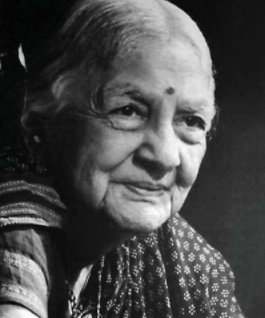
Kamaladevi Chattopadhyay
If you peep into the dim unknown history of India, the history of which is written not on palm leaves or papers, but is alive in the hearts of everyone of us, you will find that the position of women was indeed an enviable one. Never in the history of any country, at any time, has woman been so honoured as she has been in this country. Though apparently she seems to have lost her voice, she has always been the vital element in the evolution of the country and the nation. When I was travelling abroad, I was often asked how the suffragist movement in India was progressing. I could only tell them that there was no suffragist movement in India. In fact, there was no need for such a movement. The last few years have proved this. As soon as the new reforms came in the franchise was granted, and closely following upon its heels came the removal of the ban on sex-disqualification. The time has now come when women should come forward and share the responsibilities equally with men. All over the world women are now taking a keen and an active part in all departments of life.
The time has now come when women should come forward and share the responsibilities equally with men. All over the world women are now taking a keen and an active part in all departments of life.
I stand now as an Independent. I stand for no party or community. I stand as a representative of women. I am not a Swarajist candidate and I am not a member of the Swarajya Party. I do not believe in the policy of obstruction and walk-out. What the Swarajya programme for this year is, I do not know. Whether it is going to accept office or not, does not concern me. That temptation does not come in my way.
People have been questioning me what my political precedents are. I have been interested in politics for several years now. When the great Non-Co-operation Movement was started, my husband and I were pursuing studies in England. The great message came to us over the waters. Our hearts throbbed to the cries of the great nation. Gandhi’s message of love thrilled us, and we felt that we should not be led away by the glamor of foreign degrees. A golden opportunity had been offered to us to do our bit for our country. By the time we had completed our tour and landed in India, Mahatamaji had been imprisoned for some time. When we landed in India we were met by Mrs. [Sarojini] Naidu. The first question we asked her was: What was the condition of the country? She said there was no condition at all. Death had already set in. Our burning spirits were as defeated with this reply. We enlisted ourselves as Congress members and and tried to do our bit, but a good many difficulties arose in our way.
We soon found much of our precious time getting scattered. We then decided to do the same work through the arts and achieve the same end. So at the Belgaum Congress, we consulted Mahatmaji. He gladly assented to our plans and with his blessings we started upon our work. We have been trying to wake up the political consciousness of the country through poetry, through music and through drama. It was just a month ago that we met Mahatma Gandhi in Bombay and he said: “Though I am pressed with heavy work, I have found time to watch with pleasure your progress. Though I cannot be with you in person, let me admire you from a distance. When you have a little leisure come to my Ashram and show my boys the beauties of your art.” Even on the day I was leaving for Mangalore we received two wires asking us to go to him. It was indeed a great temptation I had to resist. All these three years, though I have not been active in the political field, all the time I have been in close touch with politics.
If women in other countries have proved competent enough to handle these problems I do not think an Indian woman will prove an exception. For years you have been sending men to the councils. Some of them have done something for this district. Others have done nothing. So even if a woman fails to fulfill your expectations you have not much to regret.
As to what work I shall do in the council, though no doubt I shall try to tackle problems that are intimately connected with women and children, I feel confident that with time and study I shall be in a position to handle general questions as well. During the course of my tour I have been observing and studying the local grievances. I have been trying to get first-hand information as to the Forest and Land Act. Some of the main problems agitating the public mind just now are the abolition of the old Rent Recovery Act without the introduction of any new compensating one and the Revenue Settlement Act. I have enough of leisure at my disposal to devote it to this work. I appeal to you to give me a chance. If women in other countries have proved competent enough to handle these problems I do not think an Indian woman will prove an exception. For years you have been sending men to the councils. Some of them have done something for this district. Others have done nothing. So even if a woman fails to fulfill your expectations you have not much to regret. Some of you may have some conscientious objections in supporting my candidature either on the ground of sex or otherwise. I appeal to them in that case, at least, to remain neutral as far as possible.
For, remember, when you work against me, you insult all womankind, you work against your own mothers, your sisters, your daughters.
When you lend me your support, it is not merely a personal favour you do to me, but you pay your homage to womankind. If the first Indian woman who has come forward in spite of all difficulties and obstacles is not helped, it will greatly discourage the women who in the future might stand for elections. So the privilege granted to women will be hardly of any service.
When you lend me your support, it is not merely a personal favour you do to me, but you pay your homage to womankind. If the first Indian woman who has come forward in spite of all difficulties and obstacles is not helped, it will greatly discourage the women who in the future might stand for elections. So the privilege granted to women will be hardly of any service. I am not concerned very much with the result. I shall do my best. I wish to prove to the world that a woman can fight and fight well in spite of everything. Woman in India has always stood for strength and not weakness. She is the Divine Shakti. Whether it is a mere sentiment or a living flame, will be proved by the elections.
Speech at Mahad (Mahad, December 1927)
BHIMRAO RAMJI AMBEDKAR
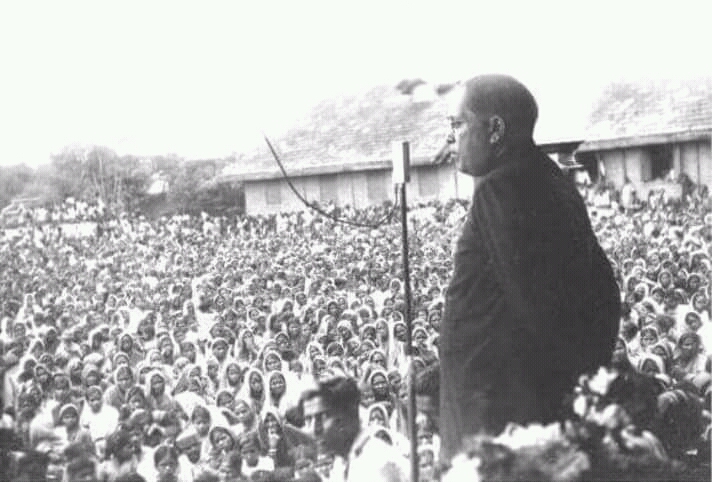
B.R. Ambedkar
Gentlemen, you have gathered here today in response to the invitation of the Satyagraha Committee. As the Chairman of that Committee, I gratefully welcome you all.
Many of you will remember that on the 19th of last March all of us came to the Chavadar Lake here. The caste Hindus of Mahad had laid no prohibition on us; but they showed they had objections to our going there by the attack they made. The fight brought results that one might have expected. The aggressive caste Hindus were sentenced to four months’ rigorous imprisonment, and are now in jail. If we had not been hindered on 19th March, it would have been proved that the caste Hindus acknowledge our right to draw water from the lake, and we should have had no need to begin our present undertaking.
Unfortunately we were thus hindered, and we have been obliged to call this meeting today. This lake at Mahad is public property. The caste Hindus of Mahad are so reasonable that they not only draw water from the lake themselves but freely permit people of any religion to draw water from it, and accordingly people of other religions such as the Islamic do make use of this permission. Nor do the caste Hindus prevent members of species considered lower than the human, such as birds and beasts, from drinking at the lake. Moreover, they freely permit beasts kept by untouchables to drink at the lake.
Caste Hindus are the very founts of compassion. They practise no hinsa and harass no one. They are not of the class of miserly and selfish folk who would grudge even a crow some grains of the food they are eating. The proliferation of sanyasis and mendicants is a living testimony to their charitable temperament. They regard altruism as religious merit and injury to another as a sin.
Even further, they have imbibed the principle that injury done by another must not be repaid but patiently endured, and so, they not only treat the harmless cow with kindness, but spare harmful creatures such as snakes. That one Atman or Spiritual Self dwells in all creatures has become a settled principle of their conduct. Such are the caste Hindus who forbid some human beings of their own religion to draw water from the Same Chavadar Lake! One cannot help asking the question, why do they forbid us alone?
Such are the caste Hindus who forbid some human beings of their own religion to draw water from the Same Chavadar Lake! One cannot help asking the question, why do they forbid us alone?
It is essential that all should understand thoroughly the answer to this question. Unless you do, I feel, you will not grasp completely the importance of today’s meeting. The Hindus are divided, according to sacred tradition, into four castes; but according to custom, into five: Brahmins, Kshatriyas, Vaishyas, Shudras and Atishudras. The caste system is the first of the governing rules of the Hindu religion. The second is that the castes are of unequal rank. They are ordered in a descending series of each meaner than the one before.
Not only are their ranks permanently fixed by the rule, but each is assigned boundaries it must not transgress, so that each one may at once be recognized as belonging to its particular rank. There is a general belief that the prohibitions in the Hindu religion against intermarriage, interdining, inter drinking and social intercourse are bounds set to degrees of association with one another. But this is an incomplete idea. These prohibitions are indeed limits to degrees of association; but they have been set to show people of unequal rank what the rank of each is. That is, these bounds are symbols of inequality.
Just as the crown on a man’s head shows he is a king, and the bow in his hand shows him to be a Kshatriya, the class to which none of the prohibitions applies is considered the highest of all and the one to which they all apply is reckoned the lowest in rank. The strenuous efforts made to maintain the prohibitions are for the reason that, if they are relaxed, the inequality settled by religion will break down and equality will take its place.
The caste Hindus of Mahad prevent the untouchables from drinking the water of the Chavadar Lake not because they suppose that the touch of the untouchables will pollute the water or that it will evaporate and vanish. Their reason for preventing the untouchables from drinking it is that they do not wish to acknowledge by such a permission that castes declared inferior by sacred tradition are in fact their equals.
Gentlemen! you will understand from this the significance of the struggle we have begun. Do not let yourselves suppose that the Satyagraha Committee has invited you to Mahad merely to drink the water of the Chavadar Lake of Mahad.
It is not as if drinking the water of the Chavadar Lake will make us immortal. We have survived well enough all these days without drinking it. We are not going to the Chavadar Lake merely to drink its water. We are going to the Lake to assert that we too are human beings like others. It must be clear that this meeting has been called to set up the norm of equality.
It is not as if drinking the water of the Chavadar Lake will make us immortal. We have survived well enough all these days without drinking it. We are not going to the Chavadar Lake merely to drink its water. We are going to the Lake to assert that we too are human beings like others. It must be clear that this meeting has been called to set up the norm of equality.
I am certain that no one who thinks of this meeting in this light will doubt that it is unprecedented. I feel that no parallel to it can be found in the history of India. If we seek for another meeting in the past to equal this, we shall have to go to the history of France on the continent of Europe. A hundred and thirty-eight years ago, on 24 January 1789, King Louis XVI had convened, by royal command, an assembly of deputies to represent the people of the kingdom. His French National Assembly has been much vilified by historians. The Assembly sent the King and the Queen of France to the guillotine; persecuted and massacred the aristocrats; and drove their survivors into exile. It confiscated the estates of the rich and plunged Europe into war for fifteen years. Such are the accusations leveled against the Assembly by the historians. In my view, the criticism is misplaced; further, the historians of this school have not understood the gist of the achievement of the French National Assembly. That achievement served the welfare not only of France but of the entire European continent. If European nations enjoy peace and prosperity today, it is for one reason: the revolutionary French National Assembly convened in 1789 set new principles for the organization of society before the disorganized and decadent French nation of its time, and the same principles have been accepted and followed by Europe.
To appreciate the importance of the French National Assembly and the greatness of its principles, we must keep in mind the suite of French society at the time. You are all aware that our Hindu society is based on the system of castes. A rather similar system of classes existed in the France of 1789: the difference was that it was a society of three castes. Like the Hindu society, the French had a class of Brahmins and another of Kshatriyas. But instead of three different castes of Vaishya, Shudra, and Atishudra, there was one class that comprehended these. This is a minor difference. The important thing is that the caste or class system was similar. The similarity to be noted is not only in the differentiation between classes: the inequality of our caste system was also to be found in the French social system. The nature of the inequality in the French society was different: it was economic in nature. It was, however, equally intense. The thing to bear in mind is there is a great similarity between the French National Assembly that met on 5 May 1789 at Versailles and our meeting today. The similarity is not only in the circumstances in which the two meetings took place but also in their ideals.
That Assembly of the French people was convened to reorganize French society. Our meeting today too has been convened to reorganize Hindu society. Hence, before discussing on what principles our society should be reorganized, we should all pay heed to the principles on which the French Assembly relied and the policy it adopted. The scope of the French Assembly was far wider than that of our present meeting. It had to carry out the threefold organization of the French political, social and religious systems. We must confine ourselves to how social and religious reorganization can be brought about. Since we are not, for the present, concerned with political reorganization, let us see what the French Assembly did in the matter of the religious and social reorganization of their nation. The policy adopted by the French National Assembly in this area can be seen plainly by anyone from three important proclamations issued by that Assembly. The first was issued on 17 June 1789. This was a proclamation about the class systems in France. As said before, French society was divided into three classes. The proclamation abolished the three classes and blended them into one. Further, it abolished the seats reserved separately for the three classes (or estates) in the political assembly. The second proclamation was about the priests. By ancient custom, to appoint or remove these priests was outside the power of the nation, that being the monopoly of a foreign religious potentate, the Pope. Anyone appointed by the Pope was a priest, whether or not he was fit to be one in the eyes of those to whom he was to preach. The proclamation abolished the autonomy of the religious orders and assigned to the French nation the authority to decide who might follow this vocation, who was fit for it and who was not, whether he was to be paid for preaching or not, and so on. The third proclamation was not about the political, economic or religious systems. It was of a general nature and laid down the principles on which all social arrangements ought to rest. From that point of view, the third proclamation is the most important of the three; it might be called the king of these proclamations. It is renowned the world over as the declaration of human birthrights. It is not only unprecedented in the history of France; more than that, it is unique in the history of civilized nations. For every European nation has followed the French Assembly in giving it a place in its own constitution. So one may say that it brought about a revolution not only in France but the whole world. This proclamation has seventeen clauses, of which the following are important:
Any person is free to act according to his birthright. Any limit placed upon this freedom must be only to the extent necessary to permit other persons to enjoy their birthrights. Such limits must be laid down by law: they cannot be set on the grounds of the religion or on any other basis than the law of the land.
1) All human beings are equal by birth; and they shall remain equal till death. They may be distinguished in status only in the public interest. Otherwise, their equal status must be maintained.
2) The ultimate object of politics is to maintain these human birthrights.
3) The entire nation is the mother-source of sovereignty. The rights of any individual, group or special class, unless they are given by the nation, cannot be acknowledged as valid on any other ground, be it political or religious.
4) Any person is free to act according to his birthright. Any limit placed upon this freedom must be only to the extent necessary to permit other persons to enjoy their birthrights. Such limits must be laid down by law: they cannot be set on the grounds of the religion or on any other basis than the law of the land.
5) The law will forbid only such actions as are injurious to society. All must be free to do what has not been forbidden by law. Nor can anyone be compelled to do what the law has not laid down as a duty.
6) The law is not in the nature of bounds set by any particular class. The right to decide what the law shall be rests with the people or their representatives. Whether such a law is protective or punitive, it must be the same for all. Since justice requires that all social arrangements be based on the equality of all, all individuals are equally eligible for any kind of honour, power and profession. Any distinction in such matters must be owing to differences of individual merit; it must not be based on birth.
I feel our meeting today should keep the image of this French National Assembly before the mind. The road it marked out for the development of the French nation, the road that all progressed nations have followed, ought to be the road adopted for the development of Hindu society by this meeting. We need to pull away the nails which hold the framework of caste-bound Hindu society together, such as those of the prohibition of intermarriage down to the prohibition of social intercourse so that Hindu society becomes all of one caste. Otherwise untouchability cannot be removed nor can equality be established.
To raise men, aspiration is needed as much as outward efforts. Indeed it is to be doubted whether efforts are possible without aspiration. Hence, if a great effort is to be made, a great aspiration must be nursed. In adopting an aspiration one need not be abashed or deterred by doubts about one’s power to satisfy it. One should be ashamed only of mean aspirations; not of failure that may result because one’s aspiration is high. If untouchability alone is removed, we may change from Atishudras to Shurdas; but can we say that this radically removes untouchability? If such puny reforms as the removal of restrictions on social intercourse etc. were enough for the eradication of untouchability I would not have suggested that the caste system itself must go.
Some of you may feel that since we are untouchables, it is enough if we are set free from the prohibitions of interdrinking and social intercourse. That we need not concern ourselves with the caste system; how does it matter if it remains? In my opinion, this is a total error. If we leave the caste system alone and adopt only the removal of untouchability as our policy, people will say that we have chosen a low aim. To raise men, aspiration is needed as much as outward efforts. Indeed it is to be doubted whether efforts are possible without aspiration. Hence, if a great effort is to be made, a great aspiration must be nursed. In adopting an aspiration one need not be abashed or deterred by doubts about one’s power to satisfy it. One should be ashamed only of mean aspirations; not of failure that may result because one’s aspiration is high. If untouchability alone is removed, we may change from Atishudras to Shurdas; but can we say that this radically removes untouchability? If such puny reforms as the removal of restrictions on social intercourse etc. were enough for the eradication of untouchability I would not have suggested that the caste system itself must go. Gentlemen! You all know that if a snake is to be killed it is not enough to strike at its tail – its head must be crushed. If any harm is to be removed, one must seek out its root and strike at it. An attack must be based on the knowledge of the enemy’s vital weakness. Duryodhana was killed because Bheema struck at his thigh with his mace. If the mace had hit Durydhana’s head he would not have died; for his thigh was his vulnerable spot. One finds many instances of a physician’s efforts to remove a malady proving fruitless because he has not perceived fully what will get rid of the disease; similar instances of failure to root out a social disease when it is not fully diagnosed are rarely recorded in history; and so one does not often become aware of them. But let me acquaint you with one such instance that I have come across in my reading. In the ancient European nation of Rome, the patricians were considered upper class, and the plebians, lower class. All power was in the hands of, the patricians, and they used it to ill-treat the plebians. To free themselves from this harassment, the plebians, on the strength of their unity, insisted that laws should be written down for the facilitation of justice and for the information of all. Their patrician opponents agreed to this; and a charter of twelve laws was written down. But this did not rid the oppressed plebians of their woes. For the officers who enforced the laws were all of the patrician class; moreover, the chief officer, called the tribune, was also a patrician. Hence, though the laws were uniform, there was partiality in their enforcement. The plebians then demanded that instead of the administration being in the hands of one tribune there should be two tribunes, of whom one should be elected by the plebians and the other by the patricians. The patricians yielded to this too, and the plebians rejoiced, supposing they would now be free of their miseries. But their rejoicing was short-lived. The Roman people had a tradition that nothing was to be done without the favourable verdict of the oracle at Delphi. Accordingly, even the election of a duly elected tribune – if the oracle did not approve of him – had to be treated as annulled, and another had to be elected, of whom the oracle approved. The priest who put the question to the oracle was required, by sacred religious custom, to be one born of parents married in the mode the Romans called conferatio and this mode of marriage prevailed only among the patricians; so that the priest of Delphi was always a patrician.
The wily priest always saw to it that if the plebians elected a man really devoted to their cause, the oracle went against him. Only if the man elected by the plebians to the position of tribune was amenable to the patricians, would the oracle favour him and give him the opportunity of actually assuming office. What did the plebians gain by their right to elect a tribune? The answer must be, nothing in reality. Their efforts proved meaningless because they did not trace the malady to its source. If they had, they would, at the same time that they demanded a tribune of their election, have also settled the question of who should be the priest at Delphi. The disease could not be eradicated by demanding a tribune; it needed control of the priestly office; which the plebians failed to perceive. We too, while we seek a way to remove untouchability, must inquire closely into what will eradicate the disease; otherwise we too may miss our aim. Do not be foolish enough to believe that removal of the restrictions on social intercourse or interdrinking will remove untouchability.
Remember that if the prohibitions on social intercourse and interdrinking go, the roots of untouchability are not removed. Release from these two restrictions will, at the most, remove untouchability as it appears outside the home; but it will leave untouchability in the home untouched. If we want to remove untouchability in the home as well as outside, we must break down the prohibition against intermarriage. Nothing else will serve. From another point of view, we see that breaking down the bar against intermarriage is the way to establish real equality. Anyone must confess that when the root division is dissolved, incidental points of separateness will disappear by themselves. The interdictions on interdining, interdrinking and social intercourse have all sprung from the one interdiction against intermarriage. Remove the last and no special efforts are needed to move the rest. They will disappear of their own accord. In my view the removal of untouchability consists in breaking down the ban on intermarriage and doing so will establish real equality. If we wish to cut out untouchability, we must recognize that the root of untouchability is in the ban on intermarriage. Even if our attack today is on the ban against interdrinking, we must press it home against the ban on intermarriage; otherwise untouchability cannot be removed by the roots. Who can accomplish this task? It is no secret that the Brahmin class cannot do it.
If we wish to cut out untouchability, we must recognize that the root of untouchability is in the ban on intermarriage. Even if our attack today is on the ban against interdrinking, we must press it home against the ban on intermarriage; otherwise untouchability cannot be removed by the roots. Who can accomplish this task? It is no secret that the Brahmin class cannot do it.
While the caste system lasts, the Brahmin caste has its supremacy. No one, of his own will, surrenders power which is in his hands. The Brahmins have exercised their sovereignty over all other castes for centuries. It is not likely that they will be willing to give it up and treat the rest as equals. The Brahmins do not have the patriotism of the Samurais of Japan. It is useless to hope that they will sacrifice their privileges as the Samurai class did, for the sake of national unity based on a new equality. Nor does it appear likely that the task will be carried out by other caste Hindus. These others, such as the class comprising the Marathas and other similar castes, are a class between the privileged and those without any rights.
A privileged class, at the cost of a little self-sacrifice, can show some generosity. A class without any privileges has ideals and aspirations; for, at least as a matter of self-interest, it wishes to bring about a social reform. As a result it develops an attachment to principles rather than to self-interest. The class of caste Hindus, other than Brahmins, lies in between: it cannot practise the generosity possible to the class above and it does not develop the attachment to principles that develops in the class below. This is why this class is seen to be concerned not so much about attaining equality with the Brahmins as about maintaining its status above the untouchables.
For the purposes of the social reform required, the class of caste Hindus other than Brahmins is feeble. If we are to await its help, we should fall into the difficulties that the farmer faced, who depended on his neighbour’s help for his harvesting, as in the story of the mother lark and her chicks found in many textbooks.
The task of removing untouchability and establishing equality that we have undertaken, we must carry out ourselves. Others will not do it. Our life will gain its true meaning if we consider that we are born to carry out this task and set to work in earnest. Let us receive this merit which is awaiting us.
The task of removing untouchability and establishing equality that we have undertaken, we must carry out ourselves. Others will not do it. Our life will gain its true meaning if we consider that we are born to carry out this task and set to work in earnest. Let us receive this merit which is awaiting us.
This is a struggle in order to raise ourselves; hence we are bound to undertake it, so as to remove the obstacles to our progress. We all know how at every turn, untouchability muddies and soils our whole existence. We know that at one time our people were recruited in large numbers into the troops. It was a kind of occupation socially assigned to us and few of us needed to be anxious about earning our bread. Other classes of our level have found their way into the troops, the police, the courts and the offices, to earn their bread. But in the same areas of employment you will no longer find the untouchables.
It is not that the law debars us from these jobs. Everything is permissible as far the law is concerned. But the Government finds itself powerless because other Hindus consider us untouchables and look down upon us, and it acquiesces in our being kept out of Government jobs. Nor can we take up any decent trade. It is true, partly, that we lack money to start business, but the real difficulty is that people regard us as untouchables and no one will accept goods from our hands.
To sum up, untouchability is not a simple matter; it is the mother of all our poverty and lowliness and it has brought us to the abject state we are in today. If we want to raise ourselves out of it, we must undertake this task. We cannot be saved in any other way. It is a task not for our benefit alone; it is also for the benefit of the nation.
Untouchability is not a simple matter; it is the mother of all our poverty and lowliness and it has brought us to the abject state we are in today. If we want to raise ourselves out of it, we must undertake this task. We cannot be saved in any other way. It is a task not for our benefit alone; it is also for the benefit of the nation.
Hindu society must sink unless the untouchability that has become a part of the four-castes system is eradicated. Among the resources that any society needs in the struggle for life, a great resource is the moral order of that society. And everyone must admit that a society in which the existing moral order upholds things that disrupt the society and condemns those that would unite the members of the society, must find itself defeated in any struggle for life with other societies. A society which has the opposite moral order, one in which things that unite are considered laudable and things that divide are condemned, is sure to succeed in any such struggle.
This principle must be applied to Hindu society. Is it any wonder that it meets defeat at every turn when it upholds a social order that fragments its members, though it is plain to anyone who sees it that the four-castes system is such a divisive force and that a single caste for all, would unite society? If we wish to escape these disastrous conditions, we must break down the framework of the four-castes system and replace it by a single caste system.
Even this will not be enough. The inequality inherent in the four-castes system must be rooted out. Many people mock at the principles of equality. Naturally, no man is another’s equal. One has an impressive physique; another is slow-witted. The mockers think that, in view of these inequalities that men are born with, the egalitarians are absurd in telling us to regard them as equals. One is forced to say that these mockers have not understood fully the principle of equality.
If the principle of equality means that privilege should depend, not on birth, wealth, or anything else, but solely on the merits of each man, then how can it be demanded that a man without merit, and who is dirty and vicious, should be treated on a level with a man who has merit and is clean and virtuous? Such is a counter-question sometimes posed. It is essential to define equality as giving equal privileges to men of equal merit.
But before people have had an opportunity to develop their inherent qualities and to merit privileges, it is just to treat them all equally. In sociology, the social order is itself the most important factor in the full development of qualities that any person may possess at birth. If slaves are constantly treated unequally, they will develop no qualities other than those appropriate to slaves, and they will never become fit for any higher status. If the clean man always repulses the unclean man and refuses to have anything to do with him, the unclean man will never develop the aspiration to become clean. If the criminal or immoral castes are given no refuge by the virtuous castes, the criminal castes will never learn virtue.
The examples given above show that, although an equal treatment may not create good qualities in one who does not have them at all, even such qualities where they exist need equal treatment for their development; also, developed good qualities are wasted and frustrated without equal treatment.
On the one hand, the inequality in Hindu society stuns the progress of individuals and in consequence stunts society. On the other hand, the same inequality prevents society from bringing into use powers stored in individuals. In both ways, this inequality is weakening Hindu society, which is in disarray because of the four-castes system.
Hence, if Hindu society is to be strengthened, we must uproot the four-castes system and untouchability, and set the society on the foundations of the two principles of one caste only and of equality. The way to abolish untouchability is not any other than the way to invigorate Hindu society. Therefore I say that our work is beyond doubt as much for the benefit of the nation as it is in our own interest.
If Hindu society is to be strengthened, we must uproot the four-castes system and untouchability, and set the society on the foundations of the two principles of one caste only and of equality. The way to abolish untouchability is not any other than the way to invigorate Hindu society. Therefore I say that our work is beyond doubt as much for the benefit of the nation as it is in our own interest.
Our work has been begun to bring about a real social revolution. Let no one deceive himself by supposing that it is a diversion to quieten minds entranced with sweet words. The work is sustained by strong feeling, which is the power that drives the movement. No one can now arrest it. I pray to God that the social revolution which begins here today may fulfill itself by peaceful means.
None can doubt that the responsibility of letting the revolution take place peacefully rests more heavily on our opponents than on us. Whether this social revolution will work peacefully or violently will depend wholly on the conduct of the caste Hindus. People who blame the French National Assembly of 1789 for atrocities forget one point. That is, if the rulers of France had not been treacherous to the Assembly, if the upper classes had not resisted it, had not committed the crime of trying to suppress it with foreign help, it would have had no need to use violence in the work of the revolution and the whole social transformation would have been accomplished peacefully.
We say to our opponents too: please do not oppose us. Put away the orthodox scriptures. Follow justice. And we assure you that we shall carry out our programme peacefully.
Purna Swaraj (Lahore, December 1929)
JAWAHARLAL NEHRU
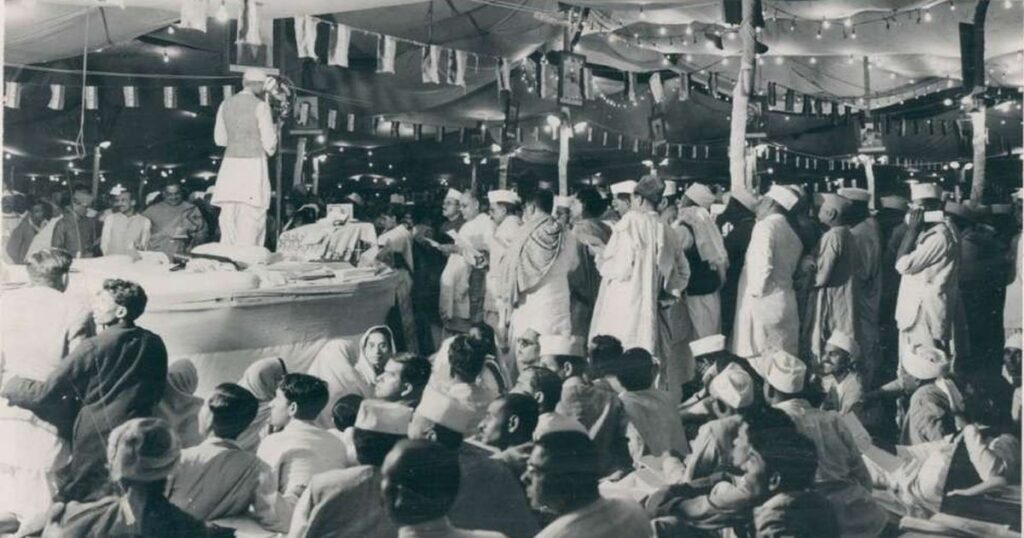
Pledge for Purna Swaraj, Jawaharlal Nehru
Comrades— for four and forty years this National Congress has laboured for the freedom of India. During this period it has somewhat slowly, but surely, awakened national consciousness from its long stupor and built up the national movement. If, today we are gathered here at a crisis of our destiny, conscious of our strength as well as of our weakness, and looking with hope and apprehension to the future, it is well that we give first thought to those who have gone before us and who spent out their lives with little hope of reward, so that those that followed them may have the joy of achievement. Many of the giants of old are not with us and we of a later day, standing on an eminence of their creation, may often decry their efforts. That is the way of the world. But none of you can forget them or the great work they did in laying the foundations of a free India. And none of us can ever forget that glorious band of men and women who, without tacking the consequences, have laid down their young lives or spent their bright youth in suffering and torment in utter protest against a foreign domination.
Many of their names even are not known to us. They laboured and suffered in silence without any expectation of public applause, and by their heart’s blood they nursed the tender plant of India’s freedom. While many of us temporized and compromised, they stood up and proclaimed a people’s right to freedom and declared to the world that India, even in her degradation, had the spark of life in her, because she refused to submit to tyranny and serfdom. Brick by brick has our national movement been built up, and often on the prostrate bodies of her martyred sons has India advanced. The giants of old may not be with us, but the courage of old is with us still and India can yet produce martyrs like Jatin Das and Wizaya. This is the glorious heritage that we have inherited and you wish to put me in charge of it. I know well that I occupy this honoured place by chance more than by your deliberate design. Your desire was to choose another — one who towers above all others in this present day world of ours — and there could have been no wiser choice. But fate and he conspired together and thrust me against your will and mine into this terrible seat of responsibility. Should I express my gratitude to you for having placed me in this dilemma? But I am grateful indeed for your confidence in one who strangely lacks it himself.
Brick by brick has our national movement been built up, and often on the prostrate bodies of her martyred sons has India advanced. The giants of old may not be with us, but the courage of old is with us still and India can yet produce martyrs like Jatin Das and Wizaya. This is the glorious heritage that we have inherited and you wish to put me in charge of it.
You will discuss many vital national problems that face us today and your decisions may change the course of Indian history. But you are not the only people that are faced with problems. The whole world today is one vast question-mark and every country and every people is in the melting pot. The age of faith, with the comfort and stability it brings, is past and there is questioning about everything, however permanent or sacred it might have appeared to our forefathers. Everywhere, there is doubt and restlessness and the foundations of the state and society are in process of transformation. Old established ideas of liberty, justice, property, and even the family are being attacked and the outcome hangs in the balance. We appear to be in a dissolving period of history when the world is in labour and out of her travail will give birth to a new order.
The future lies with America and Asia. Owing to false and incomplete history many of us have been led to think that Europe has always dominated over the rest of the world, and Asia has always let the legions of the West thunder past and plunged in thought again. We have forgotten that for millennia the legions of Asia overran Europe and modern Europe itself largely consists of the descendants of these invaders from Asia. We have forgotten that it was India that finally broke the military power of Alexander.
No one can say what the future will bring, but we may assert with some confidence that Asia and even India, will play a determining part in future world policy. The brief day of European domination is already approaching its end. Europe has ceased to be the centre of activity and interest. The future lies with America and Asia. Owing to false and incomplete history many of us have been led to think that Europe has always dominated over the rest of the world, and Asia has always let the legions of the West thunder past and plunged in thought again. We have forgotten that for millennia the legions of Asia overran Europe and modern Europe itself largely consists of the descendants of these invaders from Asia. We have forgotten that it was India that finally broke the military power of Alexander.
Thought has undoubtedly been the glory of Asia and specially of India, but in the field of action the record of Asia has been equally great. But none of us desires that the legions of Asia or Europe should overrun the continents again. We have all had enough of them.
India today is a part of a world movement. Not only China, Turkey, Persia, and Egypt but also Russia and the countries of the West are taking part in this movement, and India cannot isolate herself from it. We have our own problems — difficult and intricate — and we cannot run away from them and take shelter in the wider problems that affect the world. But if we ignore the world, we do so at our peril. Civilization today, such as it is, is not the creation or monopoly of one people or nation. It is a composite fabric to which all countries have contributed and then have adapted to suit their particular needs. And if India has a message to give to the world as I hope she has, she has also to receive and learn much from the messages of other peoples.
Few things in history are more amazing than the wonderful stability of the social structure in India, which withstood the impact of numerous alien influences and thousands of years of change and conflict. It withstood them because it always sought to absorb them and tolerate them. Its aim was not to exterminate, but to establish an equilibrium between different cultures. Aryans and non-Aryans settled down together recognizing each other’s right to their culture, and outsiders who came, like the Parsis, found a welcome and a place in the social order. With the coming of the Muslims, the equilibrium was disturbed, but India sought to restore it, and largely succeeded. Unhappily for us before we could adjust our differences, the political structure broke down, the British came and we fell.
When everything is changing it is well to remember the long course of Indian history. Few things in history are more amazing than the wonderful stability of the social structure in India, which withstood the impact of numerous alien influences and thousands of years of change and conflict. It withstood them because it always sought to absorb them and tolerate them. Its aim was not to exterminate, but to establish an equilibrium between different cultures. Aryans and non-Aryans settled down together recognizing each other’s right to their culture, and outsiders who came, like the Parsis, found a welcome and a place in the social order. With the coming of the Muslims, the equilibrium was disturbed, but India sought to restore it, and largely succeeded. Unhappily for us before we could adjust our differences, the political structure broke down, the British came and we fell.
Great as was the success of India in evolving a stable society, she failed and in a vital particular, and because she failed in this, she fell and remains fallen. No solution was found for the problem of equality. India deliberately ignored this and built up her social structure on inequality, and we have the tragic consequences of this policy in the millions of our people who till yesterday were suppressed and had little opportunity for growth.
And yet when Europe fought her wars of religion and Christians massacred each other in the name of their saviour, India was tolerant, although alas, there is little of this toleration today. Having attained some measure of religious liberty, Europe sought after political liberty, and political and legal equality. Having attained these also, she finds that they mean very little without economic liberty and equality. And so today politics have ceased to have much meaning and the most vital question is that of social and economic equality.
India also will have to find a solution to this problem and until she does so, her political and social structure cannot have stability. That solution need not necessarily follow the example of any other country. It must, if it has to endure, be based on the genius of her people and be an outcome of her thought and culture. And when it is found, the unhappy differences between various communities, which trouble us today and keep back our freedom, will automatically disappear.
What shall we gain for ourselves or for our community, if all of us are slaves in a slave country? And what can we lose if once we remove the shackles from India and can breathe the air of freedom again? Do we want outsiders who are not of us and who have kept us in bondage, to be the protectors of our little rights and privileges, when they deny us the very right to freedom? No majority can crush a determined minority and no minority can be protected by a little addition to its seats in a legislature. Let us remember that in the world today, almost everywhere a very small minority holds wealth and power and dominates over the great majority.
Indeed, the real differences have already largely gone, but fear of each other and distrust and suspicion remain and sow seeds of discord. The problem is how to remove fear and suspicion and, being intangible, they are hard to get at. An earnest attempt was made to do so last year by the All Parties’ Committee and much progress was made towards the goal. But we must admit with sorrow that success has not wholly crowned its efforts. Many of our Muslim and Sikh friends have strenuously opposed the solutions suggested and passions have been roused over mathematical figures and percentages. Logic and cold reasons are poor weapons to fight fear and distrust. Only faith and generosity can overcome them. I can only hope that the leaders of various communities will have this faith and generosity in ample measure. What shall we gain for ourselves or for our community, if all of us are slaves in a slave country? And what can we lose if once we remove the shackles from India and can breathe the air of freedom again? Do we want outsiders who are not of us and who have kept us in bondage, to be the protectors of our little rights and privileges, when they deny us the very right to freedom? No majority can crush a determined minority and no minority can be protected by a little addition to its seats in a legislature. Let us remember that in the world today, almost everywhere a very small minority holds wealth and power and dominates over the great majority.
I have no love for bigotry and dogmatism in religion and I am glad that they are weakening. Nor do I love communalism in any shape or form. I find it difficult to appreciate why political or economic rights should depend on the membership of a religious group or community. I can fully understand the right to freedom in a religion and the right to one’s culture, and in India specially, which has always acknowledged and granted these rights, it should be no difficult matter to ensure their continuance We have only to find out some way whereby we may root out the fear and distrust that darken our horizon today. The politics of a subject race are largely based on fear and hatred, and we have been too long under subjection to get rid of them easily.
The politics of a subject race are largely based on fear and hatred, and we have been too long under subjection to get rid of them easily.
I was born a Hindu but I do not know how far I am justified in calling myself one or in speaking on behalf of Hindus. But birth still counts in this country and by right of birth I shall venture to submit to the leaders of the Hindus that it should be their privilege to take the lead in generosity. Generosity is not only good morals, but is often good politics and sound expediency. And it is inconceivable to me that in a free India, the Hindus can ever be powerless. So far as I am concerned, I would gladly ask our Muslim and Sikh friends to take what they will without protest and argument from me. I know that the time is coming soon when these labels and appellations will have little meaning and when our struggle will be on an economic basis. Meanwhile, it matters little what our mutual arrangements are, provided only that we do not build up barriers which will come in the way of our future progress.
The time has indeed already come when the All Parties’ Report has to be put aside and we march forward unfettered to our goal. You will remember that the resolution of the last Congress fixed a year of grace for the adoption of the All-Parties scheme. That year is nearly over and the natural issue of that decision is for this Congress to declare in favour of independence and devise sanctions to achieve it.
Recently, there has been a seeming offer of peace. The Viceroy has stated on behalf of the British Government that the leaders of Indian opinion will be invited to confer with the government on the subject of India’s future Constitution. The Viceroy meant well and his language was the language of peace. But even a Viceroy’s goodwill and courteous phrases are poor substitutes for the hard facts that confront us. We have sufficient experience of the devious ways of British diplomacy to beware of it. The offer which the British Government made was vague and there was no commitment or promise of performance. Only by the greatest stretch of imagination could it be interpreted as a possible response to the Calcutta resolution. Many leaders of various political parties met together soon after and considered it. They gave it the most favourable interpretation, for they desired peace and were willing to go half-way to meet it. But in courteous language they made it clear what the vital conditions for its acceptance were.
Many of us who believed in independence and were convinced that the offer was only a device to lead us astray and create division in our ranks, suffered bitter anguish and were torn with doubt. Were we justified in precipitating a terrible national struggle with all its inevitable consequences of suffering for many, when there was even an outside chance of honourable peace? With much searching of heart we signed that manifesto and I know not today if we did right or wrong. Later came the explanations and amplifications in the British Parliament and elsewhere and all doubt, if doubt there was, was removed as to the true significance of the offer. Even so your Working Committee chose to keep open the door of negotiation and left it to this Congress to take the final decision.
During the last few days there has been another discussion of this subject in the British House of Commons and the Secretary of State for India has endeavoured to point out that successive governments have tried to prove, not only by words but by deeds also, the sincerity of their faith in regard to India. We must recognize Mr Wedgwood Benn’s desire to do something for India and his anxiety to secure the goodwill of the Indian people. But his speech and other speeches made in Parliament carry us no further. ‘Dominion Status in action’, to which he has drawn attention has been a snare for us and has certainly not reduced the exploitation of India.
The burdens on the Indian masses are even greater today, because of this ‘Dominion Status in action’ and the so-called constitutional reforms of ten years ago. High Commissioners in London and representatives of the League of Nations, and the purchase of stores, and Indian Governors and high officials are no parts of our demand. We want to put an end to the exploitation of India’s poor and to get the reality of power and not merely the livery of office. Mr Wedgwood Benn has given us a record of the achievements of the past decade. He could have added to it by referring to Martial Law in the Punjab and the Jallianwala Bagh shooting and the repression and exploitation that have gone on continually during this period of ‘Dominion Status in action.’ He has given us some insight into what more of Dominion Status may mean for us. It will mean the shadow of authority to a handful of Indians and more repression and exploitation of the masses.
What will this Congress do? The conditions for cooperation remain unfulfilled. Can we cooperate so long as there is no guarantee that real freedom will come to us? Can we cooperate when our comrades lie in prison and repression continues? Can we cooperate until we are assured that real peace is sought after and not merely a tactical advantage over us? Peace cannot come at the point of the bayonet, and if we are to continue to be dominated over by an alien people, let us at least be no consenting parties to it.
What will this Congress do? The conditions for cooperation remain unfulfilled. Can we cooperate so long as there is no guarantee that real freedom will come to us? Can we cooperate when our comrades lie in prison and repression continues? Can we cooperate until we are assured that real peace is sought after and not merely a tactical advantage over us? Peace cannot come at the point of the bayonet, and if we are to continue to be dominated over by an alien people, let us at least be no consenting parties to it.
If the Calcutta resolution holds, we have but one goal today, that of independence. Independence is not a happy word in the world today; for it means exclusiveness and isolation. Civilization has had enough of narrow nationalism and gropes towards a wider cooperation and inter-dependence. And if we use the word ‘independence’, we do so in no sense hostile to the larger ideal. Independence for us means complete freedom from British domination and British imperialism. Having attained our freedom, I have no doubt that India will welcome all attempts at world-cooperation and federation, and will even agree to give up part of her own independence to a larger group of which she is an equal member.
Independence is not a happy word in the world today; for it means exclusiveness and isolation. Civilization has had enough of narrow nationalism and gropes towards a wider cooperation and inter-dependence. And if we use the word ‘independence’, we do so in no sense hostile to the larger ideal. Independence for us means complete freedom from British domination and British imperialism. Having attained our freedom, I have no doubt that India will welcome all attempts at world-cooperation and federation, and will even agree to give up part of her own independence to a larger group of which she is an equal member.
The British Empire today is not such a group and cannot be so long as it dominates over millions of people and holds large areas of the world’s surface despite the will of their inhabitants. It cannot be a true commonwealth so long as imperialism is its basis and the exploitation of other races its chief means of sustenance. The British Empire today is indeed gradually undergoing a process of political dissolution. It is in a state of unstable equilibrium. The Union of South Africa is not a happy member of the family, nor is the Irish Free State, a willing one. Egypt drifts away. India could never be an equal member of the Commonwealth unless imperialism and all it implies is discarded. So long as this is not done, India’s position in the empire must be one of subservience and her exploitation will continue.
There is talk of world-peace and pacts have been signed by the nations of the world. But despite pacts, armaments grow and beautiful language is the only homage that is paid to the goddess of peace. Peace can only come when the causes of war are removed. So long as there is the domination of one country over another, or the exploitation of one class by another, there will always be attempts to subvert the existing order and no stable equilibrium can endure. Out of imperialism and capitalism peace can never come. And it is because the British Empire stands for these and bases itself on the exploitation of the masses that we can find no willing place in it. No gain that may come to us is worth anything unless it helps in removing the grievous burdens on our masses. The weight of a great empire is heavy to carry and long our people have endured it. Their backs are bent down and their spirit has almost broken. How will they share in the Commonwealth partnership if the burden of exploitation continues? Many of the problems we have to face are the problems of vested interests mostly created or encouraged by the British Government. The interests of the Rulers of Indian States, of British officials and British capital and Indian capital and of the owners of big zamindaris are ever thrust before us, and they clamour for protection. The unhappy millions who really need protection are almost voiceless and have few advocates.
We have had much controversy about independence and Dominion Status and we have quarrelled about words. But the real thing is the conquest of power by whatever name it may be called. I do not think that any form of Dominion Status applicable to India will give us real power. A test of this power would be the entire withdrawal of the alien army of occupation and economic control. Let us, therefore, concentrate on these and the rest will follow easily.
We stand therefore today, for the fullest freedom of India. This Congress has not acknowledged and will not acknowledge the right of the British Parliament to dictate to us in any way. To it we make no appeal. But we do appeal to the Parliament and the conscience of the world, and to them we shall declare, I hope, that India submits no longer to any foreign domination. Today or tomorrow, we may not be strong enough to assert our will. We are very conscious of our weakness, and there is no boasting in us or pride of strength. But let no one, least of all England, mistake or underrate the meaning or strength of our resolve. Solemnly, with full knowledge of consequences, I hope, we shall take it and there will be no turning back. A great nation cannot be thwarted for long when once its mind is clear and resolved. If today we fail and tomorrow brings no success, the day after will follow and bring achievement.
We stand therefore today, for the fullest freedom of India. This Congress has not acknowledged and will not acknowledge the right of the British Parliament to dictate to us in any way. To it we make no appeal. But we do appeal to the Parliament and the conscience of the world, and to them we shall declare, I hope, that India submits no longer to any foreign domination. Today or tomorrow, we may not be strong enough to assert our will. We are very conscious of our weakness, and there is no boasting in us or pride of strength. But let no one, least of all England, mistake or underrate the meaning or strength of our resolve. Solemnly, with full knowledge of consequences, I hope, we shall take it and there will be no turning back. A great nation cannot be thwarted for long when once its mind is clear and resolved. If today we fail and tomorrow brings no success, the day after will follow and bring achievement.
We are weary of strife and hunger for peace and opportunity to work constructively for our country. Do we enjoy the breaking up of our homes and the sight of our brave young men going to prison or facing the halter? Does the worker like going on strike to lose even his miserable pittance and starve? He does so by sheer compulsion when there is no other way for him. And we who take this perilous path of national strife do so because there is no other way to an honourable peace. But we long for peace, and the hand of fellowship will always be stretched out to all who may care to grasp it. But behind the hand will be a body which will not bend to injustice and a mind that will not surrender on any vital point.
With the struggle before us, the time for determining our future Constitution is not yet. For two years or more we have drawn up constitutions and finally the All-Parties’ Committee put a crown to these efforts by drawing up a scheme of its own which the Congress adopted for a year. The labour that went to the making of this scheme was not wasted and India has profited by it. But the year is past and we have to face new circumstances which require action rather than constitution-making. Yet we cannot ignore the problems that beset us and that will make or mar our struggle and our future constitution. We have to aim at social adjustment and equilibrium and to overcome the forces of disruption that have been the bane of India.
I must frankly confess that I am a socialist and a republican and am no believer in kings and princes, or in the order which produces the modern kings of industry, who have greater power over the lives and fortunes of men than even kings of old, and whose methods are as predatory as those of the old feudal aristocracy. I recognize, however, that it may not be possible for a body constituted as in this National Congress and in the present circumstances of the country to adopt a full socialistic programme. But we must realize that the philosophy of socialism has gradually permeated the entire structure of society the world over and almost the only points in dispute are the pace and methods of advance to its full realization. India will have to go that way too if she seeks to end her poverty and inequality, though she may evolve her own methods and may adapt the ideal to the genuine of her race.
We have three major problems, the minorities, the Indian states, and labour and peasantry. I have dealt already with the question of minorities. I shall only repeat that we must give the fullest assurance by our words and our deeds that their culture and traditions will be safe.
The Indian states cannot live apart from the rest of India and their rulers must, unless they accept their inevitable limitations, go the way of others who thought like them. And the only people who have a right to determine the future of the states must be the people of these states, including the rulers. This Congress which claims self-determination cannot deny it to the people of the states. Meanwhile, the Congress is perfectly willing to confer with such rulers as are prepared to do so and to devise means whereby the transition may not be too sudden. But in no event can the people of the states be ignored.
Our third major problem is the biggest of all. For India means the peasantry and labour and to the extent that we raise them and satisfy their wants will we succeed in our task. And the measure of the strength of our national movement will be the measure of their adherence to it. We can only gain them to our side by our espousing their cause which is really the country’s cause. The Congress has often expressed its goodwill towards them; but beyond that it has not gone. The Congress, it is said, must hold the balance fairly between capital and labour and zamindar and tenant.
But the balance has been and is terribly weighed on one side, and to maintain the status quo is to maintain injustice and exploitation. The only way to right it is to do away with the domination of any one class over another. The All-India Congress Committee accepted this ideal of social and economic change in a resolution it passed some months ago in Bombay. I hope the Congress will also set its seal on it and will further draw up a programme of such changes as can be immediately put in operation.
In this programme perhaps the Congress as a whole cannot go very far today. But it must keep the ultimate ideal in view and work for it. The question is not one merely of wages and charity doled out by an employer or landlord. Paternalism in industry or in the land is but a form of charity with all its sting and its utter incapacity to root out the evil. The new theory of trusteeship, which some advocate, is equally barren. For trusteeship means that the power for good or evil remains with the self-appointed trustee and he may exercise it as he will. The sole trusteeship that can be fair is the trusteeship of the nation and not of one individual or a group. Many Englishmen honestly consider themselves the trustees for India, and yet to what a condition they have reduced our country.
We must decide for whose benefit industry must be run and the land produce food. Today the abundance that the land produces is not for the peasant or the labourer who works on it; and industry’s chief function is supposed to be to produce millionaires. However golden the harvest and heavy the dividends, the mud-huts and hovels and nakedness of our people testify to the glory of the British Empire and of our present social system.
Our economic programme must therefore be based on a human outlook and must not sacrifice man to money. If an industry cannot be run without starving its workers, then the industry must be closed down. If the workers on the land have not enough to eat then the intermediaries who deprive them of their full share must go. The least that every worker in the field or factory is entitled to is a minimum wage which will enable him to live in moderate comfort, and human hours of labour which do not break his strength and spirit.
Our economic programme must therefore be based on a human outlook and must not sacrifice man to money. If an industry cannot be run without starving its workers, then the industry must be closed down. If the workers on the land have not enough to eat then the intermediaries who deprive them of their full share must go. The least that every worker in the field or factory is entitled to is a minimum wage which will enable him to live in moderate comfort, and human hours of labour which do not break his strength and spirit. The All-Parties’ Committee accepted the principle and included it in their recommendations. I hope the Congress will also do so and will in addition be prepared to accept its natural consequences. Further that, it will adopt the well known demands of labour for a better life, and will give every assistance to organize itself and prepare itself for the day when it can control industry on a cooperative basis.
But industrial labour is only a small part of India, although it is rapidly becoming a force that cannot be ignored. It is the peasantry that cry loudly and piteously for relief and our programme must deal with their present condition. Real relief can only come by a great change in the land-laws and the basis of the present system of land tenure. We have among us many big landowners and we welcome them. But they must realize that the ownership of large estates by individuals, which is the outcome of a state resembling the old feudalism of Europe, is a rapidly disappearing phenomenon all over the world. Even in countries which are the strongholds of capitalism, the large estates are being split up and given to the peasantry who work on them. In India also we have large areas where the system of peasant proprietorship prevails and we shall have to extend this all over the country. I hope that in doing so, we may have the cooperation of some, atleast of the big landowners.
It is not possible for this Congress at its annual session to draw up any detailed economic programme. It can only lay down some general principles and call upon the All India Congress Committee to fill in the details in cooperation with the representatives of the Trade Union Congress and other organizations which are vitally interested in this matter. Indeed, I hope that the cooperation between this Congress and the Trade Union Congress will grow and the two organizations will fight side by side in future struggles.
All these are pious hopes till we gain power, and the real problem therefore before us is the conquest of power. We shall not do so by subtle reasoning or argument or lawyers’ quibbles, but by the forging of sanction to enforce the nation’s will. To that end, this Congress must address itself.
The past year has been one of preparation for us and we have made every effort to reorganize and strengthen the Congress Organization. The results have been considerable and our organization is in a better state today than at any time since the reaction which followed the non-cooperation movement. But our weaknesses are many and are apparent enough. Mutual strife, even within Congress Committees, is unhappily too common and election squabbles drain all our strength and energy. How can we fight a great fight if we cannot get over this ancient weakness of ours and rise above our petty selves? I earnestly hope that with a strong programme of action before the country, our perspective will improve and we will not tolerate this barren and demoralizing strife.
What can this programme be? Our choice is limited, not by our own constitution, which we can change at our will but by facts and circumstances. Article one of our constitution lays down that our methods must be legitimate and peaceful. Legitimate I hope they will always be, for we must not sully the great cause for which we stand, by any deed that will bring dishonour to it and that we may ourselves regret later. Peaceful I should like them to be, for the methods of peace are more desirable and more enduring than those of violence. Violence too often brings reaction and demoralization in its train, and in our country especially it may lead to disruption. It is perfectly true that organized violence rules the world today and it may be that we could profit by its use. But we have not the material or the training for organized violence and individual or sporadic violence is a confession of despair. The great majority of us, I take it, judge the issue not on moral but on practical grounds, and if we reject the way of violence it is because it promises no substantial results.
Any great movement for liberation today must necessarily be a mass movement and mass movement must essentially be peaceful, except in times of organized revolt. Whether we have the non-cooperation of a decade ago or the modern industrial weapon of the general strike, the basis is peaceful organization and peaceful action. And if the principal movement is a peaceful one, contemporaneous attempts at sporadic violence can only distract attention and weaken it.
Any great movement for liberation today must necessarily be a mass movement and mass movement must essentially be peaceful, except in times of organized revolt. Whether we have the non-cooperation of a decade ago or the modern industrial weapon of the general strike, the basis is peaceful organization and peaceful action. And if the principal movement is a peaceful one, contemporaneous attempts at sporadic violence can only distract attention and weaken it. It is not possible to carry on at one and the same time the two movements, side by side. We have to choose and strictly to abide by our choice. What the choice of this Congress is likely to be I have no doubt. It can only choose a peaceful mass movement.
Should we repeat the programme and tactics of the non-cooperation movement? Not necessarily, but the basic idea must remain. Programmes and tactics must be made to fit in with circumstances and it is neither easy nor desirable for this Congress at this stage to determine them in detail. That should be the work of its executive, the All-India Congress Committee. But the principles have to be fixed.
The old programme was one of the three boycotts—Councils, law courts and schools—leading up to refusal of service in the army and non-payment of taxes. When the national struggle is at its height, I fail to see how it will be possible for any person engaged in it to continue in the courts or the schools. But still I think that it will be unwise to declare a boycott of the courts and schools at this stage.
The boycott of the Legislative Councils has led to much heated debate in the past and this Congress itself has been rent in twain over it. We need not revive that controversy, for the circumstances today are entirely different. I feel that the step the Congress took some years ago to permit Congressmen to enter the Councils was an inevitable step and I am not prepared to say that some good has not resulted from it. But we have exhausted that good and there is no middle course left today between boycott and noncooperation. All of us know the demoralization that these sham legislatures have brought in our ranks and how many of our good men, their committees and commissions lured away. Our workers are limited in number and we can have no mass movement unless they concentrate on it and turn their backs to the palatial Council Chambers of our Legislatures. And if we declare for independence, how can we enter the Councils, and carry on our humdrum and profitless activities there? No programme or policy can be laid down for ever, nor can this Congress bind the country or even itself to pursue one line of action indefinitely. But today I would respectfully urge the Congress that the only policy in regard to the Council is a complete boycott of them. The All-India Congress Committee recommended this course in July last and the time has come to give effect to it.
This boycott will only be a means to an end. It will release energy and divert attention to the real struggle which must take the shape of the nonpayment of taxes, where possible, with the cooperation of the labour movement, general strikes. But nonpayment of taxes must be well organized in specific areas, and for this purpose the Congress should authorize the All India Congress Committee to take the necessary action, wherever and whenever it considers desirable.
I have not so far referred to the constructive programme of the Congress. This should certainly continue but the experience of the last few years shows us that by itself it does not carry us swiftly enough. It prepares the ground for future action and ten years’ silent work is bearing fruit today. In particular we shall, I hope, continue our boycott of foreign cloth and the boycott of British goods.
Our programme must, therefore, be one of political and economic boycott. It is not possible for us, so long as we are actually independent, and even then completely, to boycott another country wholly or to sever all connection with it. But our endeavour must be to reduce all points of contact with the British Government and to rely on ourselves. We must also make it clear that India will not accept responsibility for all the debts that England has piled on her. The Gaya Congress repudiated liability to pay those debts and we must repeat this repudiation and stand by it. Such of India’s public debt as has been used for purposes beneficial to India we are prepared to admit and pay back. But we wholly deny all liability to pay back the vast sums which have been raised, so that India may be held in subjection and her burdens may be increased. In particular the poverty stricken people of India cannot agree to shoulder the burden of the wars fought by England to extend her domain and consolidate her position in India. Nor can they accept the many concessions lavishly bestowed without any proper compensation on foreign exploiters.
I have not referred so far to the Indians overseas and I do not propose to say much about them. This is not from any want of fellow-feeling with our brethren in East Africa or South Africa or Fiji or elsewhere, who are bravely struggling against great odds. But their fate will be decided in the plains of India and the struggle we are launching into is as much for them as for ourselves.
For this struggle, we want efficient machinery. Our Congress Constitution and organization have become too archaic and slow moving, and are illsuited to times of crisis. The times of great demonstrations are past. We want quiet and irresistible action now, and this can only be brought about by the strictest discipline in our ranks. Our resolutions must be passed in order to be acted upon. The Congress will gain in strength, however small its actual membership may become, if it acts in a disciplined way. Small, determined minorities have changed the fate of nations. Mobs and crowds can do little. Freedom itself involves restraint and discipline and each one of us will have to subordinate himself to the larger good.
The Congress represents no small minority in the country and though many may be too weak to join it or to work for it, they look to it with hope and longing to bring them deliverance. Ever since the Calcutta resolution, the country has waited with anxious expectation for this great day when this Congress meets. None of us can say what and when we can achieve. We cannot command success. But success often comes to those who dare and act; it seldom goes to the timid who are ever afraid of the consequences. We play for high stakes; and if we seek to achieve great things it can only be through great dangers. Whether we succeed soon or late, none but ourselves can stop us from high endeavour and from writing a noble page in our country’s long and splendid history.
Success often comes to those who dare and act; it seldom goes to the timid who are ever afraid of the consequences. We play for high stakes; and if we seek to achieve great things it can only be through great dangers. Whether we succeed soon or late, none but ourselves can stop us from high endeavour and from writing a noble page in our country’s long and splendid history.
We have conspiracy cases going on in various parts of the country. They are ever with us. But the time has gone for secret conspiracy. We have now an open conspiracy to free this country from foreign rule, and you comrades, and all our countrymen and countrywomen are invited to join it. But the rewards that are in store for you are suffering and prison and you will have done your little bit for India, the ancient, but ever young, and have helped a little in the liberation of humanity from its present bondage.
The death of God (Madras, December 1933)
MALAYAPURAM SINGARAVELU
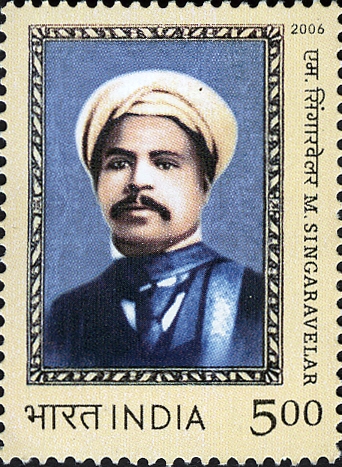
M. Singaravelu
I think this conference is the first of its kind in the whole of India. One can boldly assert that this conference will bring good to the country and people. Unfortunately some people, out of ignorance, have ridiculed this conference. As usual, theists indulge in slander. The bureaucrats try to indulge in repression under some pretext or other. But this is not a new occurrence. In the past all progressive movements have been persecuted and ridiculed.
Not content with ridiculing the progressive movement, this mad and ignorant world has always tried to stop the spread of scientific knowledge. Ingersol, the famous atheist of America was not taken note of during his lifetime and was even ridiculed. But now his birth anniversary is being celebrated in America. Bradlaugh, the British atheist, was put behind bars during his lifetime. Now what happens in Britain? Commemoration meetings in honour of Bradlaugh are being held in Britain. I am sure in due course still bigger conferences of this kind would be held in this country. It is quite likely that people may forget the names of the atheists but their ideas will remain forever in their minds.
Atheism is an ancient doctrine which originated and developed side by side with theism. When the concept of God was ushered in, alongside came the doctrine of ‘no-God’. Till the time man developed his faculty to speak, he was not aware of any God. Some of the primitive tribesmen have confessed their ignorance about God, and can aptly be called ‘primitive atheists’.
Atheism is an ancient doctrine which originated and developed side by side with theism. When the concept of God was ushered in, alongside came the doctrine of ‘no-God’. Till the time man developed his faculty to speak, he was not aware of any God. Some of the primitive tribesmen have confessed their ignorance about God, and can aptly be called ‘primitive atheists’.
In this connection it is really interesting to note the history of religion. Every religion had proclaimed that people belonging to the other religions were atheists. A non-Hindu is an atheist to a Hindu. To a Muslim any non- Muslim is an atheist. Likewise, many more people were termed as atheists. Hence, I would like to say one should really be proud to be an atheist as he is not only non-religious but also does not accept a belief in God.
As the word (God) was man’s own creation, he began to build houses (temples) for his God. Just as he respected his superiors and elders, he began to respect his God. What he did to entertain himself like music, dance, rituals, feasts, he offered to his God. Thus, God advanced as man advanced.
Some shrewd men of those days found an easy way to life and this paved the way for replacing the word with an idol. To make man live perpetually in fear of God, these men did everything possible and thus priesthood came into existence. These priests lived and thrived on the fear and ignorance of men. Thus around the single word ‘God’ the entire edifice of religious and philosophical system of rituals and prayers were built. In the course of history, many beliefs have become obsolete and I am sure that this belief, namely, theism too would become obsolete in due course.
The first and most dangerous affect of theism is that it saps the initiative of man. Ignorance take deep roots in him. People are prevented from acquiring scientific knowledge. Theism is not only a negative evil; it is positively harmful to the people.
The first and most dangerous affect of theism is that it saps the initiative of man. Ignorance take deep roots in him. People are prevented from acquiring scientific knowledge. Theism is not only a negative evil; it is positively harmful to the people. Whatever may be the future of God, we can never forget and forgive his past. It is only atheism that instills confidence in man. It is only atheism which proclaims that social and economic inequalities are only manmade. Hence, it goads man to seek out ways of removing obstacles in the way of progress. It is only atheism that proclaims to man: ‘Man, be a man. You alone can convert this earth into a paradise.’
Comrades, crucial battles are ahead of us. We cannot rest on our laurels now. Though it is put on defence, theism has not been completely routed. Power, money, propaganda, still side with theism. Further, a majority of people, out of ignorance still remain with theism and we have to redeem them. Theism alongwith power and money may over and again attempt to bar the growth and development of human initiative. A concrete example is the development of Hitlerism and fascism. Religious beliefs and other ageold obscurantist ideas are thrust down the throats of people. This is a dangerous trend. Take again some of the views expressed by Gandhiji. He is openly advocating theism. Further, he is crying to make some readjustment in the caste system, to reform it. In our view these are against the principles of atheism. The so-called removal of untouchability is a mere device to strengthen religious beliefs among the people. The untouchables numbering about six crores are economically poor and downtrodden. What they need is neither God or religion. They need a meal a day and an opportunity to earn a decent living.
Comrades, crucial battles are ahead of us. We cannot rest on our laurels now. Though it is put on defence, theism has not been completely routed. Power, money, propaganda, still side with theism. Further, a majority of people, out of ignorance still remain with theism and we have to redeem them. Theism alongwith power and money may over and again attempt to bar the growth and development of human initiative.
However, there is another danger ahead. The Hindu Mahasabha, the Sanatanis, Muslim communalists, etc., are still striving hard to capture the legislative assembly so that theism can be enthroned. These are the worst reactionaries in this unfortunate land. Beware comrades, not to lose this opportunity for contesting and capturing every seat in every village and panchayat, in every taluk and district board. Fearlessly expose the sham of casteism and oppression. Dethrone ignorance and theism. Please, enthrone atheism and socialism in its place.
The great Calcutta killings (Calcutta, September 1946)
SYAMA PRASAD MOOKERJEE
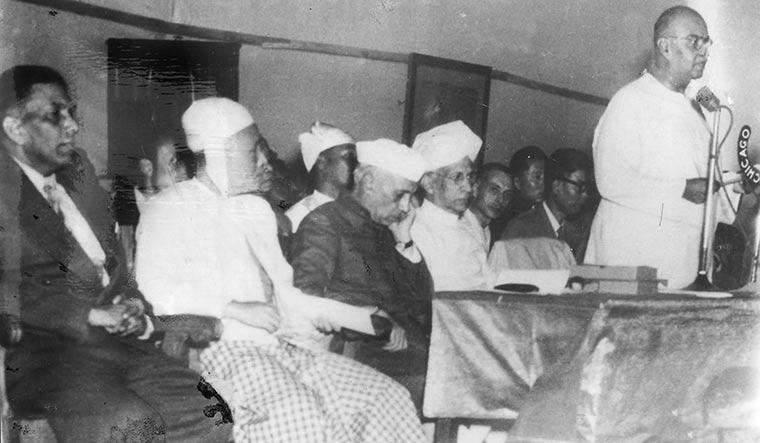
Syama Prasad Mookerjee
Sir, since yesterday we have been discussing the motions of no-confidence under circumstances, which perhaps have no parallel in the deliberations of any Legislature in any part of the civilized world. What happened in Calcutta is without a parallel in modern history. St Bartholomew’s Day of which history records some grim events of murder and butchery pales into insignificance compared to the brutalities that were committed in the streets, lanes and bye-lanes of this first city of British India. We have been discussing, Sir, as to the genesis of these disturbances. Time will not permit me to go through the detailed history and course of events during the last few years.
But let me say this that what has happened is not the result of a sudden explosion, but it is the culmination of an administration, inefficient, corrupt and communal, which has disfigured the life of this great Province. But so far as the immediate cause is concerned, rightly reference has been made by members belonging to the Muslim League and also to the Opposition that we have to look to the resolution that was passed at Bombay at the all-India session of the Council of the Muslim League. Now what happened there? It is said, on behalf of the Muslim League that the Cabinet Mission proved faithless to Muslim interests and thereby created a situation which had no parallel in the history of Anglo-Muslim relationship in this country. What did actually the Cabinet Mission do? The Muslim League, the spoilt and pampered child of the British imperialists for the last thirty years, was disowned for the first time by the British Labour Government…(loud noise from the government benches)…I know it that members when they hear the bitter truth, can hardly repress their feelings. Sir, the fact remains that the old policy of the British Government of no advancement without a Congress-Muslim League agreement was for the first time given up in I946…(loud cries from the government benches)…I have only stated the fact and I do not make any comment on it and still my friends become impatient immediately. Now, the fact remains that the Muslim League was bypassed and the Interim Government has been formed at the Centre. Supposing Mr Jinnah had been asked to form the Interim Government without the Congress, would my friends belonging to the Muslim League have then blamed the government for having betrayed the interests of the Hindu community?
But let me say this that what has happened is not the result of a sudden explosion, but it is the culmination of an administration, inefficient, corrupt and communal, which has disfigured the life of this great Province. But so far as the immediate cause is concerned, rightly reference has been made by members belonging to the Muslim League and also to the Opposition that we have to look to the resolution that was passed at Bombay at the all-India session of the Council of the Muslim League.
Sir, what happened after the Bombay resolution? I have before me a summary of the speeches delivered by distinguished spokesmen on behalf of the Muslim League in every part of India and although it was said that the Direct Action Day itself was not the day for commencing direct action, it was at the same time pointed out that the war had begun, the days of peace and compromise were over and now the jehad … (A member from the Government Benches: Against whom?) War against everyone who did not accept Pakistan. That has been made abundantly clear.
I would ask my friends not to misunderstand me. I am trying to put in brief their point of view as I would ask them also to appreciate our point of view. We are like poles asunder. You say you will plunge the country Pakistan by any means whatsoever. These two points of view are irreconcilable and what I am now telling the House is this that the members speaking on behalf of the Muslim League did not mince matters. Muslim leaders want Civil War. Only a pattern of civil war, according to Mr Jinnah, was witnessed in this very city of Calcutta, but whether civil war will ultimately help Muslims to get Pakistan or not is a matter that remains yet to be seen. It is said that British Imperialists are against the Muslim League. Why talk rot in this way? Who gave you separate electorate and communal award? Who is helping the Sind ministry to remain in power? Is not the Governor a British Governor? Are not the three European members of the Sind Assembly British members of that House? Are they not trying their level best somehow to keep the Muslim League in power and not allow the Congress to go to office although among the Indian members they are in a majority?
Now, Sir, I shall leave this aside. I shall not refer to the detailed speeches which have been delivered by the Muslim League leaders barring one or two illustrative remarks. When Mr Jinnah was confronted at a preconference in Bombay on the 31st July and was asked whether direct action involved violence or non-violence, his cryptic reply was ‘I am not going to discuss ethics’. (The Hon’ble Mr Muhammad Ali: Good.) But Khwajah Nazimuddin was not so good. He came out very bluntly in Bengal and he said that Muslims did not believe in non-violence at all, Muslims knew what direct action meant and there were one hundred and one ways in which this was made clear by responsible League leaders. One said in the Punjab that the zero hour had struck and that the war had begun. All this was followed by a series of articles and statements which appeared in the columns of newspapers— the Morning News, the Star of India, and the Azad. If you read those documents, particularly I would ask my friend Mr Ispahani if he reads those documents, I do not know whether he had learnt Bengali yet, if not, for his benefit a translation can be made of the Bengali article in Azad, he will be able to find out that there was nothing but open and direct incitement to violence. Hatred of Hindus and jehad on the Hindu were declared in highly charged language. That was the background. I am not going to quote the papers, for I have not the time. You have read them and the general Muslim public have acted according to the instructions.
Now, so far as the later events are concerned, what happened on the 16th of August. What were the preparations made? Mr Ispahani says that they were taken unaware. In the Morning News on the 16th there appeared an announcement on behalf of the ‘Pakistan’ Ambulance Corps and there full instructions were given as to how the Ambulance Corps was to act—mind you, Sir, this was done before the troubles started. This ‘Pakistan Ambulance Corps’ was to be utilized in different parts of the city; they were to go out in batches, cars and officers ‘would be available’ and from the 17th morning announcement was to be made every hour as regards the patients who were to be found in the different hospitals of Calcutta. This was announced before any trouble started in Calcutta and Mr Ispahani says there was no preparation. Of course it was sheer bad luck that you allowed this notice, among many kinds of preparations, to be published in the newspapers.
Now, Sir, what happened on the 16th? I shall not refer to the detailed speeches of other members. But I shall certainly hold responsible the Chief Minister of this province who lost his mental balance by saying in Bombay that he was going to declare Bengal to be an independent state. A minister who cannot control his British underling — the Commissioner of Police — is going to make Bengal an independent state! A minister who comes forward and says ‘I am helpless, I could not save the people of the city because the Commissioner of Police would not listen to me’ will declare Bengal an independent state! Now, that was Mr Suhrawardy. He said he was going to carry on a no-rent campaign in this province. He was going to disobey law and order. His speech before the Legislative Council goes to show that he knew fully well that troubles were ahead. If you analyse his speech it will appear that he knew that troubles were brewing and he said he wanted to be as careful as possible.
Now, Sir, what happened on the 16th? I shall not refer to the detailed speeches of other members. But I shall certainly hold responsible the Chief Minister of this province who lost his mental balance by saying in Bombay that he was going to declare Bengal to be an independent state. A minister who cannot control his British underling — the Commissioner of Police — is going to make Bengal an independent state!
I am not raising the question in this debate as to how many Hindus were butchered or how many Muslims were butchered in Bhawanipore, Taltolla, or Watgunge. That is not the issue. The question in issue today is, did government succeed in protecting life and property; not to which community that life and property belonged? Why did government allow so many Muslim lives to be butchered if you look upon Mr Suhrawardy as the great Muslim champion? Why did he allow the entire administration of law and order to collapse in the city? I shall say, Sir, it was a diabolical plan. I say Sir, there was a well-organized plan to make a lightning attack on the city that would take Hindus by surprise, properties were going to be looted and lives were going to be lost. Then Mr Suhrawardy found that he was caught in his own trap when he and others were hit back in their own coin. He could not regain his lost ground and failed to do what his Muslim brethren asked him to do in agony and distress.
I am not raising the question in this debate as to how many Hindus were butchered or how many Muslims were butchered in Bhawanipore, Taltolla, or Watgunge. That is not the issue. The question in issue today is, did government succeed in protecting life and property; not to which community that life and property belonged?
On the 16th, our case is that provocation came from the other side, their case is that provocation came from the Hindu side. That also I am not going to discuss today. Let us leave that for the time being, but let us proceed to the next stage. Mr Suhrawardy said by 12 noon he realized the situation was very bad. Was he not still the Chief Minister of Bengal? What did he do at that time? Why was not the military called out at that time? I have got here a circular issued by the military for the information of its officers and employees in which clear information is given that the military was ready to come out on Friday noon but it was not asked to do so. The civil police failed to protect the life and property as it was expected to do and whenever the military was asked to come out, it came out and it did whatever it could do. But, alas, thousands had been killed meanwhile and crores of rupees looted!
On Friday Mr Suhrawardy knew that trouble had broken out— no matter whether the Hindus were the aggressors or the Muslims were, why did he allow the whole city to be placed at the mercy of goondas, dacoits and murderers? Why did he allow the meeting at all to be held at the maidan in the afternoon over which he presided? He stands charged with the deliberate offence of having played havoc with the life and property of the citizens of this great city, no matter whether they were Hindus or they were Muslims. On Friday night he gave a message to the Associated Press that the condition in the city had improved. Does he remember it? It seems that the Associated Press went to the next day’s newspapers. I would ask my friends to forget for the time being that they belong to the Muslim League. If Mr Suhrawardy says ‘no’, here, Sir, is the statement of Mr H.S. Suhrawardy, Chief Minister of Bengal— I suppose that is the gentleman sitting over there (laughter) interviewed by the Associated Press of India to the effect that the situation was improving. (Uproar) (A voice from the government benches: What paper?) Every newspaper. (Renewed uproar.) I would ask my friends that they must observe the rules of the game and fairplay even in a discussion like this. Why don’t you ask the Chief Minister to explain this?
Mr Speaker, you can certainly look into it. I am not afraid of the truth. Yes, Sir, (Sent the paper to Mr Speaker.) I can produce it to anyone who wants to see it. Now, Sir, Section l44 is supposed to have been promulgated on Friday but was never enforced.
Then on Saturday the curfew order was inaugurated, but neither Section 144 nor the curfew order was enforced. How is it that in spite of Section 144 and the curfew order people were moving about committing loot and plunder, and murder even? How is it that within a stone’s throw, Mr Ispahani has pointed out, from Lalbazar police station shops were looted, people were murdered and all sorts of offences were committed without the Police moving an inch?
Of course, you are responsible. If you have got the guts to say that you are not responsible, let us know that. Now, Sir, that was on the 16th and 17th August. Later on what happened? Mr Suhrawardy knows it very well that he was telling a double-faced lie. On the 23rd he issued a broadcast message, a message of peace for the people of Bengal and within half an hour of that he sent out a special message for the foreign press through foreign correspondents and the things which are mentioned in that document are entirely different from the broadcast message which he issued to the people of Bengal. Can he deny that? (A voice from the Government Benches: That is obvious). He has stated that the Hindus have started the riot. (The Hon’ble Mr H.S. Suhrawardy: Certainly.) He has said that it is the Hindus, who are to blame. He said it was the British Government which was to blame. Say ‘certainly’ (laughter) and lastly, he said that he cannot yet tell what will happen in future if the Interim Government continues in office. Now, Sir, if that is the remark which he wanted to make on that day what was the use of his appealing to the people of Bengal for peace and harmony and saying ‘I have kept an open mind and I would like Hindus and Muslims to work together’. Can history give us a better example of a double-faced minister?
Sir, there are two matters here which may be mentioned. Mr Suhrawardy said that he could not control the Commissioner of Police because he was not under his orders. I shall give you, Sir, one instance out of many which are available from which it will appear how Mr Suhrawardy interfered with the administration of the police offices in a manner which was unworthy of any Home Minister of any Province. In the Park Street police station about seven goondas were taken by a European Inspector on Sunday evening. Sir, that is the remark which Mr Suhrawardy has made namely, ‘I am sorry you are a goonda then.’ I do not know who they are. These persons were found with looted properties. If Mr Suhrawardy says that Muslim gentlemen took away looted properties I shall bow down my head to him, but if he says that I am a goonda then I too can say that he is the best goonda that is available not only in this Province but throughout the world.
(Uproar)
Sir, I shall withdraw it as soon as Mr Suhrawardy withdraws what he has said about me. (Cries of ‘withdraw, withdraw’ from the government benches). Let him withdraw first, what he first has said about me.
Now I withdraw too. Now, Sir, let me pass on. So far as the Park Street incident is concerned, the important point is that goondas or gentlemen whoever they were, seven Muslims who were found in possession of looted properties were brought into Park Street police-station by a European Inspector. Within ten minutes Mr H.S. Suhrawardy appears on the scene. He gets these persons released. It is on record. Let him deny that. (The Hon’ble Mr H.S. Suhrawardy: Yes). (Cries of ‘shame, shame’ from Congress benches.) Then he comes back (Mr H.S. Suhrawardy: Oh! no). This is the way, Sir, in which Mr Suhrawardy has behaved. This is one instance I am giving. (Cries of ‘you have cooked it’ from government benches). No, I have not cooked it. He himself has admitted it.
Then, Sir, the Muslim League party wanted 500 gallons of petrol from the Bengal Government. That was not granted, but petrol coupons were issued in the name of individual ministers — general coupons — 100 gallons being issued in the name of the Chief Minister. Evidence is available that these coupons were used by lorries moving in the streets of Calcutta on those fateful days. That is how arrangements were being made under the very nose of the Home Department over which Mr Suhrawardy was presiding. Can Mr Suhrawardy deny that he himself went to Howrah accompanied by some Muslim League leaders, met local officers in authority there, and had chastized and taken them to task because Muslims were not protected there? Can he deny that? Did Mr Suhrawardy give in any place or at any time the same sort of protection to the suffering Hindus. (The Hon’ble Mr H.S. Suhrawardy: Certainly). Now, Sir, it is quite clear that at least I have said some home truths which have made my friends opposite angry and impatient.
Sir, they, these ministers, have taken oath of allegiance to the British Crown and they are responsible for the life and property of all alike. My friend, Mr Muhammad Ali, admitted this very candidly when the adjournment motion was not allowed to be taken up in this House. Mr Suhrawardy is a great Muslim League leader and he owes his allegiance to the Muslim League. The Muslim League rightly or wrongly ordered that if something does not happen to its liking, it was going to resort to direct action. One cannot serve two masters. Sir, it has been proved beyond doubt that Mr Suhrawardy and his other Ministers are unable to administer the affairs of this Province impartially and efficiently. They have failed hopelessly and wretchedly and on that ground alone they are not fit to occupy offices for a single moment (Interruptions).
Sir, it is not in Calcutta alone that atrocities were committed in a large scale, but we find that troubles are spreading now in the whole of Bengal. The information which is coming from different parts of Bengal would make one shudder to think as to what will happen to this province. These gentlemen, the ministers over there, should not remain in charge of the affairs of this province even a day longer.
Sir, it is not in Calcutta alone that atrocities were committed in a large scale, but we find that troubles are spreading now in the whole of Bengal. The information which is coming from different parts of Bengal would make one shudder to think as to what will happen to this province. These gentlemen, the ministers over there, should not remain in charge of the affairs of this province even a day longer. (Interruptions) If they remain in office the future would be darker still. (Interruptions) The Council of Action of the All-India Muslim League has ordered that preparations have to be made for giving effect to the Direct Action Program. Already Muslim League leaders from the Punjab, North-West Frontier Province and also Sind have openly declared that they are ready with their scheme which can be put into operation at 24 hours’ notice. Am I to believe that the Muslim League in Bengal which is a stronghold of Mr Jinnah’s Muslim League is not similarly prepared to give effect to the order of the Muslim League when the occasion demands it? In other words, my charge is that the present Ministry is utilizing the government machinery for the purpose of launching upon a Direct Action scheme. (The Hon’ble Mr H.S. Suhrawardy: No). Mr Suhrawardy is playing a dual role and this dual role of Mr Suhrawardy and those who are supporting him has got to be exposed and brought to an end in the interest of peace and tranquility.
Why does not the Chief Minister get the reports of the Commissioner of Police through the Criminal Investigation Department as regards some meetings which took place in the city? Mr Suhrawardy has perhaps got the proceedings confidentially of the meetings which were held in the cities where League leaders were invited to attend for the purpose of preparing scheme for direct action. If he has got any report about what happened on the 16th, he will find that even when the Calcutta maidan meeting was being held, over which Mr Suhrawardy presided, disturbances had broken out in several places. Now what happened in that meeting? Was there then any CID officer present taking down notes? Where are those notes?
Sir, it was an astonishing fact that a gun shop within 2 minutes walk from the Government House had been looted. Not a single policeman turned up in the streets to control the situation in any part of the city. It will not help merely making the Commissioner of Police a scapegoat, it is suggested that the city had been ablaze in so many places that the Commissioner of Police did not know how to act. But surely Mr Suhrawardy knew how and when to act. (The Hon’ble Mr H.S. Suhrawardy: Yes, yes). Mr Suhrawardy says that he knew and we also know when he acted. If he had failed without making any effort, then he is charged with criminal negligence and if he failed in spite of efforts, he is certainly inefficient and worthless, and he should not be kept in that position any longer. There is no place for him in the ministry.
Sir, there is one point which I would like to say with regard to the Britishers in this House. My friends are remaining neutral. I cannot understand this attitude at all. In a situation such as this they must decide if the ministry was right or the ministry was wrong. If the ministry was right, support them and if the ministry was wrong, you should say so boldly and not remain neutral merely sitting on the fence which shows signs of abject impotence (Laughter).
If a single Britisher, man or woman or a child, had been strong enough they would have thrown this ministry out of office without hesitation, but because no Britisher was touched so they can take an impartial and neutral view! Are they so sure they will be left untouched next time? There is no question of partiality or impartiality here. The present administration has failed and it must come to an end. Anyone who remains neutral is an aider and abettor.
My friend, Mr Gladding, said that luckily none of his people were injured. It is true, Sir, but that is a statement which makes me extremely sorry. If a single Britisher, man or woman or a child, had been strong enough they would have thrown this ministry out of office without hesitation, but because no Britisher was touched so they can take an impartial and neutral view! Are they so sure they will be left untouched next time? There is no question of partiality or impartiality here. The present administration has failed and it must come to an end. Anyone who remains neutral is an aider and abettor.
I would ask my friends, what about the future. Pakistan will not be accepted under any circumstance. (Mr Fazlur Rahman: It will be accepted). Mr Suhrawardy said in Bombay after the 16th of August, ‘When a nation fights against another nation I cannot guarantee civilized conduct.’ If you are a nation fighting against us, another nation, if that is the attitude of my friends on the other side, then they cannot remain in office any longer. (Cries of ‘Hear, hear’ from the Opposition Benches). Mr Suhrawardy must realize that his office is meant for the good of the entire people of Bengal irrespective of caste, creed and religion, and not for his own so-called ‘nation’. I would say, Sir, that is an abject treachery to the great responsibility that rests on Mr Suhrawardy, as Premier (Interruptions).
Apparently I said many good things, otherwise my friends would not be so jubilant. The Chief Minister was dancing the other day on the polished floor of a Delhi Hotel and I have made my friends dance on the floor of this House. I will now say a few words in connection with the future. What about the future? My friends, the Muslims, say that they constitute 25 percent of India’s population, and that is so big a minority that they will never agree to live under 75 percent Hindu domination. Now if that is their honest and genuine point of view how can they expect that 45 percent of the Hindu population of this Province will ever agree to live under a Constitution where that particular nation represented by Muslims, constituting only of 55 percent, will alone dominate? (The Hon’ble Mr Shamsuddin Ahmed: That is how the trouble began). I will not today enter into controversies as regards the real population of Bengal. I claim it that if a proper census is taken even today the Hindus will not be in a minority but that question cannot be settled by argument from one side or the other. My Muslim friends who are well-organized under the banner of the Muslim League have got to realize that if Bengal is to be ruled peacefully it can be done only with the willing cooperation of the two communities. I am not talking of all India politics for the time being. (The Hon’ble Mr Shamsuddin Ahmed: Why not? What has happened to all India politics?) I would make this appeal to my friends that a choice has to be made by the Hindus and the Muslims together. There is no way out of it because what we witnessed in Calcutta was not an ordinary communal riot: its motive was political, but things may become even far more serious and drastic in the days, weeks and months to come. Now, if the Muslims of Bengal under the leadership of the Muslim League feel that they can exterminate the Hindus, that is a fantastic idea which can never be given effect to: three and a half crores can never exterminate three crores nor can three crores exterminate three and a half crores.
Sir, if it is said that civil war will break out throughout India, will that help anyone, will that help, in particular, 25 percent. Muslims throughout India as against 75 percent of Hindus and other non-Muslims. It is not a question of threat at all; it is a question of facing a stern reality. Either we have to fight or we have to come to some settlement. The settlement cannot be reached so long as you say that one community will dominate over the other, but it can only be reached by a plan which will enable the vast majority of Hindus and Muslims to live under circumstances which will give freedom and peace to the common man.
Now, Sir, if it is said that civil war will break out throughout India, will that help anyone, will that help, in particular, 25 percent. Muslims throughout India as against 75 percent of Hindus and other non-Muslims. It is not a question of threat at all; it is a question of facing a stern reality. Either we have to fight or we have to come to some settlement. The settlement cannot be reached so long as you say that one community will dominate over the other, but it can only be reached by a plan which will enable the vast majority of Hindus and Muslims to live under circumstances which will give freedom and peace to the common man. After all, forget not who suffered most during the Calcutta Killing. It as mainly the poorer people, both amongst the Hindus and the Muslims. Ninety percent of them were poor and innocent and if the leaders lose their heads and go creating a situation which they cannot ultimately control, the time will soon come when the common man will turn round and crush the leaders instead of being themselves crushed. It is therefore vitally necessary that this false and foolish idea of Pakistan or Islamic rule has to be banished for ever from your head. In Bengal we have got to live together. We say as a condition precedent this ministry must go. Only then can we create a state of affairs which will make it possible to build a future Bengal which will be for the good of all, irrespective of any caste, creed, or community.
Opening address to the Constituent Assembly of Pakistan (Karachi, August 1947)
MUHAMMAD ALI JINNAH
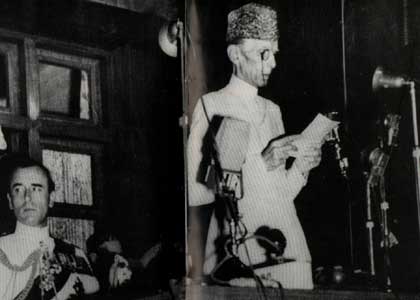
Jinnah speaking at the Constituent Assembly of Pakistan on 14 August 1947
Mr President, Ladies and Gentlemen!
I cordially thank you, with the utmost sincerity, for the honor you have conferred upon me — the greatest honour that is possible for this Sovereign Assembly to confer — by electing me as your first President. I also thank those leaders who have spoken in appreciation of my services and their personal references to me. I sincerely hope that with your support and your cooperation we shall make this Constituent Assembly an example to the world. The Constituent Assembly has got two main functions to perform. The first is the very onerous and responsible task of framing our future Constitution of Pakistan and the second is functioning as a full and complete sovereign body as the Federal Legislature of Pakistan. We have to do the best we can in adopting a provisional constitution for the Federal Legislature of Pakistan. You know really that not only we ourselves are wondering but, I think, the whole world is wondering at this unprecedented cyclonic revolution which has brought about the plan of creating and establishing two independent sovereign dominions in this subcontinent. As it is, it has been unprecedented; there is no parallel in the history of the world. This mighty subcontinent with all kinds of inhabitants has been brought under a plan which is titanic, unknown, unparalleled. And what is very important with regard to it is that we have achieved it peacefully and by means of an evolution of the greatest possible character.
Dealing with our first function in this Assembly, I cannot make any well considered pronouncement at this moment, but I shall say a few things as they occur to me. The first and the foremost thing that I would like to emphasize is this: Remember that you are now a sovereign legislative body and you have got all the powers. It, therefore, places on you the gravest responsibility as to how you should take your decisions. The first observation that I would like to make is this: You will no doubt agree with me that the first duty of a government is to maintain law and order, so that the life, property and religious beliefs of its subjects are fully protected by the state.
Remember that you are now a sovereign legislative body and you have got all the powers. It, therefore, places on you the gravest responsibility as to how you should take your decisions. The first observation that I would like to make is this: You will no doubt agree with me that the first duty of a government is to maintain law and order, so that the life, property and religious beliefs of its subjects are fully protected by the state.
The second thing that occurs to me is this: One of the biggest curses from which India is suffering — I do not say that other countries are free from it, but, I think, our condition is much worse — is bribery and corruption. That really is a poison. We must put that down with an iron hand and I hope that you will take adequate measures as soon as it is possible for this Assembly to do so.
Black-marketing is another curse. Well, I know that black-marketeers are frequently caught and punished. Judicial sentences are passed or sometimes fines only are imposed. Now you have to tackle this monster which today is a colossal crime against society, in our distressed conditions, when we constantly face shortage of food and other essential commodities of life. A citizen who does black-marketing commits, I think, a greater crime than the biggest and most grievous of crimes. These black-marketeers are really knowing, intelligent and ordinarily responsible people, and when they indulge in black-marketing, I think they ought to be very severely punished, because they undermine the entire system of control and regulation of foodstuffs and essential commodities, and cause wholesale starvation and want and even death.
The next thing that strikes me is this: Here again it is a legacy which has been passed on to us. Alongwith many other things, good and bad, has arrived this great evil—the evil of nepotism and jobbery. This evil must be crushed relentlessly. I want to make it quite clear that I shall never tolerate any kind of jobbery, nepotism or any influence directly or indirectly brought to bear upon me. Whenever I will find that such a practice is in vogue or is continuing anywhere, low or high, I shall certainly not countenance it.
Now, if we want to make this great State of Pakistan happy and prosperous we should wholly and solely concentrate on the well-being of the people, and especially of the masses and the poor. If you will work in cooperation, forgetting the past, burying the hatchet, you are bound to succeed. If you change your past and work together in a spirit that every one of you, no matter to what community he belongs, no matter what relations he had with you in the past, no matter what is his colour, caste or creed, is first, second and last a citizen of this state with equal rights, privileges and obligations, there will be no end to the progress you will make.
I know there are people who do not quite agree with the division of India and the partition of the Punjab and Bengal. Much has been said against it, but now that it has been accepted, it is the duty of every one of us to loyally abide by it and honourably act according to the agreement which is now final and binding on all. But you must remember, as I have said, that this mighty revolution that has taken place is unprecedented. One can quite understand the feeling that exists between the two communities wherever one community is in majority and the other is in minority. But the question is, whether it was possible or practicable to act otherwise than what has been done. A division had to take place. On both sides, in Hindustan and Pakistan, there are sections of people who may not agree with it, who may not like it, but in my judgment there was no other solution and I am sure future history will record its verdict in favour of it. And what is more, it will be proved by actual experience as we go on that it was the only solution of India’s constitutional problem. Any idea of a united India could never have worked and in my judgment it would have led us to terrific disaster. May be that view is correct; may be it is not; that remains to be seen. All the same, in this division it was impossible to avoid the question of minorities being in one dominion or the other. Now that was unavoidable. There is no other solution. Now what shall we do? Now, if we want to make this great State of Pakistan happy and prosperous we should wholly and solely concentrate on the well-being of the people, and especially of the masses and the poor. If you will work in cooperation, forgetting the past, burying the hatchet, you are bound to succeed. If you change your past and work together in a spirit that every one of you, no matter to what community he belongs, no matter what relations he had with you in the past, no matter what is his colour, caste or creed, is first, second and last a citizen of this state with equal rights, privileges and obligations, there will be no end to the progress you will make.
I cannot emphasize it too much. We should begin to work in that spirit and in course of time all these angularities of the majority and minority communities, the Hindu community and the Muslim community—because even as regards Muslims you have Pathans, Punjabis, Shias, Sunnis, and so on and among the Hindus you have Brahmins, Vaishnavas, Khatris, also Bengalees, Madrasis, and so on—will vanish. Indeed if you ask me this has been the biggest hindrance in the way of India to attain the freedom and independence and but for this we would have been free peoples long, long ago. No power can hold another nation, and specially a nation of 400 million souls in subjection; nobody could have conquered you, and even if it had happened, nobody could have continued its hold on you for any length of time but for this. Therefore, we must learn a lesson from this. You are free; you are free to go to your temples, you are free to go to your mosques or to any other place of worship in this State of Pakistan. You may belong to any religion or caste or creed—that has nothing to do with the business of the state. As you know, history shows that in England, conditions some time ago, were much worse than those prevailing in India today. The Roman Catholics and the Protestants persecuted each other. Even now there are some states in existence where there are discriminations made and bars imposed against a particular class. Thank God, we are not starting in those days. We are starting in the days when there is no discrimination, no distinction between one community and another, no discrimination between one caste or creed and another. We are starting with this fundamental principle that we are all citizens and equal citizens of one state. The people of England in course of time had to face the realities of the situation and had to discharge the responsibilities and burdens placed upon them by the government of their country and they went through that fire step by step. Today, you might say with justice that Roman Catholics and Protestants do not exist; what exists now is that every man is a citizen, an equal citizen of Great Britain and they are all members of the Nation.
Now, I think we should keep that in front of us as our ideal and you will find that in course of time Hindus would cease to be Hindus and Muslims would cease to be Muslims, not in the religious sense, because that is the personal faith of each individual, but in the political sense as citizens of the state. Well, gentlemen, I do not wish to take up any more of your time and thank you again for the honour you have done to me. I shall always be guided by the principles of justice and fairplay without any, as is put in the political language, prejudice or ill-will, in other words, partiality or favouritism. My guiding principle will be justice and complete impartiality, and I am sure that with your support and cooperation, I can look forward to Pakistan becoming one of the greatest nations of the world.
Now, I think we should keep that in front of us as our ideal and you will find that in course of time Hindus would cease to be Hindus and Muslims would cease to be Muslims, not in the religious sense, because that is the personal faith of each individual, but in the political sense as citizens of the state.
I have received a message from the United States of America addressed to me. It reads:
I have the honour to communicate to you, in Your Excellency’s capacity as President of the Constituent Assembly of Pakistan, the following message which I have just received from the Secretary of State of the United States:
On the occasion of the first meeting of the Constituent Assembly for Pakistan, I extend to you and to the members of the Assembly, the best wishes of the Government and the people of the United States for the successful conclusion of the great work you are about to undertake.
Jama Masjid Speech (Delhi, 1947)
MAULANA ABUL KALAM AZAD
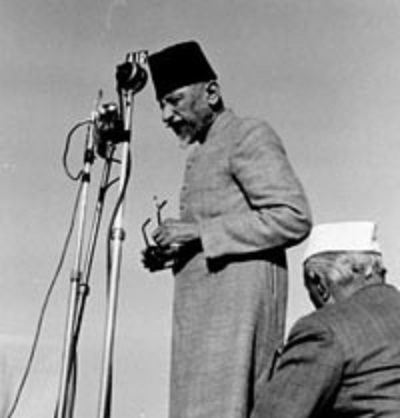
Maulana Abul Kalam Azad
My brethren,
You know what has brought me here today. This congregation at Shahjahan’s historic mosque is not an unfamiliar sight for me. Here, I have addressed you on several previous occasions. Since then we have seen many ups and downs. At that time, instead of weariness, your faces reflected serenity, and your hearts, instead of misgivings, exuded confidence. The uneasiness on your faces and the desolation in your hearts that I see today, reminds me of the events of the past few years.
Do you remember? I hailed you, you cut off my tongue; I picked my pen, you severed my hand; I wanted to move forward, you broke off my legs; I tried to run, and you injured my back. When the bitter political games of the last seven years were at their peak, I tried to wake you up at every danger signal. You not only ignored my call but revived all the past traditions of neglect and denial. As a result the same perils surround you today, whose onset had previously diverted you from the righteous path.
Today, mine is no more than an inert existence or a forlorn cry; I am an orphan in my own motherland. This does not mean that I feel trapped in the original choice that had made for myself, nor do I feel that there is no room left for my ashiana (nest). What it means is that my cloak is weary of your impudent grabbing hands. My sensitivities are injured, my heart is heavy. Think for one moment. What course did you adopt? Where have you reached, and where do you stand now? Haven’t your senses become torpid? Aren’t you living in a constant state of fear? This fear is your own creation, a fruit of your own deeds.
Today, mine is no more than an inert existence or a forlorn cry; I am an orphan in my own motherland. This does not mean that I feel trapped in the original choice that had made for myself, nor do I feel that there is no room left for my ashiana (nest). What it means is that my cloak is weary of your impudent grabbing hands. My sensitivities are injured, my heart is heavy.
It was not long ago when I warned you that the two-nation theory was death-knell to a meaningful, dignified life; forsake it. I told you that the pillars upon which you were leaning would inevitably crumble. To all this you turned a deaf ear. You did not realize that, my brothers! I have always attempted to keep politics apart from personalities, thus avoiding those thorny valleys. That is why some of my messages are often couched in allusions. The Partition of India was a fundamental mistake. The manner in which religious differences were incited, inevitably, led to the devastation that we have seen with our own eyes. Unfortunately, we are still seeing it at some places.
There is no use recounting the events of the past seven years, nor will it serve any good. Yet, it must be stated that the debacle of Indian Muslims is the result of the colossal blunders committed by the Muslim League’s misguided leadership. These consequences however, were no surprise to me; I had anticipated them from the very start.
Now that Indian politics has taken a new direction, there is no place in it for the Muslim League. Now the question is whether or not we are capable of constructive thinking. For this, I have invited the Muslim leaders of India to Delhi, during the second week of November.
The gloom cast upon your lives is momentary; I assure you we can be beaten by none save our own selves! I have always said, and I repeat it again today; eschew your indecisiveness, your mistrust, and stop your misdeeds. This unique triple-edged weapon is more lethal than the two-edged iron sword which inflicts fatal wounds, which I have heard of.
The gloom cast upon your lives is momentary; I assure you we can be beaten by none save our own selves! I have always said, and I repeat it again today; eschew your indecisiveness, your mistrust, and stop your misdeeds. This unique triple-edged weapon is more lethal than the two-edged iron sword which inflicts fatal wounds, which I have heard of.
Just think about the life of escapism that you have opted for, in the sacred name of Hejrat. Get into the habit of exercising your own brains, and strengthening your own hearts. If you do so, only then will you realize how immature your decisions were.
Where are you going and why? Raise your eyes. The minarets of Jama Masjid want to ask you a question. Where have you lost the glorious pages from your chronicles? Wasn’t it only yesterday that on the banks of the Jamuna, your caravans performed wazu? Today, you are afraid of living here. Remember, Delhi has been nurtured with your blood. Brothers, create a basic change in yourselves. Today, your fear is misplaced as your jubilation was yesterday.
The words coward and frenzy cannot be spoken in the same breath as the word Muslim. A true Muslim can be swayed neither by avarice nor apprehension. Don’t get scared because a few faces have disappeared. The only reason they had herded you in a single fold was to facilitate their own flight. Today, if they have jerked their hand free from yours, what does it matter? Make sure that they have not run away with your hearts. If your hearts are still in the right place, make them the abode of God. Some thirteen hundred years ago, through an Arab ummi, God proclaimed, “Those who place their faith in God and are firm in their belief, no fear for them nor any sorrow.” Winds blow in and blow out: tempests may gather but all this is short-lived. The period of trial is about to end. Change yourselves as if you had never been in such an abject condition.
I am not used to altercation. Faced with your general indifference, however, I will repeat that the third force has departed, and along with it, its trappings of vanity. Whatever had to happen has happened. If your hearts have still not changed and your minds still have reservations, it is a different matter. But, if you want a change, then take your cue from history, and cast yourself in the new mould. Having completed a revolutionary phase, there still remains a few blank pages in the history of India. You can make ourselves worthy of filling those pages, provided you are willing.
Brothers, keep up with the changes. Don’t say, “We are not ready for the change.” Get ready. Stars may have plummeted down but the sun is still shining. Borrow a few of its rays and sprinkle them in the dark caverns of your lives.
Brothers, keep up with the changes. Don’t say, “We are not ready for the change.” Get ready. Stars may have plummeted down but the sun is still shining. Borrow a few of its rays and sprinkle them in the dark caverns of your lives.
I do not ask you to seek certificates from the new echelons of power. I do not want you to lead a life of sycophancy as you did during the foreign rule. I want you to remind you that these bright etchings which you see all around you, are relics of processions of your forefathers. Do not forget them. Do not forsake them. Live like their worthy inheritors, and, rest assured, that if you do not wish to flee from this scene, nobody can make you flee. Come, today let us pledge that this country is ours, we belong to it and any fundamental decisions about its destiny will remain incomplete without our consent.
Today, you fear the earth’s tremors; once you were virtually the earthquake itself. Today, you fear the darkness; once your existence was the epicenter of radiance. Clouds have poured dirty waters and you have hitched up your trousers. Those were none but your forefathers who not only plunged headlong into the seas, but trampled the mountains, laughed at the bolts of lightning, turned away the tornadoes, challenged the tempests and made them alter their course. It is a sure sign of a dying faith that those who had once grabbed the collars of emperors, are today clutching their own throats. They have become oblivious of the existence of God as if they had never believed in Him.
Brothers, I do not have a new prescription for you. I have the same old prescription that was revealed to the greatest benefactor of mankind, the prescription of the Holy Quran: “Do not fear and do not grieve. If you possess true faith, you will gain the upper hand.”
Brothers, I do not have a new prescription for you. I have the same old prescription that was revealed to the greatest benefactor of mankind, the prescription of the Holy Quran: “Do not fear and do not grieve. If you possess true faith, you will gain the upper hand.”
The congregation is now at an end. What I had to say, I have said, briefly. Let me say once again, keep a grip on your senses. Learn to create your own surroundings, your own world. This is not a commodity that I can buy for you from the market-place. This can be bought only from the market-place of the heart, provided you can pay for it with the currency of good deeds.
May God’s grace be on you!
ARCHIVE
Tagore’s reflections on non-cooperation and cooperation
(The Calcutta journal Modern Review of May 1921 carried letters inspired by Gandhi’s Non-cooperation movement; addressed to C.F. Andrews, London, 1928)
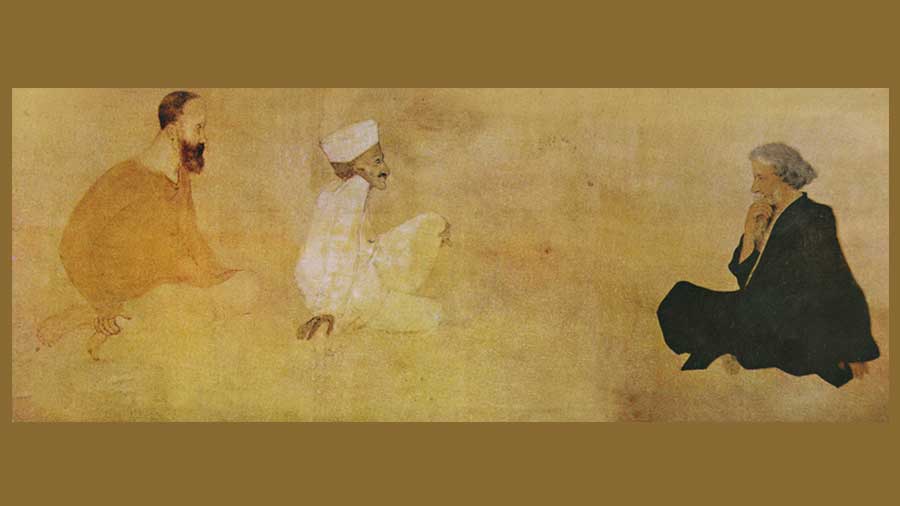
Source: National Library
I
Your last letter gives wonderful news about our students in Calcutta. I hope that this spirit of sacrifice and willingness to suffer will grow in strength; for to achieve this is an end in itself. This is the true freedom! Nothing is of higher value be it national wealth, or independence, than disinterested faith in ideals, in the moral greatness of man. The West has its unshakable faith in material strength and prosperity; and therefore however loud grows the cry for peace and disarmament, its ferocity grows louder, gnashing its teeth and lashing its tail in impatience. It is like a fish, hurt by the pressure of the flood, planning to fly in the air. Certainly the idea is brilliant, but it is not possible for a fish to realize.
We, in India, shall have to show to the world, what is that truth, which not only makes disarmament possible but turns it into strength. That moral force is a higher power than brute force, will be proved by the people who are unarmed. Life, in its higher development, has thrown off its tremendous burden of armour and a prodigious quantity of flesh; till man has become the conqueror of the brute world. The day is sure to come, when the frail man of spirit, completely unhampered by arms and air fleets, and dreadnoughts will prove that the meek is to inherit the earth. It is in the fitness of things, that Mahatma Gandhi, frail in body and devoid of all material resources, should call up the immense power of the meek, that has been lying waiting in the heart of the destitute and insulted humanity of India. The destiny of India has chosen for its ally, Narayan, and not the Narayansena—the power of soul and not that of muscle. And she is to raise the history of man, from the muddy level of physical conflict to the higher moral altitude. What is swaraj! It is maya, it is like a mist, that will vanish leaving no stain on the radiance of the Eternal. However we may delude ourselves with the phrases learnt from the West, Swaraj is not our objective.
The destiny of India has chosen for its ally, Narayan, and not the Narayansena—the power of soul and not that of muscle. And she is to raise the history of man, from the muddy level of physical conflict to the higher moral altitude. What is swaraj! It is maya, it is like a mist, that will vanish leaving no stain on the radiance of the Eternal. However we may delude ourselves with the phrases learnt from the West, Swaraj is not our objective.
Our fight is a spiritual fight, it is for Man. We are to emancipate Man from the meshes that he himself has woven round him,—these organisations of National Egoism. The butterfly will have to be persuaded that the freedom of the sky is of higher value than the shelter of the cocoon. If we can defy the strong, the armed, the wealthy, revealing to the world power of the immortal spirit, the whole castle of the Giant Flesh will vanish in the void. And then Man will find his Swaraj. We, the famished, ragged ragamuffins of the East, are to win freedom for all Humanity. We have no word for Nation in our language. When we borrow this word from other people, it never fits us. For we are to make our league with Narayan, and our victory will not give us anything but victory itself; victory for God’s world. I have seen the West; I covet not the unholy feast, in which she revels every moment, growing more and more bloated and red and dangerously delirious. Not for us, is this mad orgy of midnight, with lighted torches, but awakenment in the serene light of morning.
II
Lately I have been receiving more and more news and newspaper cuttings from India, giving rise in my mind to a painful struggle that presages a period of suffering which is waiting for me. I am striving with all my power to tune my mood of mind to be in accord with the great feeling of excitement sweeping across my country. But deep in my being why is there this spirit of resistance maintaining its place in spite of my strong desire to remove it? I fail to find a clear answer and through my gloom of dejection breaks out a smile and a voice saying, “Your place is on the seashore of worlds with children; there is your peace, and I am with you there.”
And this is why lately I have been playing with inventing new metres. These are merest nothings that are content to be borne away by the current of time, dancing in the sun and laughing as they disappear. But while I play the whole creation is amused, for are not flowers and leaves never ending experiments in metre? Is not my God an eternal waster of time? He flings stars and planets in the whirlwind of changes, he floats paper boats of ages, filled with his fancies, on the rushing stream of appearance. When I tease him and beg him to allow me to remain his little follower and accept a few trifles of mine as the cargo of his playboat he smiles and I trot behind him catching the hem of his robe.
But where am I among the crowd, pushed from behind, pressed from all sides? And what is this noise about me? If it is a song, then my own sitar can catch the time and I join in the chorus, for I am a singer. But if it is a shout, then my voice is wrecked and I am lost in bewilderment. I have been trying all these days to find in it a melody, straining my ear, but the idea of non-cooperation with its mighty volume of sound does not sing to me, its congregated menace of negations shouts. And I say to myself, “If you cannot keep step with your countrymen at this great Crisis of their history, never say that you are right and the rest of them wrong; only give up your role as a soldier, go back to your corner as a poet, be ready to accept popular derision and disgrace”.
I have been trying all these days to find in it a melody, straining my ear, but the idea of non-cooperation with its mighty volume of sound does not sing to me, its congregated menace of negations shouts. And I say to myself, “If you cannot keep step with your countrymen at this great Crisis of their history, never say that you are right and the rest of them wrong; only give up your role as a soldier, go back to your corner as a poet, be ready to accept popular derision and disgrace”.
R, in support of the present movement, has often said to me that passion for rejection is a stronger power in the beginning than the acceptance of an ideal. Though I know it to be a fact, I cannot take it as a truth. We must choose our allies once for all, for they stick to us even when we would be glad to be rid of them. If we once claim strength from intoxication, then in the time of reaction our normal strength is bankrupt, and we go back again and again to the demon who lends us resources in a vessel whose bottom it takes away.
Brahma-vidya (the cult of Brahma, the Infinite Being) in India has for its object mukti, emancipation, while Buddhism has nirvana, extinction. It may be argued that both have the same idea in different names. But names represent attitudes of mind, emphasise particular aspects of truth. Mukti draws our attention to the positive, and nirvana to the negative side of truth.
Buddha kept silence all through his teachings about the truth of the Om, the everlasting yes, his implication being that by the negative path of destroying the self we naturally reach that truth. Therefore he emphasised the fact of dukkha (misery) which had to be avoided and the Brahma-vidya emphasised the fact of ananda, joy, which had to be attained. The latter cult also needs for its fulfillment the discipline of self-abnegation, but it holds before its view the idea of Brahma, not only at the end but all through the process of realisation. Therefore, the idea of life’s training was different in the Vedic period from that of the Buddhistic. In the former it was the purification of life’s joy, in the latter it was the eradication of it. The abnormal type of asceticism to which Buddhism gave rise in India revelled in celibacy and mutilation of life in all different forms. But the forest life of the Brahmana was not antagonistic to the social life of man, but harmonious with it. It was like our musical instrument tambura whose duty is to supply the fundamental notes to the music to save it from straying into discordance. It believed in anandam, the music of the soul, and its own simplicity was not to kill it but to guide it.
The idea of non-cooperation is political asceticism. Our students are bringing their offering of sacrifices to what? Not to a fuller education but to non-education. It has at its back a fierce joy of annihilation which at best is asceticism, and at its worst is that orgy of frightfulness in which the human nature, losing faith in the basic reality of normal life, finds a disinterested delight in an unmeaning devastation as has been shown in the late war and on other occasions which came nearer to us. No, in its passive moral form is asceticism and in its active moral form is violence. The desert is as much a form of a himsa (malignance) as is the raging sea in storms, they both are against life.
The idea of non-cooperation is political asceticism. Our students are bringing their offering of sacrifices to what? Not to a fuller education but to non-education. It has at its back a fierce joy of annihilation which at best is asceticism, and at its worst is that orgy of frightfulness in which the human nature, losing faith in the basic reality of normal life, finds a disinterested delight in an unmeaning devastation as has been shown in the late war and on other occasions which came nearer to us. No, in its passive moral form is asceticism and in its active moral form is violence. The desert is as much a form of a himsa (malignance) as is the raging sea in storms, they both are against life.
I remember the day, during the swadeshi movement in Bengal, when a crowd of young students came to see me in the first floor hall of our Vichitra House. They said to me that if I would order them to leave their schools and colleges they would instantly obey. I was emphatic in my refusal to do so, and they went away angry, doubting the sincerity of my love for my motherland. And yet long before this popular ebullition of excitement I myself had given a thousand rupees, when I had not five rupees to call my own, to open a swadeshi store and courted banter and bankruptcy. The reason of my refusing to advise those students to leave their schools was because the anarchy of a mere emptiness never tempts me, even when it is resorted to as a temporary measure. I am frightened of an abstraction which is ready to ignore living reality. These students were no more phantoms to me; their life was a great fact to them and to the All. I could not lightly take upon myself the tremendous responsibility of a mere negative programme for them which would uproot their life from its soil, however thin and poor that soil might be.
The great injury and injustice which had been done to those boys who were tempted away from their career before any real provision was made, could never be made good to them. Of course that is nothing from the point of view of an abstraction which can ignore the infinite value even of the smallest fraction of reality. I wish I were the little creature Jack whose one mission is to kill the giant abstraction which is claiming the sacrifice of individuals all over the world under highly painted masks of delusion.
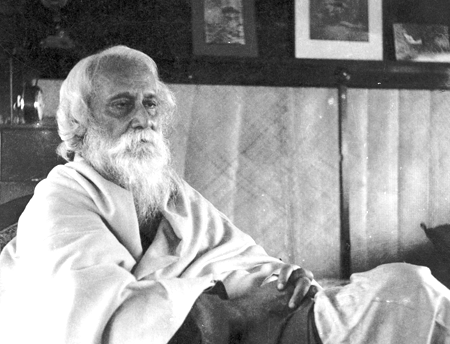
Source: https://www.oldindianphotos.in/2010/04/various-rabindranath-tagore-photographs.html
I say again and again that I am a poet, that I am not a fighter by nature. I would give everything to be one with my surroundings. I love my fellow beings and I prize their love. Yet I have been chosen by destiny to ply my boat there where the current is against me. What irony of fate is this that I should be preaching cooperation of cultures between East and West on this side of the sea just at the moment when the doctrine of non-cooperation is preached on the other side?
You know that I do not believe in the material civilisation of the West just as I do not believe in the physical body to be the highest truth in man. But I still less believe in the destruction of the physical body, and the ignoring of the material necessities of life. What is needed is establishment of harmony between the physical and spiritual nature of man, maintaining of balance between the foundation and superstructure. I believe in the true meeting of the East and the West. Love is the ultimate truth of soul. We should do all we can, not to outrage that truth, to carry its banner against all opposition. The idea of non-cooperation unnecessarily hurts that truth. It is not our heart fire but the fire that burns out our hearth and home.
What is needed is establishment of harmony between the physical and spiritual nature of man, maintaining of balance between the foundation and superstructure. I believe in the true meeting of the East and the West. Love is the ultimate truth of soul. We should do all we can, not to outrage that truth, to carry its banner against all opposition. The idea of non-cooperation unnecessarily hurts that truth. It is not our heart fire but the fire that burns out our hearth and home.
III
Things that are stationary have no responsibility and need no law. For death, even the tombstone is a useless luxury. But for a world, which is an ever-moving multitude advancing towards an idea, all its laws must have one principle of harmony. This is the law of creation.
Man became great when he found out this law for himself, the law of co-operation. It helped him to move together, to utilise the rhythm and impetus of the world march. He at once felt that this moving together was not mechanical, not an external regulation for the sake of some convenience. It was what the metre is in poetry, which is not a mere system of enclosure for keeping ideas from running away in disorder, but for vitalising them, making them indivisible in a unity of creation.
So far this idea of co-operation has developed itself into individual communities within the boundaries of which peace has been maintained and varied wealth of life produced. But outside these boundaries the law of co-operation has not been realised. Consequently the great world of man is suffering from ceaseless discordance. We are beginning to discover that our problem is world-wide and no one people of the earth can work out its salvation by detaching itself from the others. Either we shall be saved together, or drawn together into destruction.
This truth has ever been recognised by all the great personalities of the world. They had in themselves the perfect consciousness of the undivided spirit of man. Their teachings were against tribal exclusiveness, and thus we find that Buddha’s India transcended geographical India and Christ’s religion broke through the bonds of Judaism.
Today, at this critical moment of the world’s history cannot India rise above her limitations and offer the great ideal to the world that will work towards harmony and co-operation between the different peoples of the earth! Men of feeble faith will say that India requires being strong and rich before she can raise her voice for the sake of the whole world. But I refuse to believe it. That the measure of man’s greatness is in his material resources is a gigantic illusion casting its shadow over the present day world, it is an insult to man. It lies in the power of the materially weak to save the world from this illusion and India, in spite of her penury and humiliation, can afford to come to the rescue of humanity.
Today, at this critical moment of the world’s history cannot India rise above her limitations and offer the great ideal to the world that will work towards harmony and co-operation between the different peoples of the earth! Men of feeble faith will say that India requires being strong and rich before she can raise her voice for the sake of the whole world. But I refuse to believe it. That the measure of man’s greatness is in his material resources is a gigantic illusion casting its shadow over the present day world, it is an insult to man. It lies in the power of the materially weak to save the world from this illusion and India, in spite of her penury and humiliation, can afford to come to the rescue of humanity.
The freedom of unrestrained egoism in the individual is licence and not true freedom. For his truth is in that which is universal in him. Individual human races also attain true freedom when they have the freedom of perfect revelation of Man and not that of their aggressive racial egoism. The idea of freedom which prevails in modern civilisation is superficial and materialistic. Our revolution in India will be a true one when its forces will be directed against this crude idea of liberty.
The sunlight of love has the freedom that ripens the wisdom of immortal life, but passions’ fire can only forge fetters for ourselves. The spiritual Man has been struggling for its emergence into perfection, and all true cry of freedom is for this emancipation. Erecting barricades of fierce separateness in the name of national necessity is offering hindrance to it, therefore in the long run building a prison for the nation itself. For the only path of deliverance for nations is in the ideal humanity.
Creation is an endless activity of God’s freedom; it is an end in itself. Freedom is true when it is a revelation of truth. Man’s freedom is for the revelation of the truth of Man which is struggling to express itself. We have not yet fully realised it. But those people who have faith in its greatness, who acknowledge its sovereignty, and have the instinctive urging in their heart to break down obstructions, are paving the way for its coming.
India ever has nourished faith in the truth of spiritual man for whose realisation she has made innumerable experiments, sacrifices and penance, some verging on the grotesque and the abnormal. But the fact is, she has never ceased in her attempt to find it even though at the tremendous cost of material success.
Therefore I feel that the true India is an idea and not a mere geographical fact. I have come into touch with this idea in far away places of Europe and my loyalty was drawn to it in persons who belonged to different countries from mine. India will be victorious when this idea wins victory,—the idea of ‘Purusham mahantam aditya-varnam tamasah parastat’, the Infinite Personality whose light reveals itself through the obstruction of darkness. Our fight is against this darkness, our object is the revealment of the light of this Infinite Personality in ourselves. This Infinite Personality of man is not to be achieved in single individuals, but in one grand harmony of all human races. The darkness of egoism which will have to be destroyed is the egoism of the People. The idea of India is against the intense consciousness of the separateness of one’s own people from others, and which inevitably leads to ceaseless conflicts. Therefore my one prayer is: let India stand for the cooperation of all peoples of the world. The spirit of rejection finds its support in the consciousness of separateness, the spirit of acceptance in the consciousness of unity.
India has ever declared that Unity is Truth, and separateness is maya. This unity is not a zero, it is that which comprehends all and therefore can never be reached through the path of negation. Our present struggle to alienate our heart and mind from those of the West is an attempt at spiritual suicide. If in the spirit of national vain-gloriousness we shout from our house-tops that the West has produced nothing that has an infinite value for man, then we but create a serious cause of doubt about the worth of any product of the Eastern mind. For it is the mind of Man in the East and West which is ever approaching Truth in her different aspects from different angles of vision; and if it can be true that the standpoint of the West has betrayed it into an utter misdirection, then we can never be sure of the standpoint of the East. Let us be rid of all false pride and rejoice at any lamp being lit at any corner of the world, knowing that it is a part of the common illumination of our house.
India has ever declared that Unity is Truth, and separateness is maya. This unity is not a zero, it is that which comprehends all and therefore can never be reached through the path of negation. Our present struggle to alienate our heart and mind from those of the West is an attempt at spiritual suicide. If in the spirit of national vain-gloriousness we shout from our house-tops that the West has produced nothing that has an infinite value for man, then we but create a serious cause of doubt about the worth of any product of the Eastern mind. For it is the mind of Man in the East and West which is ever approaching Truth in her different aspects from different angles of vision; and if it can be true that the standpoint of the West has betrayed it into an utter misdirection, then we can never be sure of the standpoint of the East. Let us be rid of all false pride and rejoice at any lamp being lit at any corner of the world, knowing that it is a part of the common illumination of our house.
The other day I was invited to the house of a distinguished art critic of America who is a great admirer of old Italian art. I questioned him if he knew anything of our Indian pictures and brusquely said that most probably he would “hate them”. I suspected he had seen some of them and hated them. In retaliation I could have said something in the same language about the Western art. But I am proud to say it was not possible for me. For I always try to understand the Western art and never to hate it. Whatever we understand and enjoy in human products instantly becomes ours wherever they might have their origin. I should feel proud of my humanity when I can acknowledge the poets and artists of other countries as mine own. Let me feel with unalloyed gladness that all the great glories of man are mine.
Therefore, it hurts me deeply when the cry of rejection rings loud against the West in my country with the clamour that the Western education can only injure us. It cannot be true. What has caused the mischief is the fact that for a long time we have been out of touch with our own culture and therefore the Western culture has not found its prospective in our life very often found a wrong prospective giving our mental eye a squint. When we have the intellectual capital of our own, the commerce of thought with the outer world becomes natural and fully profitable. But to say that such commerce is inherently wrong, is to encourage the worst form of provincialism, productive of nothing but intellectual indigence. The West has misunderstood the East which is at the root of the disharmony that prevails between them, but will it mend the matter if the East in her turn tries to misunderstand the West? The present age has powerfully been possessed by the West; it has only become possible because to her is given some great mission for man. We from the East have to come to her to learn whatever she has to teach us; for by doing so we hasten the fulfillment of this age. We know that the East also has her lessons to give and she has her own responsibility of not allowing her light to be extinguished, and the time will come when the West will find leisure to realise that she has a home of hers in the East where her food is and her rest.
– Rabindranath Tagore
Gandhi’s reactions to Tagore’s views
(Gandhi’s Young India of 1 June 1921, carried a reply to the Poet’s musings, under the heading ‘English Learning’)
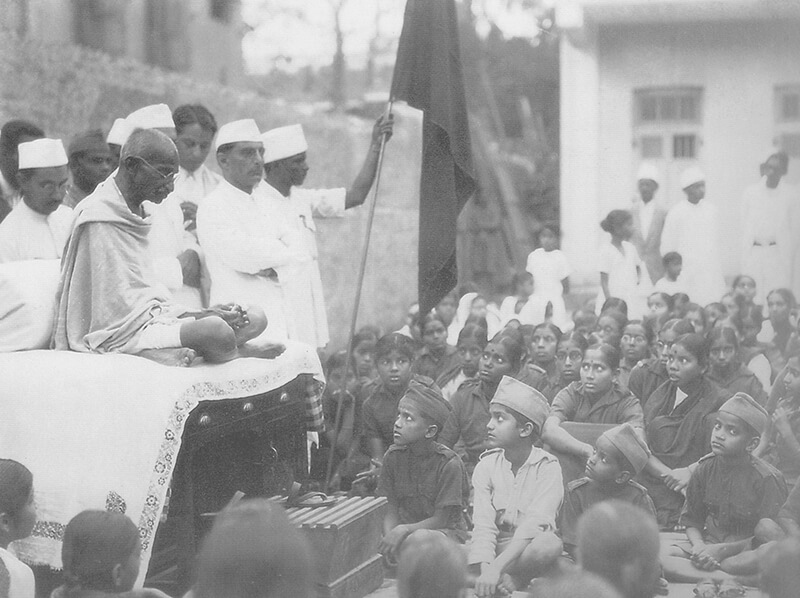
Source: https://gandhi.gov.in/gandhi-photo.html
Elsewhere the reader will see my humble endeavour in reply to Dr. Tagore’s criticism of Non-cooperation. I have since read his letter to the Manager of Santiniketan. I am sorry to observe that the letter is written in anger and in ignorance of facts. The Poet was naturally incensed to find that certain students in London would not give a hearing to Mr. Pearson, one of the truest of Englishmen, and he became equally incensed to learn that I had told our women to stop English studies. The reasons for my advice, the Poet evidently inferred for himself.
How much better it would have been, if he had not imputed the rudeness of the students to Non-cooperation, and had remembered that Non-cooperators worship Andrews, honour Stokes, and gave a most respectful hearing to Messrs. Wedgwood Benn, Spoor and Holford Knight at Nagpur, that Maulana Mahomed Ali accepted the invitation to tea of an English official when he invited him as a friend, that Hakim Ajmalkhan, a staunch Non-cooperator, had the portraits of Lord and Lady Hardinge unveiled in his Tibbia College and had invited his many English friends to witness the ceremony. How much better it would have been, if he had refused to allow the demon doubt to possess him for one moment, as to the real and religious character of the present movement, and had believed that the movement was altering the meaning of old terms, nationalism and patriotism, and extending their scope.
If he, with a poet’s imagination, had seen that I was incapable of wishing to cramp the mind of the Indian women, and I could not object to English learning as such, and recalled the fact that throughout my life I had fought for the fullest liberty for women, he would have been saved the injustice which he has done me, and which, I know, he would never knowingly do to an avowed enemy.
The Poet does not know perhaps that English is today studied because of its commercial and so-called political value. Our boys think, and rightly in the present circumstances, that without English they cannot get Government service. Girls are taught English as a passport to marriage. I know several instances of women wanting to learn English so that they may be able to talk to Englishmen in English. I know husbands who are sorry that their wives cannot talk to them and their friends in English. I know families in which English is being made the mother tongue. Hundreds of youths believe that without a knowledge of English freedom for India is practically impossible. The canker has so eaten into the society that, in many cases, the only meaning of Education is a knowledge of English.
All these are for me signs of our slavery and degradation. It is unbearable to me that the vernaculars should be crushed and starved as they have been. I cannot tolerate the idea of parents writing to their children, or husbands writing to their wives, not in their own vernaculars, but in English. I hope I am as great a believer in free air as the great Poet. I do not want my house to be walled in on all sides and my windows to be stuffed.
I want the cultures of all the lands to be blown about my house as freely as possible. But I refuse to be blown off my feet by any. I refuse to live in other people’s houses as an interloper, a beggar or a slave. I refuse to put the unnecessary strain of learning English upon my sisters for the sake of false pride or questionable social advantage. I would have our young men and young women with literary tastes to learn as much of English and other world-languages as they like, and then expect them to give the benefits of their learning to India and to the world, like a Bose, a Roy or the Poet himself.
I want the cultures of all the lands to be blown about my house as freely as possible. But I refuse to be blown off my feet by any. I refuse to live in other people’s houses as an interloper, a beggar or a slave. I refuse to put the unnecessary strain of learning English upon my sisters for the sake of false pride or questionable social advantage. I would have our young men and young women with literary tastes to learn as much of English and other world-languages as they like, and then expect them to give the benefits of their learning to India and to the world, like a Bose, a Roy or the Poet himself.
But I would not have a single Indian to forget, neglect or be ashamed of his mother-tongue, or to feel that he or she cannot think or express the best thoughts in his or her own vernacular. Mine is not a religion of the prison house. It has room for the least among God’s creation. But it is proof against insolence, pride of race, religion or colour. I am extremely sorry for the Poet’s misreading of this great movement or reformation, purification and patriotism spelt humanity. If he will be patient, he will find no cause for sorrow or shame for his countrymen. I respectfully warn him against mistaking its excrescences for the movement itself. It is as wrong to judge Non-cooperation by the students’ misconduct in London or Malegaon’s in India, as it would be to judge Englishmen by the Dyers or the O’Dwyers.
– M.K. Gandhi
The Poet’s anxiety
(Young India of 1 June 1921 also carried another reply to Tagore from Gandhi on cooperation and non-cooperation vis-a-vis the students.)
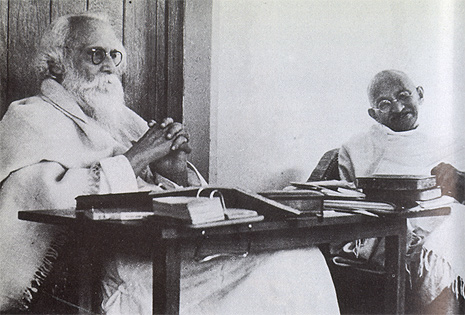
Source: https://www.harvardsquarelibrary.org/biographies/rabindranath-tagore-poet-of-power-portraits/
The Poet of Asia, as Lord Hardinge called Dr. Tagore, is fast becoming, if he has not already become, the Poet of the world. Increasing prestige has brought to him increasing responsibility. His greatest service to India must be his poetic interpretation of India’s message to the world. The Poet is, therefore, sincerely anxious that India should deliver no false or feeble message in her name. He is naturally jealous of his country’s reputation. He says he has striven hard to find himself in tune with the present movement. He confesses that he is baffled. He can find nothing for his lyre in the din and the bustle of Non-cooperation. In three forceful letters, he has endeavoured to give expression to his misgivings, and he has come to the conclusion that Non-cooperation is not dignified enough for the India of his vision, that it is a doctrine of negation and despair. He fears that it is a doctrine of separation, exclusiveness, narrowness and negation.
No Indian can feel anything but pride in the Poet’s exquisite jealousy of India’s honour. It is good that he should have sent to us his misgivings in language at once beautiful and clear.
In all humility, I shall endeavour to answer the Poet’s doubts. I may fail to convince him or the reader who may have been touched by his eloquence, but I would like to assure him and India that Non-cooperation in conception is not any of the things he fears, and he need have no cause to be ashamed of his country for having adopted Non-cooperation. If, in actual application, it appears in the end to have failed, it will be no more the fault of the doctrine, than it would be of Truth, if those who claim to apply it in practice do not appear to succeed. Non-cooperation may have come in advance of its time. India and the world must then wait, but there is no choice for India save between violence and Non-cooperation.
Nor need the Poet fear that Non-cooperation is intended to erect a Chinese wail between India and the West. On the contrary, Non-cooperation is intended to pave the way to real, honourable and voluntary co-operation based on mutual respect and trust.
The present struggle is being waged against compulsory cooperation, against one-sided combination, against the armed imposition of modern methods of exploitation, masquerading under the name of civilisation.
Non-cooperation is a protest against an unwitting and unwilling participation in evil.
Non-cooperation is intended to pave the way to real, honourable and voluntary co-operation based on mutual respect and trust. The present struggle is being waged against compulsory cooperation, against one-sided combination, against the armed imposition of modern methods of exploitation, masquerading under the name of civilisation. Non-cooperation is a protest against an unwitting and unwilling participation in evil.
The Poet’s concern is largely about the students. He is of the opinion that they should not have been called upon to give up Government schools before they had other schools to go to. Here I must differ from him. I have never been able to make a fetish of literary training. My experience has proved to my satisfaction that literary training by itself adds not an inch to one’s moral height and that character-building is independent of literary training. I am firmly of the opinion that the Government schools have unmanned us; rendered us helpless and Godless. They have filled us with discontent, and providing no remedy for the discontent, have made us despondent. They have made us what we were intended to become — clerks and interpreters. A Government builds its prestige upon the apparently voluntary association of the governed. And if it was wrong to cooperate with the Government in keeping us slaves, we were bound to begin with those institutions in which our association appeared to be most voluntary. The youth of a nation are its hope. I hold that, as soon as we discovered that the system of Government was wholly, or mainly evil, it became sinful for us to associate our children with it.
It is no argument against the soundness of the proposition laid down by me that the vast majority of the students went back after the first flush of enthusiasm. Their recantation is proof rather of the extent of our degradation than of the wrongness of the step. Experience has shown that the establishment of national schools has not resulted in drawing many more students. The strongest and the truest of them came out without any national schools to fall back upon, and I am convinced that these first withdrawals are rendering service of the highest order.
But the Poet’s protest against the calling out of the boys is really a corollary to his objection to the very doctrine of Non-cooperation. He has a horror of everything negative. His whole soul seems to rebel against the negative commandments of religion. I must give his objection in his own inimitable language.
“R, in support of the present movement has often said to me that passion for rejection is a stronger power in the beginning than the acceptance of an ideal. Though I know it to be a fact, I cannot take it as a truth… Brahma-vidya in India has for its object mukti (emancipation), while Buddhism has nirvana (extinction), negative side of truth… Therefore, he (Buddha) emphasised the fact of dukkha (misery) which had to be avoided and the Brahma-vidya emphasised the fact of anand (joy) which had to be attained.” In these and kindred passages, the reader will find the key to the Poet’s mentality. In my humble opinion, rejection is as much an ideal as the acceptance of a thing. It is as necessary to reject untruth as it is to accept truth. All religions teach that two opposite forces act upon us and that the human endeavour consists in a series of eternal rejections and acceptances. Non- cooperation with evil is as much a duty as co-operation with good. I venture to suggest that the Poet has done an unconscious injustice to Buddhism in describing nirvana as merely a negative state. I make bold to say that mukti (emancipation) is as much a negative state as nirvana. Emancipation from or extinction of the bondage of the flesh leads to ananda (eternal bliss). Let me close this part of my argument by drawing attention to the fact that the final word of the Upanishads (Brahma-vidya) is Not. Neti was the best description the authors of the Upanishads were able to find for Brahma.
In my humble opinion, rejection is as much an ideal as the acceptance of a thing. It is as necessary to reject untruth as it is to accept truth. All religions teach that two opposite forces act upon us and that the human endeavour consists in a series of eternal rejections and acceptances. Non- cooperation with evil is as much a duty as co-operation with good. I venture to suggest that the Poet has done an unconscious injustice to Buddhism in describing nirvana as merely a negative state. I make bold to say that mukti (emancipation) is as much a negative state as nirvana. Emancipation from or extinction of the bondage of the flesh leads to ananda (eternal bliss). Let me close this part of my argument by drawing attention to the fact that the final word of the Upanishads (Brahma-vidya) is Not. Neti was the best description the authors of the Upanishads were able to find for Brahma.
I, therefore, think that the Poet has been unnecessarily alarmed at the negative aspect of Non-cooperation. We had lost the power of saying ‘no’. It had become disloyal, almost sacrilegious to say ‘no’ to the Government. This deliberate refusal to cooperate is like the necessary weeding process that a cultivator has to resort before he sows. Weeding is as necessary to agriculture as sowing. Indeed, even whilst the crops are growing, the weeding fork, as every husbandman knows, is an instrument almost of daily use. The nation’s Non-cooperation is an invitation to the Government to co-operate with it on its own terms as is every nation’s right and every good government’s duty. Non-cooperation is the nation’s notice that it is no longer satisfied to be in tutelage. The nation had taken to the harmless (for it), natural and religious doctrine of Non-cooperation in the place of the unnatural and irreligious doctrine of violence. And if India is ever to attain the swaraj of the Poet’s dream, she will do so only by Non-violent Non-cooperation. Let him deliver his message of peace to the world, and feel confident that India, through her Non- cooperation, if she remains true to her pledge, will have exemplified his message. Non-cooperation is intended to give the very meaning to patriotism that the Poet is yearning after. An India prostrate at the feet of Europe can give no hope to humanity. An India awakened and free has a message of peace and goodwill to a groaning world. Non-cooperation is designed to supply her with a platform from which she will preach the message.
…if India is ever to attain the swaraj of the Poet’s dream, she will do so only by Non-violent Non-cooperation. Let him deliver his message of peace to the world, and feel confident that India, through her Non- cooperation, if she remains true to her pledge, will have exemplified his message. Non-cooperation is intended to give the very meaning to patriotism that the Poet is yearning after. An India prostrate at the feet of Europe can give no hope to humanity. An India awakened and free has a message of peace and goodwill to a groaning world. Non-cooperation is designed to supply her with a platform from which she will preach the message.
– M.K. Gandhi
The Call Of Truth
(This long rejoinder from Tagore to Gandhi originally appeared in Pravasee in Bengali and later in Modern Review in English. The original is reproduced in Volume XXIV of the Collected Works of Rabindranath Tagore)
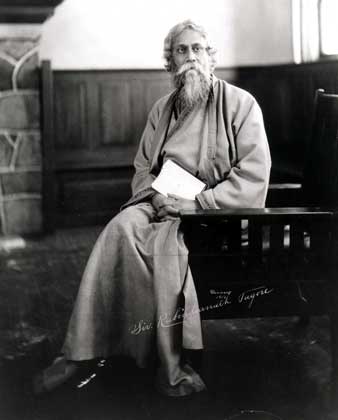
Source: https://www.oldindianphotos.in/2010/04/various-rabindranath-tagore-photographs.html
Parasites have to pay for their readymade victuals by losing the power, of assimilating food in natural form. In the history of man, this same sin of laziness has always entailed degeneracy. Man becomes parasitical, not only when he fattens on others’ toil, but also when he becomes rooted to a particular set of outside conditions and allows himself helplessly to drift along the stream of things as they are; for the outside is alien to the inner self, and if the former be made indispensable by sheer habit, man acquires parasitical characteristics, and becomes unable to perform his true function of converting the impossible into the possible.
In this sense all the lower animals are parasites. They are carried along by their environment; they live or die by natural selection; they progress or retrogress as nature may dictate. Their mind has lost the power of growth. The bees, for millions of years, have been unable to get beyond the pattern of their hive. For that reason, the form of their cell has attained certain perfection, but their mentality is confined to the age-long habits of their hive-life and cannot soar out of its limitations. Nature has developed a cautious timidity in the case of her lower types of life; she keeps them tied to her apron strings and has stunted their minds, lest they should stray into dangerous experiments.
But Providence displayed a sudden accession of creative courage when it came to man; for his inner nature has not been tied down, though outwardly the poor human creature has been left naked, weak and defenceless. In spite of these disabilities, man in the joy of his inward freedom has stood up and declared: “I shall achieve the impossible”. That is to say, he has consistently refused to submit to the rule of things as they always have been, but is determined to bring about happenings that have never been before. So when, in the beginning of his history, man’s lot was thrown in with monstrous creatures, tusked and taloned, he did not, like the deer, simply take refuge in flight, nor, like the tortoise, take refuge in biding, but set to work with flints to make even more efficient weapons. These, moreover, being the creation of his own inner faculties, were not dependent on natural selection, as were those of the other animals, for their developments. And so man’s instruments progressed from flint to steel. This shows that man’s mind has never been helplessly attached to his environment. What came to his hand was brought under his thumb. Not content with the flint on the surface, he delved for the iron beneath. Not satisfied with the easier process of chipping flints, he proceeded to melt iron ore and hammer it into shape. That which resisted more stubbornly was converted into a better ally. Man’s inner nature not only finds success in its activity, but there it also has its joy. He insists on penetrating further and further into the depths, from the obvious to the hidden, from the easy to the difficult, from parasitism to self-determination, from the slavery of his passions to the mastery of himself. That is how he has won.
But if any section of mankind should say, “The flint was the weapon of our revered forefathers; by departing from it we destroy the spirit of the race”, then they may succeed in preserving what they call their race, but they strike at the root of the glorious tradition of humanity which was theirs also. And we find that those, who have steadfastly stuck to their flints, may indeed have kept safe their pristine purity to their own satisfaction, but they have been out casted by the rest of mankind, and so have to pass their lives slinking away in jungle and cave. They are, as I say, reduced to a parasitic dependence on outside nature, driven along blindfold by the force of things as they are. They have not achieved swaraj in their inner nature, and so are deprived of swaraj in the outside world as well. They have ceased to be even aware, that it is man’s true function to make the impossible into the possible by dint of his own powers; that it is not for him to be confined merely to what has happened before; that he must progress towards what ought to be by rousing all his inner powers by means of the force of his soul.
Thirty years ago I used to edit the Sadhana magazine and there I tried to say this same thing. Then English-educated India was frightfully busy begging for its rights. And I repeatedly endeavoured to impress on my countrymen, that man is not under any necessity to beg for rights from others, but must create them for himself; because man lives mainly by his inner nature, and there he is the master. By dependence on acquisition from the outside, man’s inner nature suffers loss. And it was my contention, that man is not so hard oppressed by being deprived of his outward rights as he is by the constant bearing of the burden of prayers and petitions.
Then when the Bangadarshan magazine came into my hands, Bengal was beside herself at the sound of the sharpening of the knife for her partition. The boycott of Manchester, which was the outcome of her distress, had raised the profits of the Bombay mill-owners to a super-foreign degree. And I had then to say: “This will not do, either; for it is also of the outside. Your main motive is hatred of the foreigner, not love of country.” It was then really necessary for our countrymen to be made conscious of the distinction, that the Englishman’s presence is an external accident, mere maya but that the presence of our country is an internal fact which is also an eternal truth. Maya looms with an exaggerated importance, only when we fix our attention exclusively upon it, by reason of some infatuation—be it of love or of hate. Whether in our passion we rush to embrace it, or attack it; whether we yearn for it, or spurn it; it equally fills the whole field of our blood-shot vision.
Maya is like the darkness. No steed, however swift, can carry us beyond it; no amount of water can wash it away. Truth is like a lamp; even as it is lit, maya vanishes. Our shastras tell us that Truth, even when it is small, can rescue us from the terror which is great. Fear is the atheism of the heart. It cannot be overcome from the side of negation. If one of its heads be struck off, it breeds like the monster of the fable, a hundred others. Truth is positive; it is the affirmation of the soul. If even a little of it be roused, it attacks negation at the very heart and overpowers it wholly.
Maya is like the darkness. No steed, however swift, can carry us beyond it; no amount of water can wash it away. Truth is like a lamp; even as it is lit, maya vanishes. Our shastras tell us that Truth, even when it is small, can rescue us from the terror which is great. Fear is the atheism of the heart. It cannot be overcome from the side of negation. If one of its heads be struck off, it breeds like the monster of the fable, a hundred others. Truth is positive; it is the affirmation of the soul. If even a little of it be roused, it attacks negation at the very heart and overpowers it wholly.
Alien government in India is a veritable chameleon. Today it comes in the guise of the Englishman; tomorrow perhaps as some other foreigner; the next day, without abating a jot of its virulence, it may take the shape of our own countrymen. However determinedly we may try to hunt this monster of foreign dependence with outside lethal weapons, it will always elude our pursuit by changing its skin, or its colour. But if we can gain within us the truth called our country, all outward maya will vanish of itself. The declaration of faith that my country is there, to be realised, has to be attained by each one of us. The idea that our country is ours, merely because we have been born in it, can only be held by those who are fastened, in a parasitic existence, upon the outside world. But the true nature of man is his inner nature, with its inherent powers. Therefore, that only can be a man’s true country, which he can help to create by his wisdom and will, his love and his actions. So in 1905, I called upon my countrymen to create their country by putting forth their own powers from within. For the act of creation itself is the realization of truth.
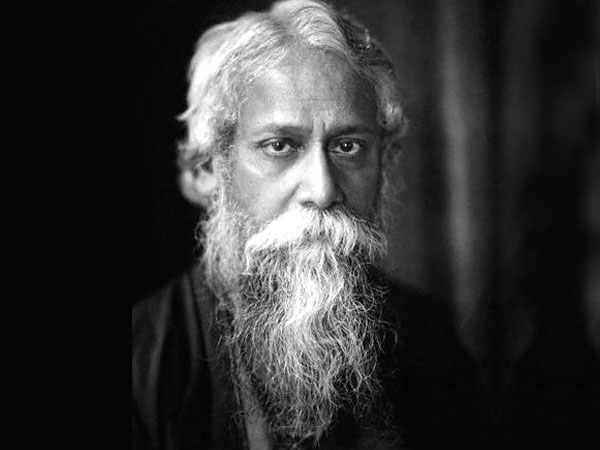
Source: https://www.oldindianphotos.in/2010/04/various-rabindranath-tagore-photographs.html
The Creator gains Himself in His universe. To gain one’s own country means to realize one’s own soul more fully expanded within it. This can only be done when we are engaged in building it up with our service, our ideas and our activities. Man’s country being the creation of his own inner nature, when his soul thus expands within it, it is more truly expressed, more fully realised. In my paper called Swadeshi Samaj, written in 1905, I discussed at length the ways and means by which we could make the country of our birth more fully our own. Whatever may have been the shortcomings of my words then uttered, I did not fail to lay emphasis on the truth, that we must win our country, not from some foreigner, but from our own inertia, our own indifference. Whatever be the nature of the boons we may be seeking for our country at the door it only makes our inertia more densely inert. Any public benefit done by the alien Government goes to their credit not to ours. So whatever outside advantage such public benefit might mean for us, our country will only get more and more completely lost to us thereby. That is to say, we shall have to pay out in soul value for what we purchase as material advantage. The Rishi has said: “The son is dear, not because we desire a son, but because we desire to realize our own soul in him.” It is the same with our country. It is dear to us, because it is the expression of our own soul. When we realize this, it will become impossible for us to allow our service of our country to wait on the pleasure of others.
These truths, which I then tried to press on my countrymen, were not particularly new, nor was there anything therein which need have grated on their ears; but, whether anyone else remembers it or not, I at least am not likely to forget the storm of indignation which I roused. I am not merely referring to the hooligans of journalism whom it pays to be scurrilous. But even men of credit and courtesy were unable to speak of me in restrained language.
There were two root causes of this. One was anger, the second was greed.
Giving free vent to angry feelings is a species of self-indulgence. In those days there was practically nothing to stand in the way of the spirit of destructive revel, which spread all over the country. We went about picketing, burning, placing thorns in the path of those whose way was not ours, acknowledging to restraints in language or behavior, – all in the frenzy of our wrath. Shortly after it was all over, a Japanese friend asked me: “How is it you people cannot carry on your work with calm and deep determination? This wasting of energy can hardly be of assistance to your object.” I had no help but to reply: “When we have the gaining of the object clearly before our minds, we can be restrained, and concentrate our energies to serve it; but when it is a case of venting our anger, our excitement rises and rises till it drowns the object and then we are spend-thrift to the point of bankruptcy.” However that may be, there were my countrymen encountering, for the time being, no check to the overflow of their outraged feelings. It was like a strange dream. Everything seemed possible. Then all of a sudden it was my misfortune to appear on the scene with my doubts and my attempts to divert the current into the path of self-determination. My only success was in diverting their wrath on to my own devoted head.
“When we have the gaining of the object clearly before our minds, we can be restrained, and concentrate our energies to serve it; but when it is a case of venting our anger, our excitement rises and rises till it drowns the object and then we are spend-thrift to the point of bankruptcy.” However that may be, there were my countrymen encountering, for the time being, no check to the overflow of their outraged feelings. It was like a strange dream. Everything seemed possible. Then all of a sudden it was my misfortune to appear on the scene with my doubts and my attempts to divert the current into the path of self-determination. My only success was in diverting their wrath on to my own devoted head.
Then there was our greed. In history, all people have won valuable things by pursuing difficult paths. We had hit upon the device of getting them cheap, not even through the painful indignity of supplication with folded hands, but by proudly conducting our beggary in threatening tones. The country was in ecstasy at the ingenuity of the trick. It felt like being at a reduced price sale. Everything worth having in the political market was ticketed at half-price. Shabby-genteel mentality is so taken up with low prices that it has no attention to spare for quality and feels inclined to attack anybody who has the hardihood to express doubts in that regard. It is like the man of worldly piety who believes that the judicious expenditure of coin can secure, by favour of the priest, a direct passage to heaven. The dare devil who ventures to suggest that not heaven but dreamland is likely to be his destination must beware of a violent end.
Anyhow, it was the outside maya which was our dream and our ideal in those days. It was a favourite phrase of one of the leaders of the time that we must keep one hand at the feet and the other at the throat of the Englishman, that is to say, with no hand left free for the country! We have since perhaps got rid of this ambiguous attitude. Now we have one party that has both hands raised to the foreigner’s throat, and another party which has both hands down at his feet; but whichever attitude it may be, these methods still appertain to the outside maya. Our unfortunate minds keep revolving round and round the British Government, now to the left, now to the right; our affirmations and denials alike are concerned with the foreigners.
In those days, the stimulus from every side was directed towards the heart of Bengal. But emotion by itself, like fire only consumes its fuel and reduces it to ashes; it has no creative power. The intellect of man must busy itself, with patience, with skill, with foresight, in using this fire to melt that which is hard and difficult into the object of its desire. We neglected to rouse our intellectual forces, and so were unable to make use of this surging emotion of ours to create any organisation of permanent value. The reason of our failure, therefore, was not in anything outside, but rather within us. For a long time past we have been in the habit, in our life and endeavour, of setting apart one place for our emotions and another for our practices. Our intellect has all the time remained dormant, because we have not dared to allow it scope. That is why, when we have to rouse ourselves to action, it is our emotion which has to be requisitioned, and our intellect has to be kept from interfering by the hypnotism of some magical formula,—that is to say we hasten to create a situation absolutely inimical to the free play of our intellect.
The loss which is incurred by this continual deadening of our mind cannot be made good by any other contrivance. In our desperate attempts to do so we have to invoke the magic of maya and our impotence jumps for joy at the prospect of getting hold of Alladin’s lamp. Of course everyone has to admit that there is nothing to beat Alladin’s lamp, its only inconvenience being that it beats one to get hold of. The unfortunate part of it is that the person, whose greed is great, but whose powers are feeble, and who has lost all confidence in his own intellect, simply will not allow himself, to dwell on the difficulties of bespeaking the services of some genie of the lamp. He can only be brought to exert himself at all by holding out the speedy prospect of getting at the wonderful lamp. If anyone attempts to point out the futility of his hopes, he fills the air with wailing and imprecation, as at a robber making away with his all.
In the heat of the enthusiasm of the partition days, a band of youths attempted to bring about the millennium through political revolution. Their offer of themselves as the first sacrifice to the fire which they had lighted makes not only their own country, but other countries as well, bare the head to them in reverence. Their physical failure shines forth as the effulgence of spiritual glory. In the midst of the supreme travail, they realised at length that the way of bloody revolution is not the true way; that where there is no politics, a political revolution is like taking a short cut to nothing; that the wrong way may appear shorter, but it does not reach the goal, and only grievously hurts the feet. The refusal to pay the full price for a thing leads to the loss of the price without the gain of the thing. These impetuous youths offered their lives as the price of their country’s deliverance; to them it meant the loss of their all but alas! the price offered on behalf of the country was insufficient. I feel sure that those of them who still survive must have realised by now, that the country must be the creation of all its people, not of one section alone. It must be the expression of all their forces of heart, mind and will.
This creation can only be the fruit of that yoga, which gives outward form to the inner faculties. Mere political or economical yoga is not enough; for that all the human powers must unite.
When we turn our gaze upon the history of other countries, the political steed comes prominently into view; on it seems to depend wholly the progress of the carriage. We forget that the carriage also must be in a fit condition to move; its wheels must be in agreement with one another and its parts well fitted together; with which not only have fire and hammer and chisel been busy but much thought and skill and energy have also been spent in the process. We have seen some countries which are externally free and independent; when however, the political carriage is in motion, the noise which it makes arouses the whole neighbourhood from slumber and the jolting produces aches and pains in the limbs of the helpless passengers. It comes to pieces in the middle of the road, and it takes the whole day to put it together again with the help of ropes and strings. Yet however loose the screws and however crooked the wheels, still it is a vehicle of some sort after all. But for such a thing as is our country a mere collection of jointed logs, that not only have no wholeness amongst themselves, but are contrary to one another for this to be dragged along a few paces by the temporary pull of some common greed or anger, can never be called by the name of political progress. Therefore, is it not, in our case, wiser to keep for the moment our horse in the stable and begin to manufacture a real carriage?
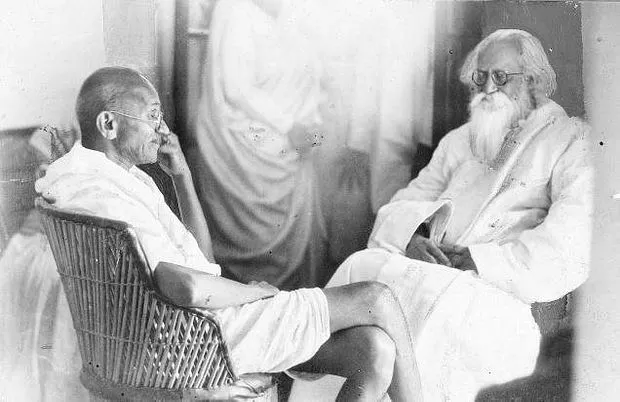
Source: https://www.scoopwhoop.com/Rare-Pictures-Of-Gurudev-Rabindranath-Tagore/#.gf243vxzm
From the writings of the young men, who have come back out of the valley of the shadow of death, I feel sure some such thoughts must have occurred to them. And so they must be realising the necessity of the practice of yoga as of primary importance;—that from which is the union in a common endeavour of all the human faculties. This cannot be attained by any outside blind obedience, but only by the realisation of self in the light of intellect. That which fails to illumine the intellect, and only keeps it in the obsession of some delusion, is its greatest obstacle.
The call to make the country our own by dint of our own creative power, is a great call. It is not merely inducing the people to take up some external mechanical exercise; for man’s life is not in making cells of uniform pattern like the bee, nor in incessant weaving of webs like the spider; his greatest powers are within, and on these are his chief reliance. If by offering some allurement we can induce man to cease from thinking, so that he may go on and on with some mechanical piece of work, this will only result in prolonging the sway of maya, under which our country has all along been languishing. So far, we have been content with surrendering our greatest right—the right to reason and to judge for ourselves—to the blind forces of shastric injunctions and social conventions. We have refused to cross the seas, because Manu has told us not to do so. We refuse to eat with the Mussalman, because prescribed usage is against it. In other words, we have systematically pursued a course of blind routine and habit, in which the mind of man has no place. We have thus been reduced to the helpless condition of the master who is altogether dependent on his servant. The real master, as I have said, is the internal man; and he gets into endless troubles, when he becomes his own servant’s slave—a mere automaton, manufactured in the factory of servitude. He can then only rescue himself from one master by surrendering himself. Similarly, he who glorifies inertia by attributing to it a fanciful purity, becomes, like it, dependent on outside impulses, both for rest and motion. The inertness of mind, which is the basis of all slavery, cannot be got rid of by a docile, submission to being hoodwinked, nor by going through the motions of a wound-up mechanical doll.
So far, we have been content with surrendering our greatest right—the right to reason and to judge for ourselves—to the blind forces of shastric injunctions and social conventions. We have refused to cross the seas, because Manu has told us not to do so. We refuse to eat with the Mussalman, because prescribed usage is against it. In other words, we have systematically pursued a course of blind routine and habit, in which the mind of man has no place. We have thus been reduced to the helpless condition of the master who is altogether dependent on his servant. The real master, as I have said, is the internal man; and he gets into endless troubles, when he becomes his own servant’s slave—a mere automaton, manufactured in the factory of servitude. He can then only rescue himself from one master by surrendering himself.
The movement, which has now succeeded the swadeshi agitation, is ever so much greater and has moreover extended its influence all over India. Previously, the vision of our political leaders had never reached beyond the English-knowing classes, because the country meant for them only that bookish aspect of it which is to be found in the pages of the Englishman’s history. Such a country was merely a mirage born of vapourings in the English language, in which litted about thin shades of Burke and Gladstone, Mazzini and Garibaldi. Nothing resembling self-sacrifice or true feeling for their countrymen was visible. At this juncture, Mahatma Gandhi came and stood at the cottage door of the destitute millions, clad as one of themselves, and talking to them in their own language. Here was the truth at last, not a mere quotation out of a book. So the name of Mahatma, which was given to him, is his true name. Who else has felt so many men of India to be of his own flesh and blood? At the touch of Truth the pent-up forces of the soul are set free. As soon as true love stood at India’s door, it flew open; all hesitation and holding back vanished. Truth awakened truth.
Stratagem in politics is a barren policy—this was a lesson of which we were sorely in need. All honour to the Mahatma, who made visible to us the power of Truth. But reliance on tactics is so ingrained in the cowardly and the weak, that in order to eradicate it, the very skin must be sloughed off. Even today, our worldly-wise men cannot get rid of the idea of utilising the Mahatma at a secret and more ingenious move in their political gamble. With their minds corroded by untruth, they cannot understand what an important thing it is that the Mahatma’s supreme love should have drawn forth the country’s love. The thing that has happened is nothing less than the birth of freedom. It is the gain by the country of itself. In it there is no room for any thought, as to where the Englishman is, or is not. This love is self- expression. It is pure affirmation. It does not argue with negation: it has no need for argument.
Some notes of the music of this wonderful awakening of India by love, floated over to me across the seas. It was a great joy to me to think that the call of this festivity of awakening would come to each one of us; and that the true shakti of India’s spirit, in all its multifarious variety, would at last find expression. This thought came to me because I have always believed that in such a way India would find its freedom. When Lord Buddha voiced forth the truth of compassion for all living creatures, the manhood of India was roused and poured itself forth in science and art and wealth of every kind. True in the matter of political unification the repeated attempts that were then made as often failed; nevertheless India’s mind had awakened into freedom from its submergence in sleep, and its overwhelming force would brook no confinement within the petty limits of country. It overflowed across ocean and desert, scattering its wealth of the spirit over every land that it touched. No commercial or military exploiter, to-day has ever been able to do anything like it. Whatever land these exploiters have touched has been agonised with sorrow and insult, and the fair face of the world has been scarred and disfigured. Why? Because not greed but love is true. When love gives freedom it does so at the very centre of our life. When greed seeks unfettered power, it is forcefully impatient. We saw this during the partition agitation. We then compelled the poor to make sacrifices, not always out of the inwardness of love, but often by outward pressure. That was because greed is always seeking for a particular result within a definite time. But the fruit which love seeks is not of today or tomorrow, or for a time only: it is sufficient unto itself.
No commercial or military exploiter, to-day has ever been able to do anything like it. Whatever land these exploiters have touched has been agonised with sorrow and insult, and the fair face of the world has been scarred and disfigured. Why? Because not greed but love is true. When love gives freedom it does so at the very centre of our life. When greed seeks unfettered power, it is forcefully impatient. We saw this during the partition agitation. We then compelled the poor to make sacrifices, not always out of the inwardness of love, but often by outward pressure. That was because greed is always seeking for a particular result within a definite time. But the fruit which love seeks is not of today or tomorrow, or for a time only: it is sufficient unto itself.
So, in the expectation of breathing the buoyant breezes of this new found freedom, I came home rejoicing. But what I found in Calcutta when I arrived depressed me. An oppressive atmosphere seemed to burden the land. Some outside compulsion seemed to be urging one and all to talk the same strain, to work at the same mill. When I wanted to inquire, to discuss, my well- wishers clapped their hands over my lips, saying: “Not now, not now”. Today, in the atmosphere of the country, there is a spirit of persecution, which is not that of armed force, but something still more alarming, because it is invisible. I found, further, that those who had their doubts as to the present activities, if they happened to whisper them out, however cautiously, however guardedly, felt some admonishing hand clutching them within. There was a newspaper which one day had the temerity to disapprove, in a feeble way, of the burning of cloth. The very next day, the editor was shaken out of his balance by the agitation of his readers. How long would it take for the fire which was burning cloth to reduce his paper to ashes? The sight that met my eye was, on the one hand people immensely busy; on the other, intensely afraid. What I heard on every side was, that reason, and culture as well, must be closured. It was only necessary to cling to an unquestioning obedience. Obedience to whom? To some mantra, some unreasoned creed!
And why this obedience? Here again comes that same greed, our spiritual enemy. There dangles before the country the bait of getting a thing of inestimable value dirt cheap and in double-quick time. It is like the faqir with his goldmaking trick. With such a lure men cast so readily to the winds their independent judgement and wax so mightly wroth with those who will not do likewise. So easy is to overpower, in the name of outside freedom the inner freedom of man. The most deplorable part of it is that so many do not even honestly believe in the hope that they swear by. “It will serve to make our countrymen do what is necessary”—say they. Evidently, according to them, the India which once declared: “In truth is Victory, not in untruth”—that India would not have been fit for Swaraj.
Another mischief is that the gain, with the promise of which obedience is claimed, is indicated by name, but is not defined, just as when fear is vague it becomes all the more strong, so the vagueness of the lure makes it all the more tempting; inasmuch as ample room is left for each one’s imagination to shape it to his taste. Moreover there is no driving it into a corner because it can always shift from one shelter to another. In short, the object of the temptation has been magnified through its indefiniteness while the time and method of its attainment have been made too narrowly definite. When the reason of man has been overcome in this way, he easily consents to give up all legitimate questions and blindly follows the path of obedience. But can we really afford to forget so easily that delusion is at the root of all slavery —that all freedom means freedom from maya? What if the bulk of our people have unquestioningly accepted the creed, that by means of sundry practices swaraj will come to them on a particular date in the near future and are also ready to use their clubs to put down all further argument,—that is to say, they have surrendered the freedom of their own minds and are prepared to deprive other minds of their freedom likewise,—is not this by itself a reason for profound misgiving? We were seeking the exerciser to drive out this very ghost; but if the ghost itself comes in the guise of exerciser then the danger is only heightened.
The Mahatma has won the heart of India with his love; for that we have all acknowledged his sovereignty. He has given us a vision of the shakti of Truth; for that our gratitude to him is unbounded. We read about Truth in books: we talk about it: but it is indeed a red-letter day, when we see it face to face. Rare is the moment, in many a long year, when such good fortune happens. We can make and break Congresses every other day. It is at any time possible for us to stump the country preaching politics in English. But the golden rod, which can awaken our country in Truth and Love is not a thing which can be manufactured by the nearest goldsmith. To the weilder of that rod our profound salutation! But if having seen Truth, our belief in it is not confirmed, what is the good of it all? Our mind must acknowledge the Truth of the intellect, just as our heart does the Truth of love. No Congress or other outside institution succeeded in touching the heart of India. It was roused only by the touch of love. Having had such a clear vision of this wonderful power of Truth, are we to cease to believe in it, just where the attainment of Swaraj is concerned? Has the Truth, which was needed in the process of awakenment, to be got rid of in the process of achievement?
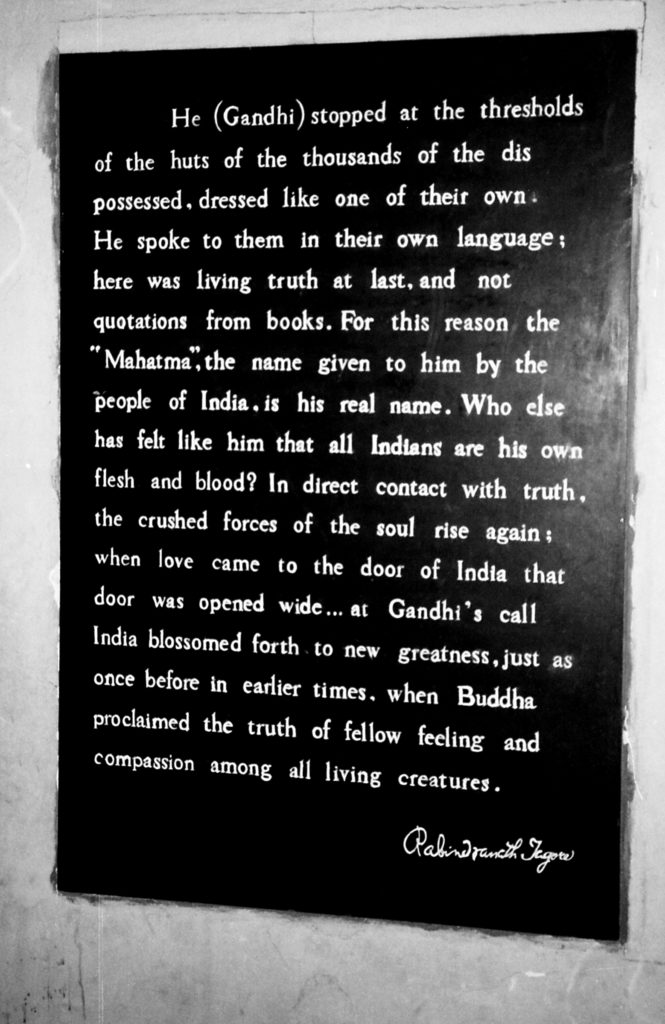
Source: The Gandhi Museum, Madurai, Tamil Nadu, India
Let me give an illustration. I am in search of a vina player. I have tried East and I have tried West, but have not found the man of my quest. They are all experts, they can make the strings resound to a degree, they command high prices, but for all their wonderful execution they can strike no chord in my heart. At last I come across one whose very first notes melt away the sense of oppression within. In him is the fire of the shakti of joy which can light up all other hearts by its touch. His appeal to me is instant and I hail him as Master. I then want a vina made. For this, of course are required all kinds of material and a different kind of science. If, finding me to be lacking in the means my master should be moved to pity and say: “Never mind, my son do not go to the expense in workmanship and time which a vina will require. Take rather this simple string tightened across a piece of wood and practise on it. In a short time you will find it to be as good as a vina.” Would that do? I am afraid not. It would, in fact, be a mistaken kindness for the master thus to take pity on my circumstances. Far better if he were to tell me plainly that such things cannot be had cheaply. It is he who should teach me that merely one string will not serve for a true vina, that the materials required are many and various; that the lines of its moulding must be shapely and precise; that if there be anything faulty, it will fail to make good music, so that all laws of science and technique of art must be rigorously and intelligently followed. In short the true function of the master player should be to evoke a response from the depths of our heart, so that we may gain the strength to wait and work till the true end is achieved.
From our master, the Mahatma may our devotion to him never grow less!—we must learn the truth of love in all its purity, but the science and art of building up swaraj is a vast subject; its pathways are difficult to traverse and take time. For this task, aspiration and emotion must be there, but no less must study and thought be there likewise. For it, the economist must think, the mechanic must labour, the educationist and statesman must teach and contrive. In a word, the mind of the country must exert itself in all directions. Above all, the spirit of Inquiry throughout the whole country must be kept intact and untrammelled, its mind not made timid or inactive by compulsion open or secret.
We know from past experience that it is not any and every call to which the country responds. It is because no one has yet been able to unite in yoga all the forces of the country in the work of its creation, that so much time has been lost over and over again. And we have been kept waiting and waiting for him who has the right and the power to make the call upon us. In the old forests of India, our gurus, in the fullness of their vision of the truth had sent forth such a call saying: “As the rivers flow on their downward course, as the months flow on to the year, so let all seekers after Truth come from all sides”. The initiation into Truth of that day has borne fruit, undying to this day, and the voice of its message still rings in the ears of the world.
Why should not our guru of today, who would lead us on the paths of karma, send forth such a call? Why should he not say: “Come ye from all sides and be welcome. Let all the forces of the land be brought into action, for then alone shall the country awake. Freedom is in complete awakening, in full self-expression.” God has given the Mahatma the voice that can call, for in him there is the Truth. Why should this not be our long awaited opportunity?
But his call came to one narrow field alone. To one and all he simply says: “Spin and weave, spin and weave”. Is this the call: “Let all seekers after Truth come from all sides”? Is this the call of the New Age to new creation? When nature called to the Bee to take refuge in the narrow life of the hive, millions of bees responded to it for the sake of efficiency, and accepted the loss of sex in consequence. But this sacrifice by way of self-atrophy led to the opposite of freedom. Any country, the people of which can agree to become neuters for the sake of some temptation, or command, carries within itself its own prison-house. To spin is easy, therefore for all men it is an imposition hard to bear. The call to the case efficiency is well enough for the Bee. The wealth of power, that is Man’s, can only become manifest when his utmost is claimed.
Sparta tried to gain strength by narrowing herself down to a particular purpose, but she did not win. Athens sought to attain perfection by opening herself out in all her fullness, and she did win. Her flag of victory still flies at the masthead of man’s civilisation. It is admitted that European military camps and factories are stunting man, that their greed is cutting man down to the measure of their own narrow purpose that for these reasons joylessness darkly lowers over the West. But if man be stunted by big machines, the danger of his being stunted by small machines must not be lost sight of. The charkha in its proper place can do no harm but will rather do much good. But where, by reasoned failure to acknowledge the differences in man’s temperament it is in the wrong place, there thread can only be spun at the cost of a great deal of the mind itself. Mind is no less valuable than cotton thread.
Some are objecting: “We do not propose to curb our minds for ever, but only for a time”. But why should it be even for a time? Is it because within a short time spinning will give us swaraj? But where is the argument for this? swaraj is not concerned with our apparel only—it cannot be established on cheap clothing; its foundation is in the mind, which, with its diverse powers and its confidence in those powers, goes on all the time creating swaraj for itself. In no country in the world is the building up of swaraj completed. In some part or other of every nation, some lurking greed or illusion still perpetuates bondage. And the root of such bondage is always within the mind. Where then I ask again, is the argument that in our country swaraj can be brought about by everyone engaging for a time in spinning? A mere statement, in lieu of argument, will surely never do. If once we consent to receive fate’s oracles from human lips that will add one more to the torments of our slavery, and not the least one either. If nothing but oracles will serve to move us, oracles will have to be manufactured morning, noon and night, for the sake of urgent needs, and all other voices would be defeated. Those for whom authority is needed in place of reason, will invariably accept despotism in place of freedom. It is like cutting at the root of a tree while pouring water on the top. This is not a new thing I know. We have enough of magic in the country—magical revelation, magical healing, and all kinds of divine intervention in mundane affairs. That is exactly why I am so anxious to reinstate reason on its throne. As I have said before, God himself has given the mind sovereignty in the material world. And I say today that only those will be able to get and keep Swaraj in the material world who have realised the dignity of self-reliance and self-mastery in the spiritual world, those whom no temptation, no delusion, can induce to surrender the dignity of intellect into the keeping of others.
Some are objecting: “We do not propose to curb our minds for ever, but only for a time”. But why should it be even for a time? Is it because within a short time spinning will give us swaraj? But where is the argument for this? swaraj is not concerned with our apparel only—it cannot be established on cheap clothing; its foundation is in the mind, which, with its diverse powers and its confidence in those powers, goes on all the time creating swaraj for itself. In no country in the world is the building up of swaraj completed. In some part or other of every nation, some lurking greed or illusion still perpetuates bondage. And the root of such bondage is always within the mind.
Consider the burning of cloth, heaped up before the very eyes of our motherland shivering and ashamed in her nakedness. What is the nature of the call to do this? Is it not another instance of a magical formula? The question of using or refusing cloth of a particular manufacture belongs mainly to economic science. The discussion of the matter by our countrymen should have been in the language of economics. If the country has really come to such a habit of mind that precise thinking has become impossible for it, then our very first fight should be against such a fatal habit, to the temporary exclusion of all else if need be. Such a habit would clearly be the original sin from which all our ills are flowing. But far from this, we take the course of confirming ourselves in it by relying on the magical formula that foreign cloth is ‘impure’. Thus economics is bundled out and a fictitious moral dictum dragged into its place.
Untruth is impure in any circumstances, not merely because it may cause us material loss, but even when it does not; for it makes our inner nature unclean. This is a moral law and belongs to a higher plane. But if there be anything wrong in wearing a particular kind of cloth that would be an offence against economics, or hygiene, or aesthetics, but certainly not against morality. Some urge that any mistake which brings sorrow to body or mind is a moral wrong. To which I reply that sorrow follows in the train of every mistake. A mistake in geometry may make a road too long, or a foundation weak, or a bridge dangerous. But mathematical mistakes cannot be cured by moral maxims. If a student makes a mistake in his geometry problem and his exercise book is torn up in consequence the problem will nevertheless remain unsolved until attacked by geometrical methods. But what if the schoolmaster comes to the conclusion that unless the exercise books are condemned and destroyed, his boys will never realise the folly of their mistakes? If such conclusion be well-founded, then I can only repeat that the reformation of such moral weakness of these particular boys should take precedence over all other lessons, otherwise there is no hope of their becoming men in the future.
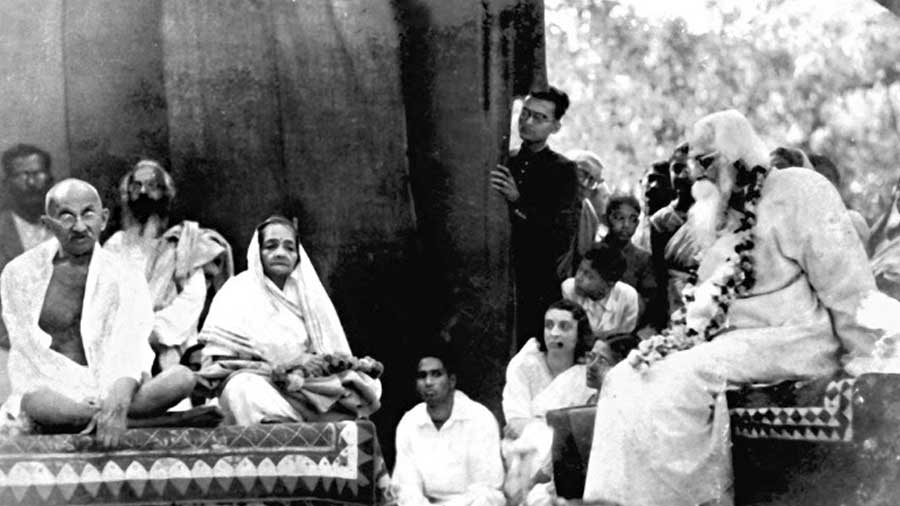
Source: ABP Archive
The command to burn our foreign clothes has been laid on us. I, for one, am unable to obey it. Firstly, because I conceive it to be my very first duty to put up a valiant fight against this terrible habit of blindly obeying orders, and this fight can never be carried on by our people being driven from one injunction to another. Secondly, I feel that the clothes to be burnt are not mine, but belong to those who most sorely need them. If those who are going naked should have given us the mandate to burn, it would, at least, have been a case of self-immolation and the crime of incendiarism would not lie at our door. But how can we expiate the sin of the forcible destruction of clothes which might have gone to women whose nakedness is actually keeping them prisoners unable to stir out of the privacy of their homes?
I have said repeatedly and must repeat once more that we cannot afford to lose our mind for the sake of any external gain. Where Mahatma Gandhi has declared war against the tyranny of the machine which is oppressing the whole world, we are all enrolled under his banner. But we must refuse to accept as our ally the illusion-haunted magic-ridden slave mentality that is at the root of all the poverty and insult under which our country groans. Here is the enemy itself on whose defeat alone swaraj within and without can come to us.
I have said repeatedly and must repeat once more that we cannot afford to lose our mind for the sake of any external gain. Where Mahatma Gandhi has declared war against the tyranny of the machine which is oppressing the whole world, we are all enrolled under his banner. But we must refuse to accept as our ally the illusion-haunted magic-ridden slave mentality that is at the root of all the poverty and insult under which our country groans. Here is the enemy itself on whose defeat alone swaraj within and without can come to us.
The time, moreover, has arrived when we must think of one thing more, and that is this. The awakening of India is a part of the awakening of the world. The door of the New Age has been flung open at the trumpet blast of a great war. We have read in the Mahabharata how the day of self-revelation had to be preceded by a year of retirement. The same has happened in the world today. Nations had attained nearness to each other without being aware of it, that is to say, the outside fact was there, but it had not penetrated into the mind. At the shock of the war, the truth of it stood revealed to mankind. The foundation of modern, that is Western, civilisation was shaken; and it has become evident that the convulsion is neither local nor temporary but has traversed the whole earth and will last until the shocks between man and man, which have extended from continent to continent, can be brought to rest, and a harmony be established.
From now onward, any nation which takes an isolated view of its own country will run counter to the spirit of the New Age, and know no peace. From now onward, the anxiety that each country has for its own safety must embrace the welfare of the world. For some time the working of the new spirit has occasionally shown itself even in the Government of India, which has had to make attempts to deal with its own problems in the light of the world problem. The war has torn away a veil from before our minds. What is harmful to the world, is harmful to each one of us. This was a maxim which we used to read in books. Now mankind has seen it at work and has understood that wherever there is injustice, even if the external right of possession is there, the true right is wanting. So that it is worthwhile even to sacrifice some outward right in order to gain the reality. This immense change, which is coming over the spirit of man raising it from the petty to the great is already at work even in Indian politics. There will doubtless be imperfections and obstacles without number. Self-interest is sure to attack enlightened interest at every step. Nevertheless it would be wrong to come to the decision that the working of self-interest alone is honest, and the larger-hearted striving is hypocritical.
After sixty years of self-experience, I have found that out and out hypocrisy is an almost impossible achievement, so that the pure hypocrite is a rarity indeed. The fact is, that the character of man has always more or less of duality in it. But our logical faculty, the trap-door of our mind, is unable to admit opposites together. So when we find the good with the bad, the former is promptly rejected as spurious. In the universal movement, as it becomes manifest in different parts of the world, this duality of man’s character cannot but show itself. And whenever it does, if we pass judgment from past experience, we are sure to pronounce the selfish part of it to be the real thing; for the spirit of division and exclusion did in fact belong to the past age. But if we come to our judgment in the light of future promise, then shall we understand the enlightened large-heartedness to be the reality and the counsel which will unite each to each to be the true wisdom.
I have condemned, in unsparing terms, the present form and scope of the League of Nations and the Indian Reform Councils. I therefore feel certain that there will be no misunderstanding when I state that, even in these, I find signs of the Time Spirit, which is moving the heart of the West Although the present form is unacceptable, yet there is revealed an aspiration, which is towards the Truth, and this aspiration must not be condemned. In this morning of the world’s awakening, if in only our own national striving there is no response to its universal aspiration, that will betoken the poverty of our spirit. I do not say for a moment that we should belittle the work immediately to hand. But when the bird is roused by the dawn, all its awakening is not absorbed in its search for food. Its wings respond unweariedly to the call of the sky, its throat pours forth for songs, for joy of the new light. Universal humanity has sent us its call today. Let our mind respond in its own language for response is the only true sign of life. When of old we were immersed in the politics of dependence on others, our chief business was the compilation of others’ short-comings. Now that we have decided to dissociate our politics from dependence, are we still to establish and maintain it on the same recital of others’ sins? The state of mind so engendered will only raise the dust of angry passion, obscuring the greater world from our vision, and urge us more and more to take futile short cuts for the satisfaction of our passions. It is a sorry picture of India, which we shall display if we fail to realise for ourselves the greater India. This picture will have no light. It will have in the foreground only the business side of our aspiration. Mere business talent, however, has never created anything.
In the West, a real anxiety and effort of their higher mind to rise superior to business considerations, is beginning to be seen. I have come across many there whom this desire has imbued with the true spirit of the sannyasin, making them renounce their home-world in order to achieve the unity of man, by destroying the bondage of nationalism; men who have within their own soul realised the Advaita of humanity. Many such have I seen in England who have accepted persecution and contumely from their fellow countrymen in their struggles to free other people from the oppression of their own country’s pride of power. Some of them are amongst us here in India. I have seen sannyasins too in France—Romain Rolland for one, who is an outcast from his own people. I have also seen them in the minor countries of Europe. I have watched the faces of European students all aglow with the hope of a united mankind, prepared manfully to bear all the blows, cheerfully to submit to all the insults, of the present age for the glory of the age to come. And are we alone to be content with telling the beads of negation, harping on others’ faults and proceeding with the erosion of Swaraj on a foundation of quarrelsomeness? Shall it not be our first duty in the dawn to remember Him, who is One, who is without distinction of class or colour, and who with his varied shakti makes true provision for the inherent need of each and every class; and to pray to the Giver of Wisdom to unite us all in right understanding:—
Yo ekovarno vahudha shakti yogat
Varnanekan nihitarthodadhati
Vichaiti chante vishwamadau
Sa no buddhya subhaya samyunaktu!
– Rabindranath Tagore
The Great Sentinel
(The following article by Gandhi on Tagore and his criticism appeared in Young India of 13 October 1921. It was in reply to ‘The Call of Truth’)
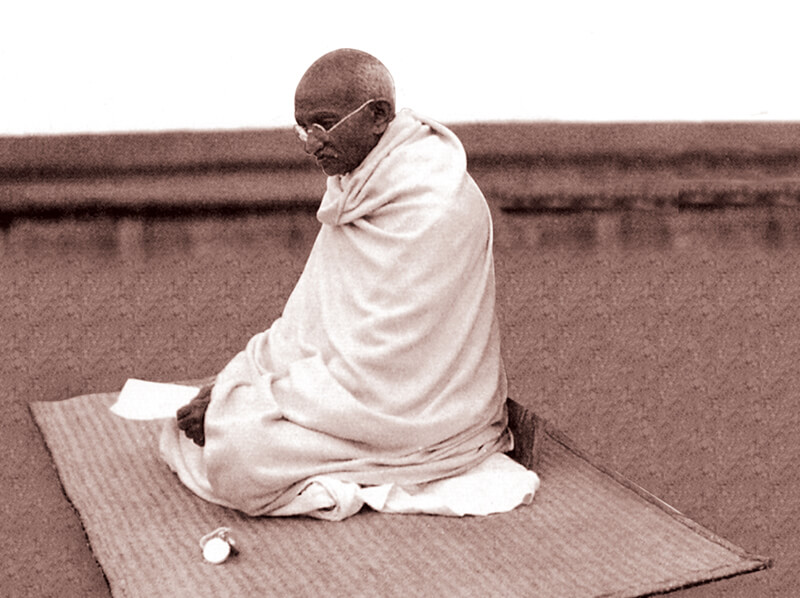
Source: https://gandhi.gov.in/gandhi-photo.html
The Bard of Santiniketan has contributed to the Modern Review a brilliant essay on the present movement. It is a series of word pictures which he alone can paint. It is an eloquent protest against authority, slave mentality or whatever description one gives of blind acceptance of a passing mania whether out of fear or hope. It is a welcome and wholesome reminder to all workers that we must not be impatient, we must not impose authority no matter how great. The poet tells us summarily to reject anything and everything that does not appeal to our reason or heart. If we would gain swaraj we must stand for Truth as we know it, at any cost. A reformer, who is enraged because his message is not accepted must retire to the forest to learn how to watch, wait and pray. With all this one must heartily agree, and the Poet deserves the thanks of his countrymen for standing up for Truth and Reason. There is no doubt that our last state will be worse than our first, if we surrender our reason into somebody’s keeping. And I would feel extremely sorry to discover that the country had unthinkingly and blindly followed all I had said or done. I am quite conscious of the fact that blind surrender to love is often more mischievous than a forced surrender to the lash of the tyrant. There is hope for the slave of the brute, none for that of love. Love is needed to strengthen the weak, love becomes tyrannical when it exacts obedience from an unbeliever. To mutter a mantra without knowing its value is unmanly. It is good, therefore, that the Poet has invited all who are slavishly mimicking the call of the charkha boldly to declare their revolt. His essay serves as a warning to us all who in our impatience are betrayed into intolerance or even violence against those who differ from us. I regard the Poet as a sentinel warning us against the approaching enemies called Bigotry, Lethargy, Intolerance, Ignorance, Inertia and other members of that brood.
To mutter a mantra without knowing its value is unmanly. It is good, therefore, that the Poet has invited all who are slavishly mimicking the call of the charkha boldly to declare their revolt. His essay serves as a warning to us all who in our impatience are betrayed into intolerance or even violence against those who differ from us. I regard the Poet as a sentinel warning us against the approaching enemies called Bigotry, Lethargy, Intolerance, Ignorance, Inertia and other members of that brood.
But whilst I agree with all that the Poet has said as of the necessity of watchfulness lest we cease to think, I must not be understood to endorse the proposition that there is any such blind obedience on a large scale in the country today. I have again and again appealed to reason, and let me assure him that if happily the country has come to believe in the spinning wheel as the giver of plenty, it has done so after laborious thinking, after great hesitation. I am not sure that even now educated India has assimilated the truth underlying the charkha. He must not mistake the surface dirt for the substance underneath. Let him go deeper and see for himself whether the charkha has been accepted from blind faith or from reasoned necessity.
I do indeed ask the poet and the sage to spin the wheel as a sacrament. When there is war, the poet lays down the lyre, the lawyer his law reports, the schoolboy his books. The poet will sing the true note after the war is over, the lawyer will have occasion to go to his law books when people have time to fight among themselves. When a house is on fire, all the inmates go out, and each one takes up a bucket to quench the fire. When all about me are dying for want of food, the only occupation permissible to me is to feed the hungry. It is my conviction that India is a house on fire because its manhood is being daily scorched, it is dying of hunger because it has no work to buy food with. Khulna is starving not because the people cannot work; but because they have no work. The Ceded Districts are passing successively through a fourth famine. Orissa is a land suffering from chronic famines. Our cities are not India. India lives in her seven and a half lacs of villages, and the cities live upon the villages. They do not bring their wealth from other countries. The city people are brokers and commission agents for the big houses of Europe, America and Japan. The cities have cooperated with the latter in the bleeding process that has gone on for the past two hundred years. It is my belief based on experience, that India is daily growing poorer. The circulation about her feet and legs has almost stopped. And if we do not take care, she will collapse altogether.
To a people famishing and idle, the only acceptable form in which God can dare appear is work and promise of food as wages. God created man to work for his food, and said that those who ate without work were thieves. Eighty percent of India are compulsorily thieves half the year. Is it any wonder if India has become one vast prison? Hunger is the argument that is driving India to the spinning wheel. The call of the spinning wheel is the noblest of all. Because it is the call of love. And love is swaraj. The spinning wheel will ‘curb the mind’ when die time is spent on necessary physical labour can be said to do so. We must think of millions who are today less than animals, who are almost in a dying state. The spinning wheel is the reviving draught for the millions of our dying countrymen and country-women. ‘Why should I who have no need to work for food, spin?’ may be the question asked. Because I am eating what does not belong to me. I am living on the spoilation of my countrymen. Trace the course of every pice that finds its way into your pocket, and you will realise the truth of what I write. Swaraj has no meaning for the millions if they do not know to employ their enforced idleness. The attainment of this swaraj is possible within a short time and it is so possible only by the revival of the spinning wheel.
The spinning wheel is the reviving draught for the millions of our dying countrymen and country-women. ‘Why should I who have no need to work for food, spin?’ may be the question asked. Because I am eating what does not belong to me. I am living on the spoilation of my countrymen. Trace the course of every pice that finds its way into your pocket, and you will realise the truth of what I write. Swaraj has no meaning for the millions if they do not know to employ their enforced idleness. The attainment of this swaraj is possible within a short time and it is so possible only by the revival of the spinning wheel.
I do want growth. I do want self-determination, I do want freedom, but I want all these for the soul. I doubt if the steel age is an advance upon the flint age. I am indifferent. It is the evolution of the soul to which the intellect and all our faculties have to be devoted. I have no difficulty in imagining the possibility of a man armoured after the modern style making some lasting and new discovery for mankind, but I have less difficulty in imagining the possibility of a man having nothing but a bit of flint and a dail for lighting his path or his matchlock ever singing new hymns of praise and delivering to an aching world a message of peace and goodwill upon earth. A plea for the spinning wheel is a plea for recognising the dignity of labour.
I claim that in losing the spinning wheel we lost our left lung. We are therefore suffering from galloping consumption.
The restoration of the wheel arrests the progress of the fell disease. There are certain things which all must do in all climes. The spinning wheel is the thing which all must turn in the Indian clime for the transition stage at any rate and the vast majority must for all time.
It was our love of foreign cloth that ousted the wheel from its position of dignity. Therefore I consider it a sin to wear foreign cloth. I must confess that I do not draw a sharp or any distinction between economics and ethics. Economics that hurt the moral well being of an individual or a nation are immoral and therefore sinful. Thus the economics that permit one country to prey upon another are immoral. It is sinful to buy and use articles made by sweated labour. It is sinful to eat American wheat and let my neighbour the grain dealers starve for want of custom. Similarly it is sinful for me to wear the latest finery of Regent Street, when I know that if I had but worn the things woven by the neighbouring spinners and weavers, that would have clothed me, and fed and clothed than. On the knowledge of my sin bursting upon me, I must consign the foreign garments to the flames and thus purify myself, and thenceforth rest content with the rough khadi made by my neighbours. On knowing that my neighbours may not having given up the occupation, take kindly to the spinning wheel, I must take it up myself and thus make it popular.
It was our love of foreign cloth that ousted the wheel from its position of dignity. Therefore I consider it a sin to wear foreign cloth. I must confess that I do not draw a sharp or any distinction between economics and ethics. Economics that hurt the moral well being of an individual or a nation are immoral and therefore sinful. Thus the economics that permit one country to prey upon another are immoral. It is sinful to buy and use articles made by sweated labour. It is sinful to eat American wheat and let my neighbour the grain dealers starve for want of custom. Similarly it is sinful for me to wear the latest finery of Regent Street, when I know that if I had but worn the things woven by the neighbouring spinners and weavers, that would have clothed me, and fed and clothed than. On the knowledge of my sin bursting upon me, I must consign the foreign garments to the flames and thus purify myself, and thenceforth rest content with the rough khadi made by my neighbours. On knowing that my neighbours may not having given up the occupation, take kindly to the spinning wheel, I must take it up myself and thus make it popular.
Nor is the scheme of Non-cooperation or swadeshi an exclusive doctrine. My modesty has prevented me from declaring from the house top that the message of Non- cooperation, Nonviolence and swadeshi, is a message to the world. It must fall flat, if it does not bear fruit in the soil where it has been delivered. At the present moment India has nothing to share with the world save her degradation, pauperism and plagues. Is it her ancient shastras that we should send to the world? Well they are printed in many editions, and an incredulous and idolatrous world refuses to look at them, because we, the heirs and custodians, do not live them. Before, therefore, I can think of sharing with the world, I must possess. Our Non-cooperation is neither with the English nor with the West. Our Non-cooperation is with the system the English have established, with the material civilisation and its attendant greed and exploitation of the weak. Our Non-cooperation is a retirement within ourselves. Our Non-cooperation is a refusal to co-operate with the English administrators on their own terms. We say to them, ‘Come and co-operate with us on our terms, and it will be well for us, for you and the world.’ We must refuse to be lifted off our feet. A drowning man cannot save others. In order to be fit to save others, we must try to save ourselves. Indian nationalism is not exclusive, nor aggressive, nor destructive. It is health giving, religious and therefore humanitarian. India must learn to live before she can aspire to die for humanity. The mice which helplessly find themselves between the cat’s teeth acquire no merit from their enforced sacrifice.
Our Non-cooperation is neither with the English nor with the West. Our Non-cooperation is with the system the English have established, with the material civilisation and its attendant greed and exploitation of the weak. Our Non-cooperation is a retirement within ourselves. Our Non-cooperation is a refusal to co-operate with the English administrators on their own terms.
True to his poetical instinct the Poet lives for the morrow and would have us do likewise. He presents to our admiring gaze the beautiful picture of the birds early in the morning singing hymns of praise as they soar into the sky. These birds had their day’s food and soared with rested wings in whose veins new blood had flown during the previous night. But I have had the pain of watching birds who for want of strength could not be coaxed even into a flutter of their wings. The human bird under the Indian sky gets up weaker than when he pretended to retire. For millions it is an eternal vigil or an eternal trance. It is an indescribably painful state which has to be experienced to be realised. I have found it impossible to soothe suffering patients with a song from Kabir. The hungry millions ask for one poem— invigorating food. They cannot be given it. They must earn it. And they can earn only by the sweat of their brow.
Niyatham kuru karmathvam karmajyaayohyakarmanah:
Yagnyaarthaath karmanonyathra lokoyam karmabandhanah: (8)
Thadarttham karma Kountheya mukthasanga: samachara (9)
Saha yagnaah: prajaah srishtva purovaacha prajaapathihi:
Saha yagnaah: prajaah srishtva purovaacha prajaapathihi: (10)
Devaanbhaavayathaanena the devaabhaavayanthu vah:
Parasparam bhaavayanthah: sreyah: paramavaapsyattha (11)
Ishtaanbhogaanhivodevaa daasyanthe yagnyabhaavithaah:
Thairdattaanapradayaibhyo yo bhungthe sthena eva sah: (12)
Yagnasishtaasinah: santho mutchyamte sarvakilbishaii:
Bhujamthe the thvagham paapaa ye pachanthyaathmakaranaath (13)
Annaathbhavanthi dhuthaani parjanyaadannrsambhavah:
Yagnyaathbhavathi parajanyo yagnah: karmasamudbhavah: (14)
Karma brahmoobhavam viddhi brahmaaksharasamudbhavam
Thasmaathsarvagatham brahma nithyma yagne prathishtitham (15)
Evam pravarthitham chakram naanuvarthayathiiha yah:
Aghaayurindriyaaraamo mogham paarttha sa jiivathi (16)
– Gita (Chapter III)
In these verses is contained for me the whole truth of the spinning wheel as an indispensable sacrament for the India of today. If we will take care of today, God will take care of the morrow.
– M.K. Gandhi
ARCHIVE
Before independence, Mohandas Karamchand Gandhi said that Swaraj was necessary for Ramarajya and Ramarajya was necessary for us to, at last, be able to “enjoy” the “innocent pleasures” of Diwali. But after independence, torn by the anguish of partition, he stated that, despite Swaraj, Ramarajya, as he saw it, was still missing and a lot of work was left to be done. Here are Gandhi’s thoughts and observations on Diwali from three different years in the first half of the last century.
“Hinduism tells everyone to worship God according to his own faith or Dharma and so it lives at peace with all the religions.”
— Mohandas Karamchand Gandhi writing in his journal Young India in 1921.
Religion, or even aspects of religion, can be interpreted and perhaps even remade in various ways. Take the line ascribed to Jesus in Luke 12: I came to the world to light a fire: what should I want but that it burn?” Ingrid D. Rowland writes how, for the famous thinker, mathematician, cosmologist, poet and Dominican friar Giordano Bruno and his mentor Fra Teofilo da Vairano these words represented “a huge blaze of passionate human charity” and “an image of the blazing love that had created both the cosmos and human hearts”. For many of their contemporaries, however, it would mean “the sacking of cities” and “the burning of heretics in the name of religion”.
Hinduism played an integral role not just in Gandhi’s life, but also in his politics and philosophy. Ramachandra Guha writes in his biography Gandhi: The Years That Changed the World: “Despite his long battles with Hindu orthodoxy, Gandhi still called himself a Hindu. Perhaps this was out of sentimental attachment to an ancestral faith, or for tactical reasons, since positioning himself as an outsider would make it harder to persuade India’s Hindu majority of his reformist and egalitarian credo. Yet, Gandhi’s faith resonates closely with spiritual (or intellectual) traditions that are other than ‘Hindu’. The stress on ethical conduct brings him close to Buddhism, while the avowal of non-violence and non-possession is clearly drawn from Jainism. The exaltation of service is far more Christian than Hindu. The emphasis on the dignity of the individual echoes Enlightenment ideas of human rights.”
So did Gandhi actually fashion a novel interpretation of Hinduism, that fit in with a larger syncretic and humanist vision he had for the Indian nation and the world? Or did he simply, perhaps inspired by ideas from other contemporary faiths, look into a vast sea of scripture and pick what he felt would work best?
Gandhi’s own words provide us with some clues. From a Young India article he wrote in 1926:
“I do believe that in the other world there are neither Hindus, nor Christians nor Mussalmans. They all are judged not according to their labels, or professions, but according to their actions, irrespective of their professions. During our earthly existence there will always be these labels. I, therefore, prefer to retain the label of my forefathers so long as it does not cramp my growth and does not debar me from assimilating all that is good anywhere else.”
And writing in the same journal in 1927:
“I know that friends get confused when I say I am a Sanatanist Hindu and they fail to find in me things they associate with a man usually labeled as such. But that is because, in spite of my being a staunch Hindu, I find room in my faith for Christian and Islamic and Zoroastrian teaching, and, therefore, my Hinduism seems to some to be a conglomeration and some have even dubbed me an eclectic. Well, to call a man eclectic is to say that he has no faith, but mine is a broad faith which does not oppose Christians-not even a Plymouth Brother-not even the most fanatical Mussalman. It is a faith based on the broadest possible toleration. I refuse to abuse a man for his fanatical deeds because I try to see them from his point of view. It is that broad faith that sustains me. It is a somewhat embarrassing position, I know-but to others, not to me!”
It was in his interpretation of Hinduism that Gandhi rooted his doctrine of Non-violence (Ahimsa) that led him to interpret the Bhagavad Gita differently from Bal Gangadhar Tilak:
“I do not believe that the Gita teaches violence for doing good. It is pre-eminently a description of the duel that goes on in our own hearts. The divine author has used a historical incident for inculcating the lesson of doing one’s duty even at the peril of one’s life.” (Young India, 1920)
Similarly, his idea of Satyagraha or holding on (graha) to the truth (satya) during non-violent resistance:
“My Hinduism is not sectarian. It includes all that I know to be best in Islam, Christianity, Buddhism and Zoroastrianism….Truth is my religion and ahimsa is the only way of its realization. I have rejected once and for all the doctrine of the sword.” (Harijan, 1938)
Or, indeed, Gandhi’s idea of Ramarajya, encompassing not just justice and welfare but also inclusiveness:
“By Ramarajya I do not mean Hindu Raj. I mean by Ramarajya Divine Raj, the Kingdom of God. For me Rama and Rahim are one and the same deity. I acknowledge no other God but the one God of truth and righteousness. Whether Rama of my imagination ever lived or not on this earth, the ancient ideal of Ramarajya is undoubtedly one of true democracy in which the meanest citizen could be sure of swift justice without an elaborate and costly procedure. Even the dog is described by the poet to have received justice under Ramarajya.” (Young India, 1929)
Diwali being a festival of Rama, a god very much in conversation nowadays, we present here below what Gandhi had to say about Diwali on three separate occasions.
The first, an article written in Navajivan (a Gujarati weekly published by him from 1919 to 1931) in 1920, talks about how Indians must celebrate Diwali during the British Raj. The article touches upon conservative ideas that address both the Hindu and Muslim faith. After castigating the Raj by comparing it to “a king who massacres his innocent subjects” he compares it to one “who trades in wine, hemp and opium, who, by eating pork, hurts the feelings of Muslims and, by eating beef, the feelings of Hindus, who threatens the very existence of Islam and gambles at horse-racing”. He then expands on his idea of Ramarajya quickly before laying out how Swaraj would be necessary for this Ramarajya. And “non-cooperation” with a tyrannical government would be necessary for Swaraj. In this context he talks about what Indians must not do during Diwali as well as what they must.
The second item is a brief note written by Gandhi in 1931 that connects Swaraj to Diwali.
The third is an abridged English translation of a Hindi speech delivered at a prayer meeting, post-Swaraj, on the occasion of independent India’s first Diwali. But post-Swaraj was also post-partition, and so, in it, we discover a turn in Gandhi’s thinking from his past writings of over one and a half decades ago. For, though Swaraj is technically a reality: “But alas! Today there is no Ramarajya in India. So how can we celebrate Diwali?”
Can we “kindle the light of love within” and say that “every sufferer”, regardless of religion, is our “brother and sister”? Can we “banish hatred and suspicion” from our hearts “in order to establish peace and goodwill in the country”? What about the bloodshed in Kashmir? We have published below, along with the abridged English translation, an audio recording of the original nearly twenty-five minute long Hindi speech.
Gandhi’s words, written and spoken at different moments in the first half of the last century, may well give us pause on this Diwali as well.
How to Celebrate Diwali? (Gandhi’s article in Navajivan in 1920, translated from Gujarati)
It would be no exaggeration to say that in this kaliyuga we have no right to celebrate Diwali with so much jubilation. Our celebrating Diwali implies that we feel we are living in Ramarajya. Do we have Ramarajya in India today?
A king who is not prepared to listen to his subjects, under whose rule the subjects get no milk to drink, no food to eat and no cloth to wear, a king who massacres his innocent subjects, who trades in wine, hemp and opium, who, by eating pork, hurts the feelings of Muslims and, by eating beef, the feelings of Hindus, who threatens the very existence of Islam and gambles at horse-racing — how can the subjects of such a king celebrate Diwali?
I am convinced that never under Mughal rule, or at any other time, were the people so thoroughly emasculated as they are today. This is no accidental result but has been deliberately brought about, and so I look upon this rule as Ramarajya. The government we dream of, I describe as Ramarajya. Swaraj alone can be such Ramarajya.
How may we establish it?
In former times, the subjects did tapascharya when they were oppressed. They believed that it was because of their sins that they got a wicked king and so they tried to purify themselves. The first step in this was to recognize a monster as such and avoid him, to non-cooperate with him. Even non-cooperation requires courage. To cultivate it, one needs to give up comforts and pleasures. To receive education provided by a wicked Government, to accept honours at its hands, to seek settlement of one’s disputes through its agency, to help it in framing laws, to provide it with policemen, to wear cloth produced by it, to do this while desiring that it should perish is like trying to cut off the branch on which one is sitting.
In former times, the subjects did tapascharya when they were oppressed. They believed that it was because of their sins that they got a wicked king and so they tried to purify themselves. The first step in this was to recognize a monster as such and avoid him, to non-cooperate with him.
This, at any rate, we should not do during Diwali:
- Treat ourselves to pleasures, gamble,
- Prepare all manner of sweet dishes, and
- Enjoy ourselves with fire-works.
- The money saved by renouncing these things, we should donate for (true) Swaraj work.
This is the duty dictated by these difficult times. When we have the Government of our dream, we may enjoy some innocent pleasures. At present, however, the people are in mourning, they are widowed. At such a time, they can have no celebrations.
In 1931 when Diwali fell on one of Gandhi’s silent (maun vrat) days, he wrote this message on a slip of paper when a correspondent wished him a happy Diwali.
True Diwali will come when Swaraj is won. Let us remember that Diwali represents the annual celebration of the victory of the forces of Rama — that is, non-violence and truth — over those of Ravana — violence and untruth.
London, November 9, 1931
Bombay Chronicle, November 10, 1931
Gandhi’s speech to an Independent India on its first Diwali, in 1947 (delivered during a prayer meeting, translated and abridged from Hindi)
Brothers and Sisters,
Today is Diwali and I congratulate all of you on the occasion. It is a great day in the Hindu calendar. According to the Vikram Samvat, New Year begins tomorrow on Thursday. You must understand why Diwali is celebrated every year with illuminations. In the great battle between Rama and Ravana, Rama symbolized the forces of good and Ravana the forces of evil. Rama conquered Ravana and this victory established Ramarajya in India.
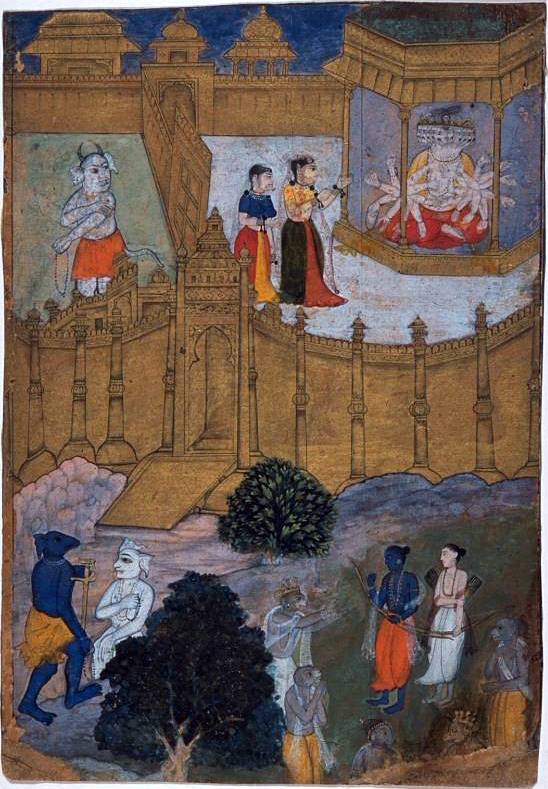
Mandodari approaches her husband Ravana while Rama and his allies convene outside the palace, from a manuscript of the Ramayana. Date: 1595-1605; commissioned by the Mughal emperor Akbar. Photo-credit: Asian Art Museum.
But alas! Today there is no Ramarajya in India. So how can we celebrate Diwali? Only those who have Rama within can celebrate this victory. For, God alone can illumine our souls and only that light is real light. The bhajan that was sung today emphasizes the poet’s desire to see God. Crowds of people go to see artificial illumination but what we need today is the light of love in our hearts. We must kindle the light of love within. Then only would we deserve congratulations. Today thousands are in acute distress. Can you, everyone of you, lay your hand on your heart and say that every sufferer, whether Hindu, Sikh or Muslim, is your own brother or sister? This is the test for you. Rama and Ravana are symbols of the unending struggle between the forces of good and evil. True light comes from within.
Today thousands are in acute distress. Can you, everyone of you, lay your hand on your heart and say that every sufferer, whether Hindu, Sikh or Muslim, is your own brother or sister? This is the test for you. Rama and Ravana are symbols of the unending struggle between the forces of good and evil. True light comes from within.
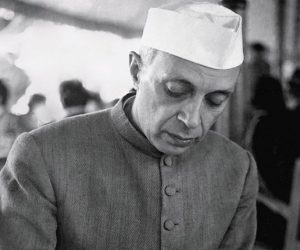
Pandit Jawaharlal Nehru
With what a sad heart has Pandit Jawaharlal Nehru returned after seeing wounded Kashmir! He was unable to attend the Working Committee meeting yesterday and also this afternoon. He has brought some flowers from Baramulla for me. I always cherish such gifts of nature. But today loot, arson and bloodshed have spoiled the beauty of that lovely land. Jawaharlal had been to Jammu also. There too all is not well.
Sardar Patel had to go to Junagadh at the request of Shri Shamaldas Gandhi and Dhebarbhai who had sought his advice. Both Jinnah and Bhutto are angry because they feel that the Indian Government has deceived them and is pressing Junagadh to accede to the Union.
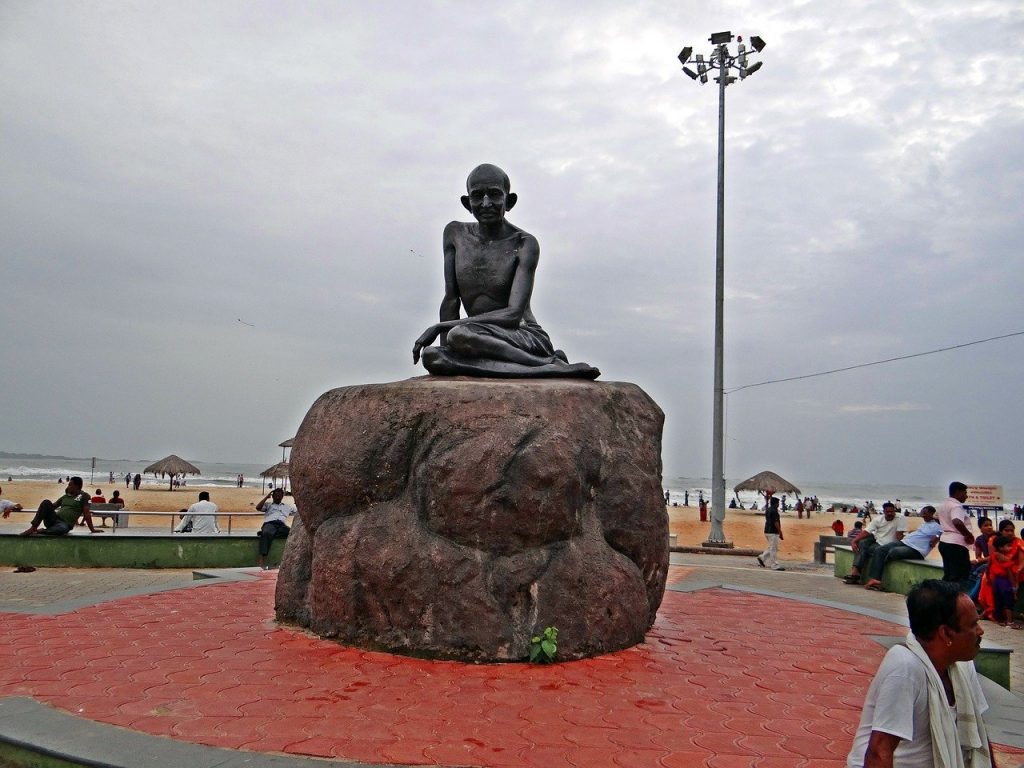
Mahatma Gandhi Statue at Malpe Beach, Udupi, Karnataka.
It is the duty of everyone to banish hatred and suspicion from his heart in order to establish peace and goodwill in the country. If you do not feel the presence of God within you and do not forget your petty internal quarrels, success in Kashmir or Junagadh would prove futile. Diwali cannot be celebrated till you bring back all the Muslims who have fled in fear. Pakistan also would not survive if it does not do likewise with the Hindus and Sikhs who have run away from there.
Tomorrow I shall tell you what I can about the Congress Working Committee. May you and all India be happy in the new year which begins on Thursday. May God illumine your hearts so that you can serve not only each other or India but the whole world.
Listen to Gandhi’s entire speech to an Independent India, on its first Diwali, here:
Gandhi’s speech to an independent India on its first Diwali, in 1947, and its abridged translation has been sourced from https://archive.org/. ‘How To Celebrate Diwali?’ and Gandhi’s note from 1931 was a part of a compilation of Gandhi’s speeches and writings in the book Hinduism According to Gandhi: Thoughts, Writings and Critical Interpretation. You can buy the book here.
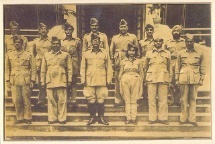
An excerpt from the book My Memories of I.N.A. and Its Netaji by Major General Shahnawaz Khan, where he documents how Bose formed the INA, inspired disillusioned Indian soldiers to revolt, and challenged British rule with Axis support.
Major General Shahnawaz Khan
__
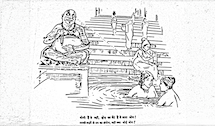
In the colonial period, the threat of the lecherous male gaze was used by the new patriarchy to restrict access to employment and public space for women, maintaining a patriarchal division of labour. Read how this process unfolded in our newest excerpt.
Saurav Kumar Rai
__
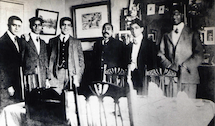
Was Lala Lajpat Rai's Hindu nationalism congruent with the principles of secularism? Explore our latest excerpt from Vanya Vaidehi Bhargav's fresh off-the-press book - Being Hindu, Being Indian: Lala Lajpat Rai's Ideas of Nation for more.
Vanya Vaidehi Bhargav
__
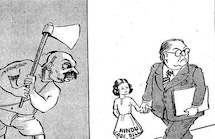
Popularly, we think that political cartoons question the powerful but what if this was not the case? What if political cartoons, replicated structures of the socially dominant? Read how in our new excerpt on political cartoons featuring Dr. Ambedkar.
Unnamati Syama Sundar
__

On Martyrs' day 2024, read the poet Sarojini Naidu's tribute to Gandhi given over All India Radio two days after his assassination.
Sarojini Naidu
__
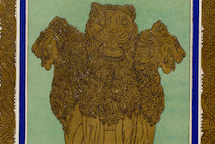
On Republic Day, the Indian History Collective presents you, twenty-two illustrations from the first illustrated manuscript (1954) of our Constitution.
Indian History Collective
__
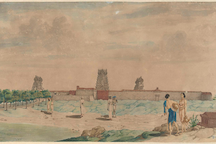
One of the key petitioners in the Ayodhya title dispute was Bhagwan Sri Ram Virajman. This petitioner was no mortal, but God Ram himself. How did Ram find his way from heaven to the Supreme Court of India to plead his case? Read further to find out.
Richard H Davis
__
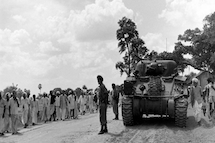
Labelled "one of the shortest, happiest wars ever seen", the integration of the princely state of Hyderabad in 1948 was anything but that. Read about the truth behind the creation of an Indian Union, the fault lines left behind, and what they signify
Afsar Mohammad
__
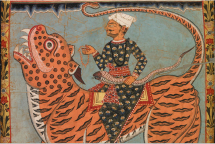
How did Bengal get a large Muslim population? Was it conversion by ruling elites was there something deeper at play? Read Dr. Eaton's classic essay to find out.
Richard Eaton
__
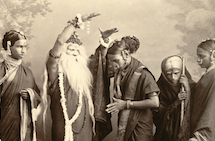
An excerpt from Shailaija Paik's new book 'Vulgarity of Caste' that documents the pivotal role Tamasha (the popular art form) has played in reinforcing and producing caste dynamics in Marathi society.
Shailaja Paik
__
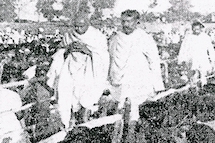
In 1942, two sub-districts in Bengal declared independence and set up a parallel government. The second part of our story brings you archival papers in the form of letters, newspaper reports, and judicial records documenting this remarkable movement.
Indian History Collective
__
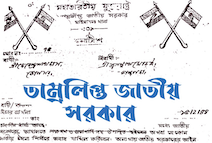
In 1942, five years before India was independent, two sub-divisions in Bengal not only declared their independence— they also instituted a parallel government. The first in a new series.
Indian History Collective
__
TIMELINE
-
2500 BC - Present 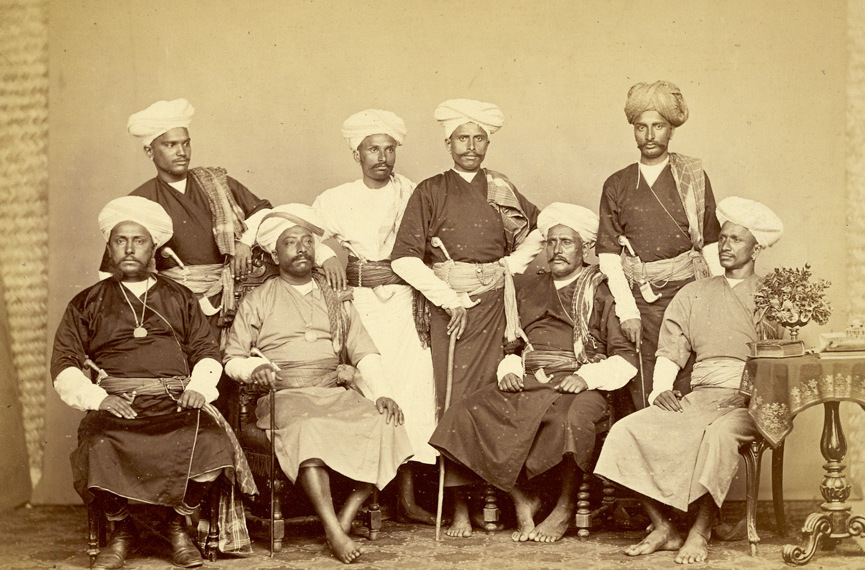
2500 BC - Present Tribal History: Looking for the Origins of the Kodavas -
2200 BC to 600 AD 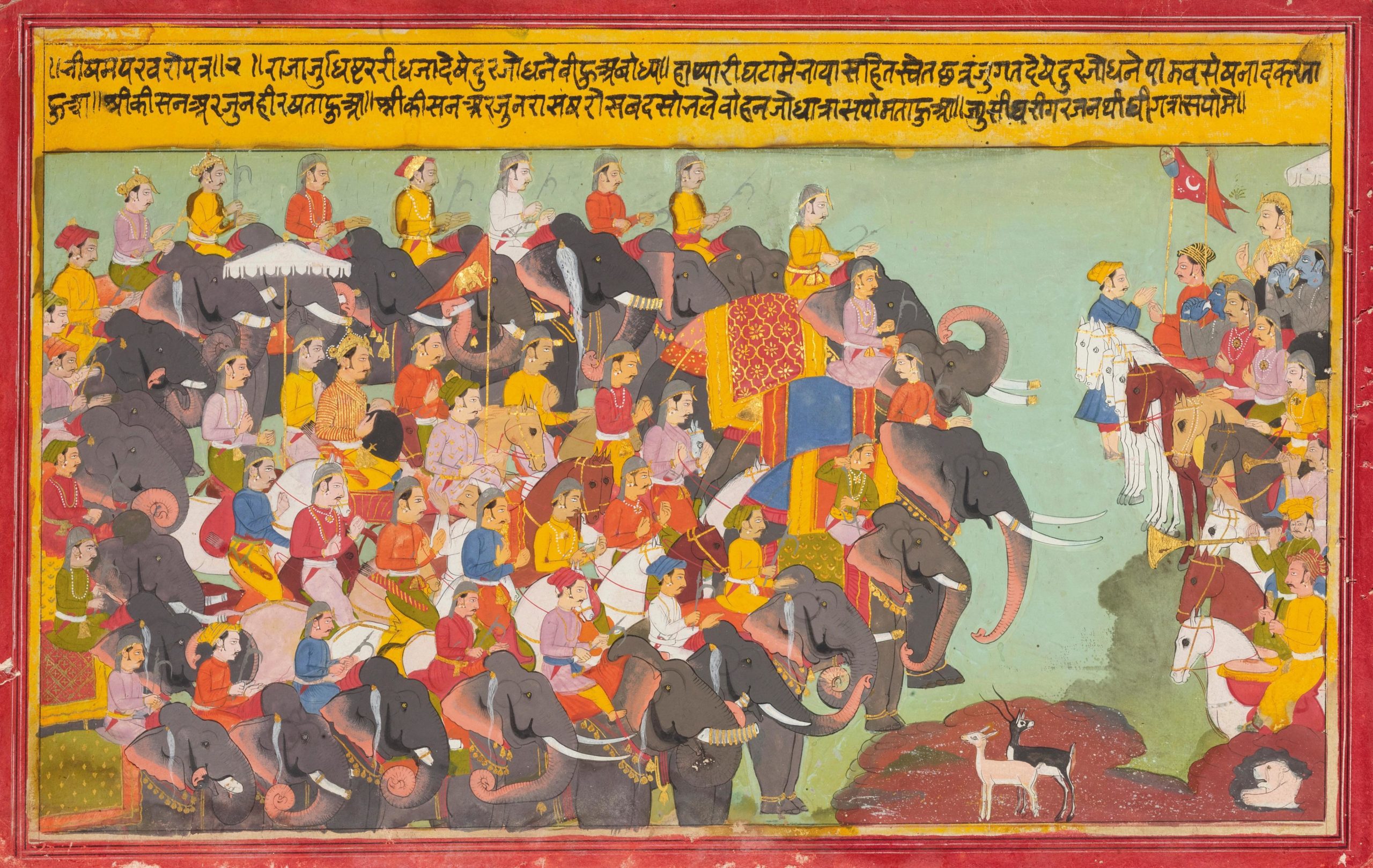
2200 BC to 600 AD War, Political Violence and Rebellion in Ancient India -
400 BC to 1001 AD 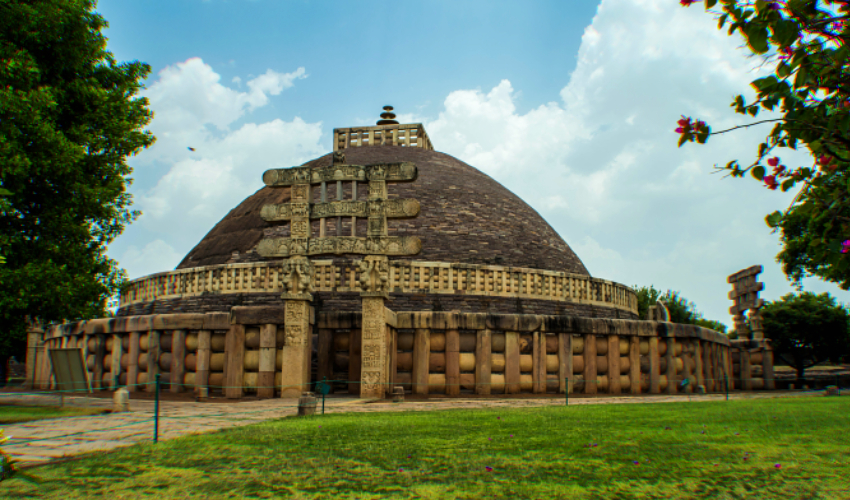
400 BC to 1001 AD The Dissent of the ‘Nastika’ in Early India -
600CE-1200CE 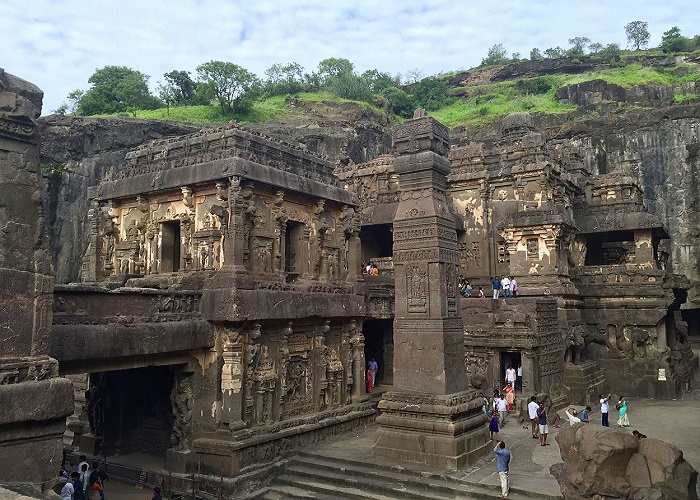
600CE-1200CE The Other Side of the Vindhyas: An Alternative History of Power -
c. 700 - 1400 AD 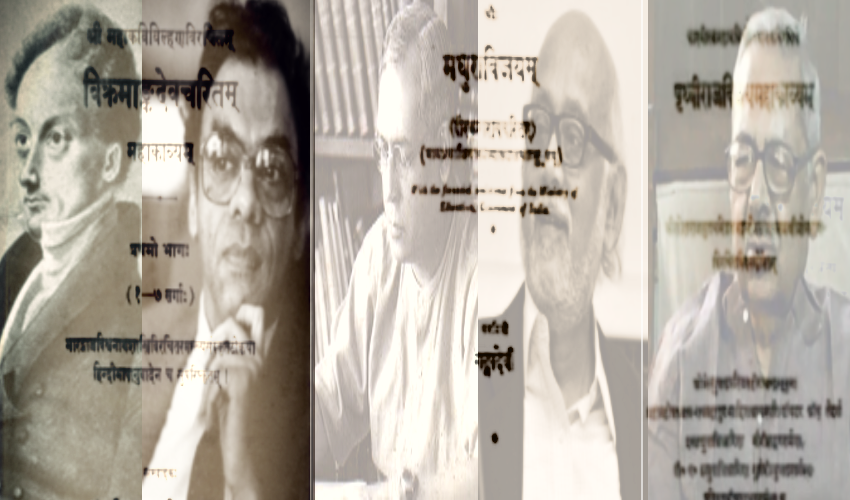
c. 700 - 1400 AD A Historian Recommends: Representing the ‘Other’ in Indian History -
c. 800 - 900 CE 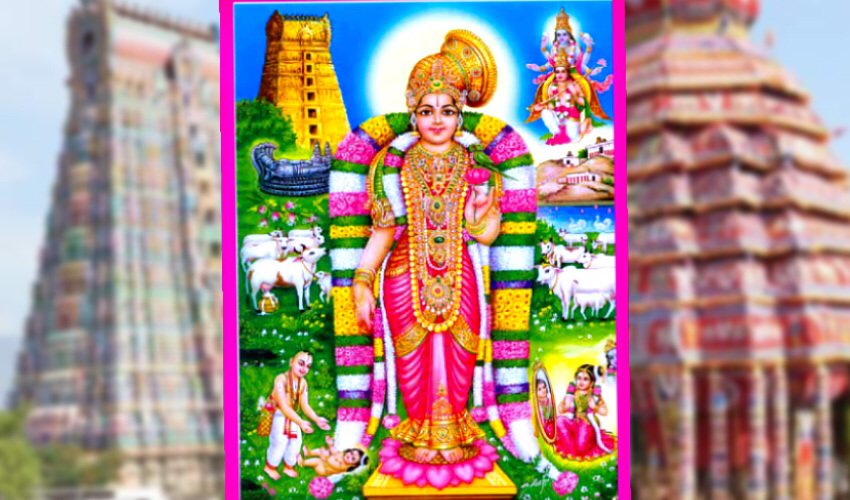
c. 800 - 900 CE ‘Drape me in his scent’: Female Sexuality and Devotion in Andal, the Goddess -
1192 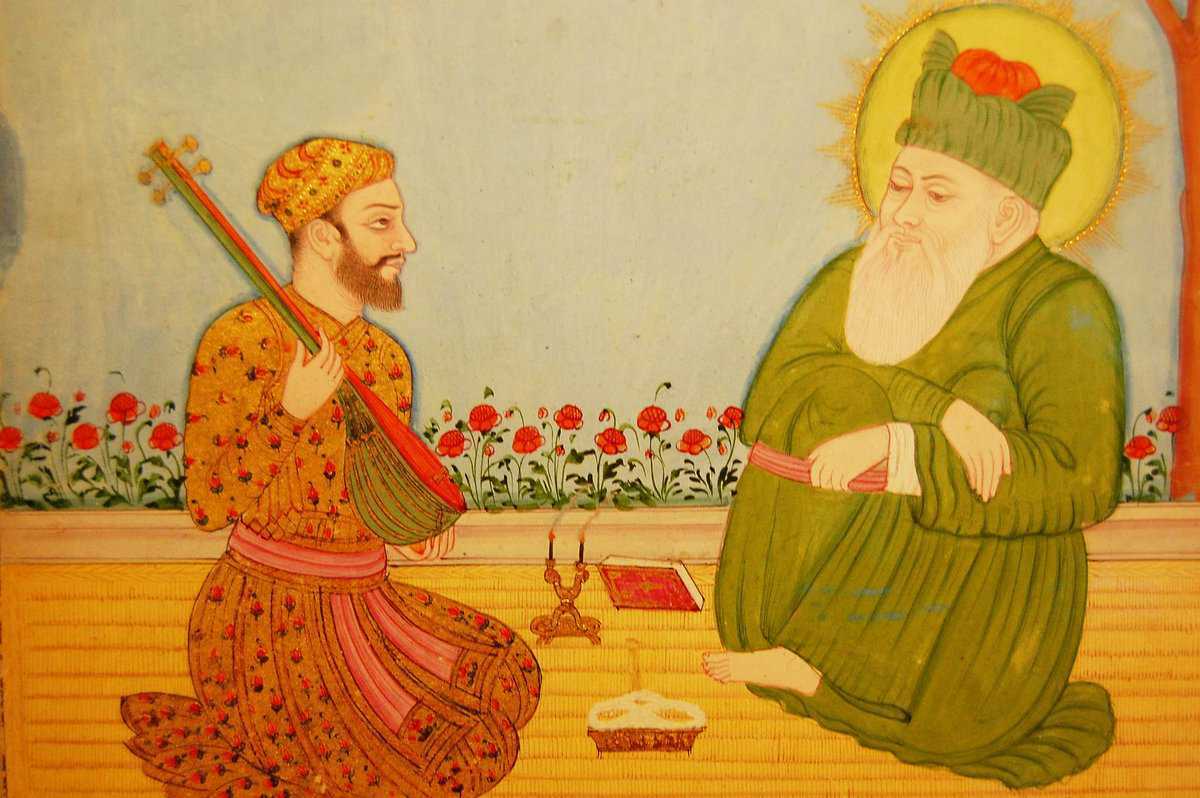
1192 Sufi Silsilahs: The Mystic Orders in India -
1200 - 1850 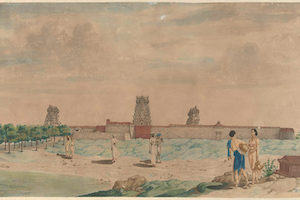
1200 - 1850 Temples, deities, and the law. -
c. 1500 - 1600 AD 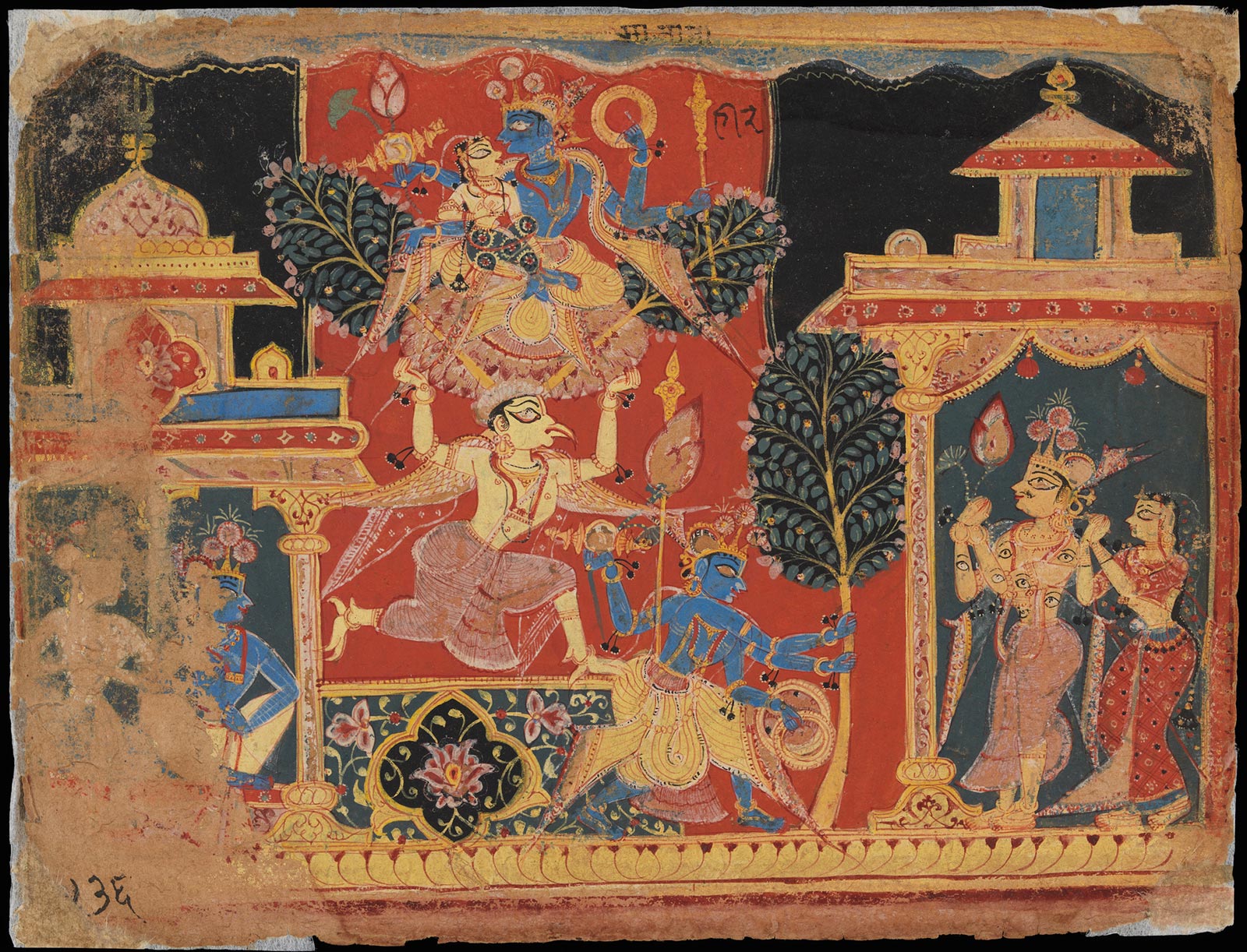
c. 1500 - 1600 AD A Historian Recommends: Religion in Mughal India -
1200-2020 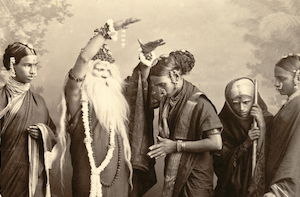
1200-2020 Policing Untouchables and Producing Tamasha in Maharashtra -
1530-1858 
1530-1858 Rajputs, Mughals and the Handguns of Hindustan -
1575 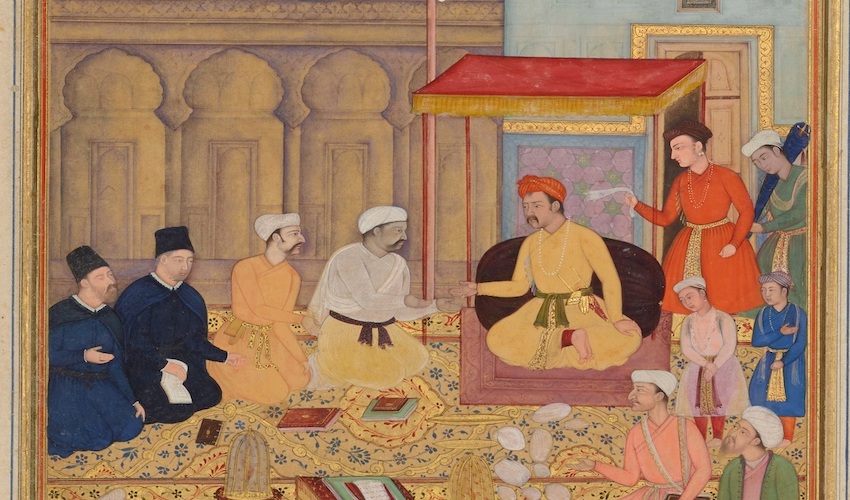
1575 Abdul Qadir Badauni & Abul Fazl: Two Mughal Intellectuals in King Akbar‘s Court -
1579 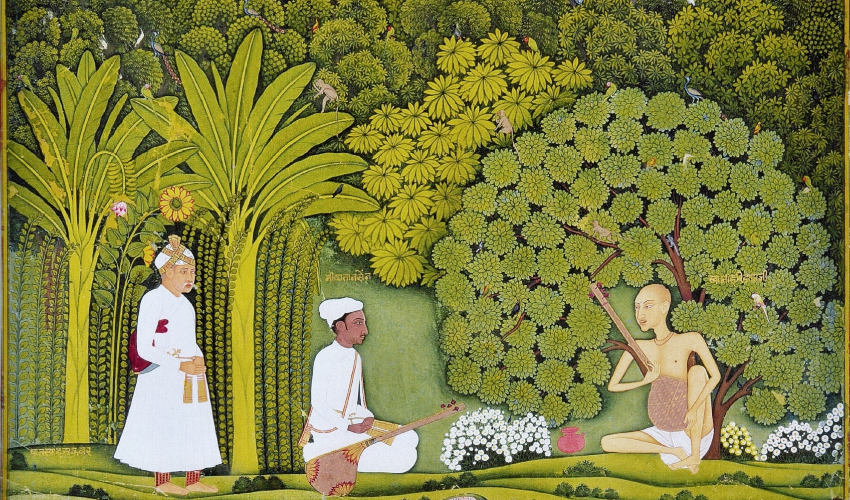
1579 Padshah-i Islam -
1550-1800 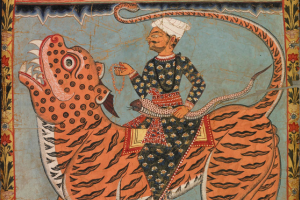
1550-1800 Who are the Bengal Muslims? : Conversion and Islamisation in Bengal -
c. 1600 CE-1900 CE 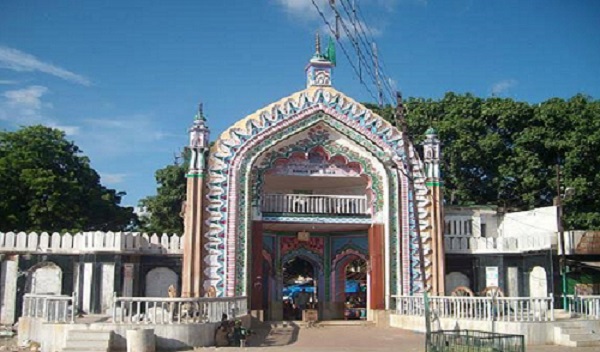
c. 1600 CE-1900 CE The Birth of a Community: UP’s Ghazi Miyan and Narratives of ‘Conquest’ -
1553 - 1900 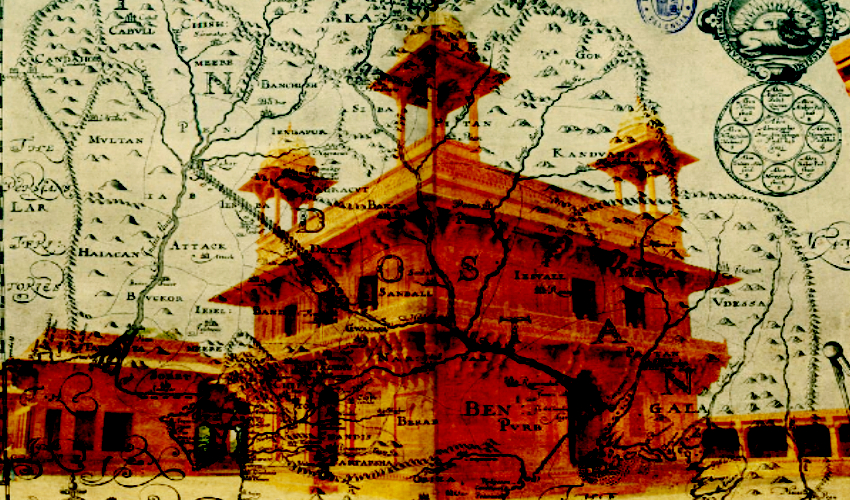
1553 - 1900 What Happened to ‘Hindustan’? -
1630-1680 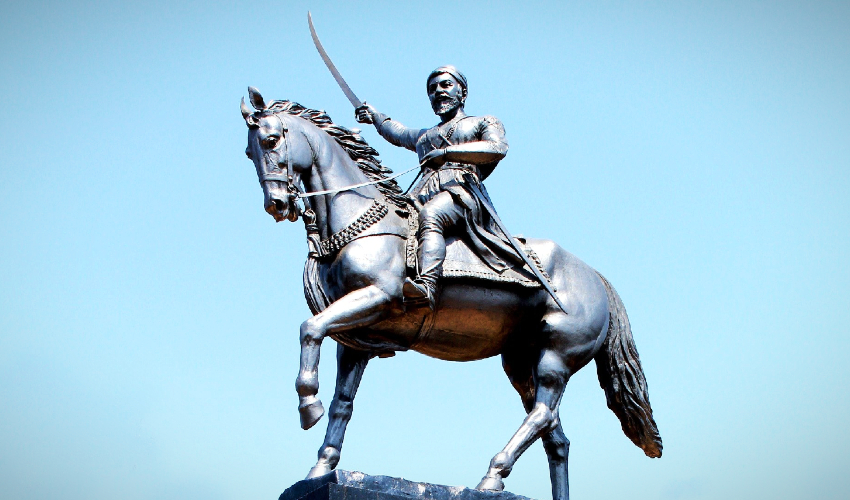
1630-1680 Shivaji: Hindutva Icon or Secular Nationalist? -
1630 -1680 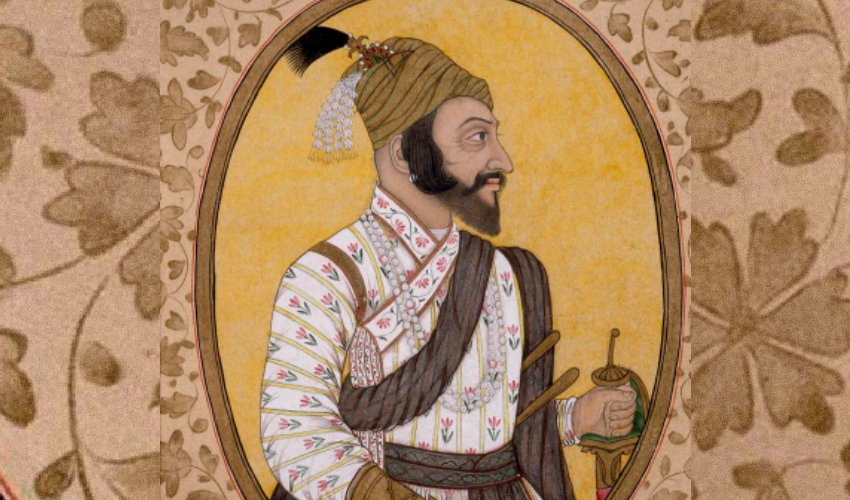
1630 -1680 Shivaji: His Legacy & His Times -
c. 1724 – 1857 A.D. 
c. 1724 – 1857 A.D. Bahu Begum and the Gendered Struggle for Power -
1818 - Present 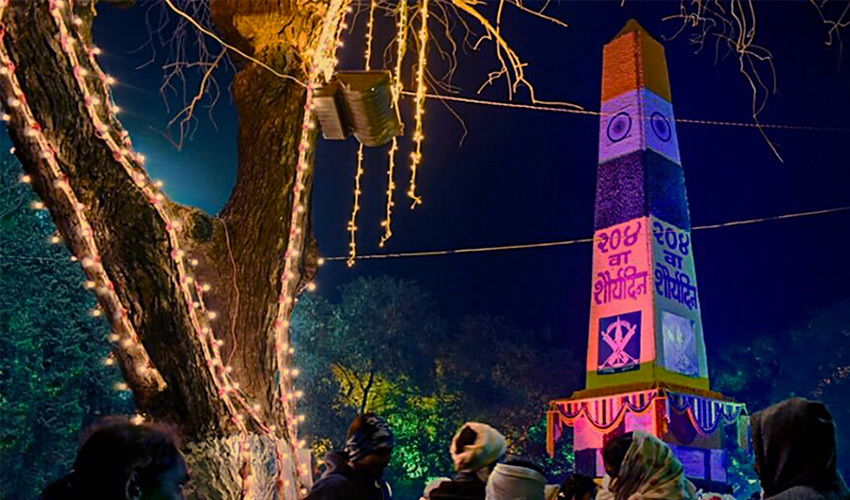
1818 - Present The Contesting Memories of Bhima-Koregaon -
1831 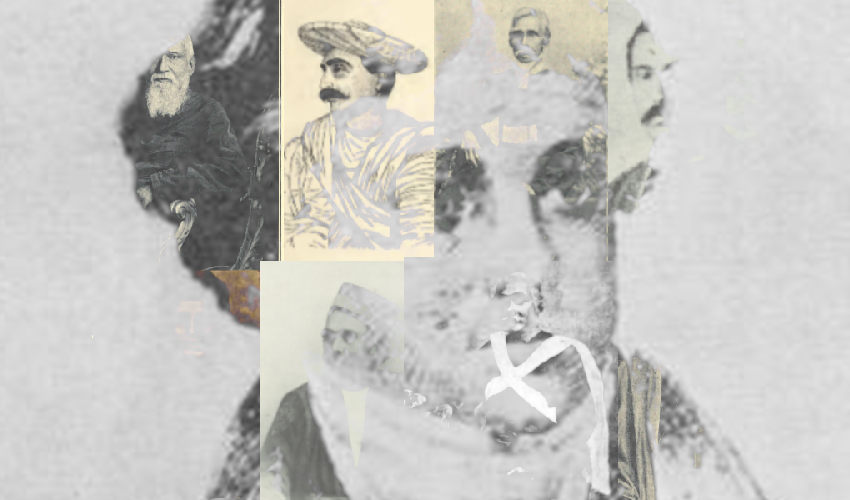
1831 The Derozians’ India -
1855 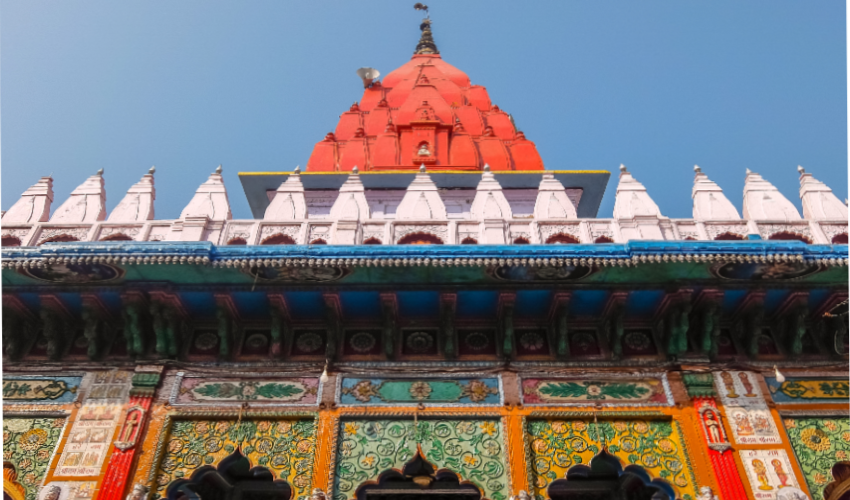
1855 Ayodhya 1855 -
1856 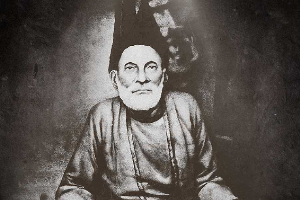
1856 “Worshipping the dead is not an auspicious thing” — Ghalib -
1857 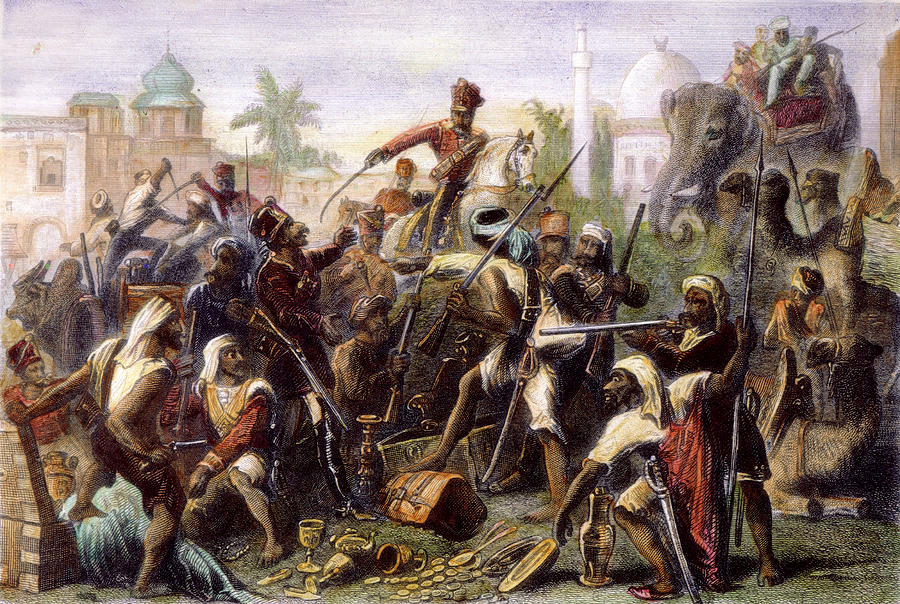
1857 A Subaltern speaks: Dalit women’s counter-history of 1857 -
1858 - 1976 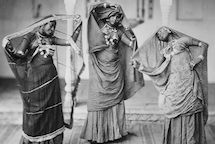
1858 - 1976 Lifestyle as Resistance: The Curious Case of the Courtesans of Lucknow -
1883 - 1894 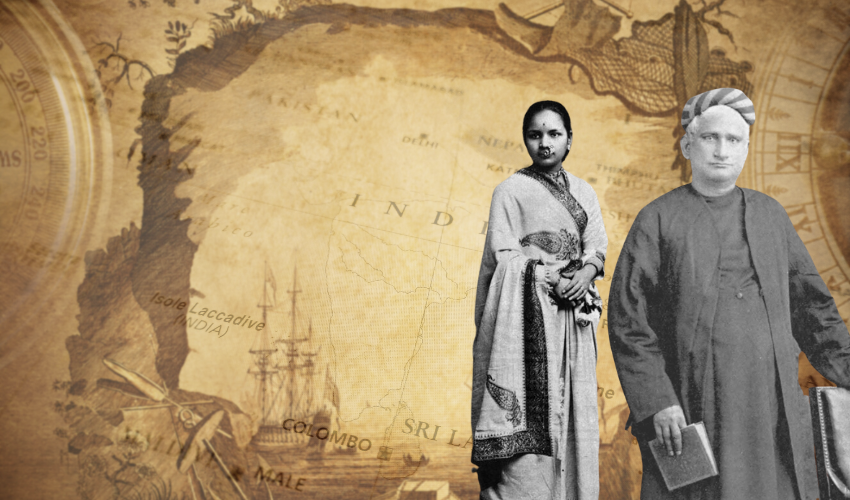
1883 - 1894 The Sea Voyage Question: A Nineteenth century Debate -
1887 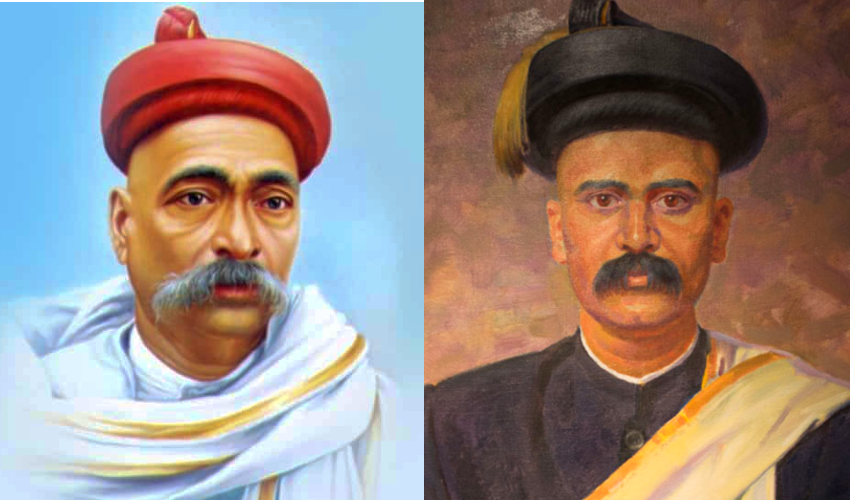
1887 The Great Debaters: Tilak Vs. Agarkar -
1893-1946 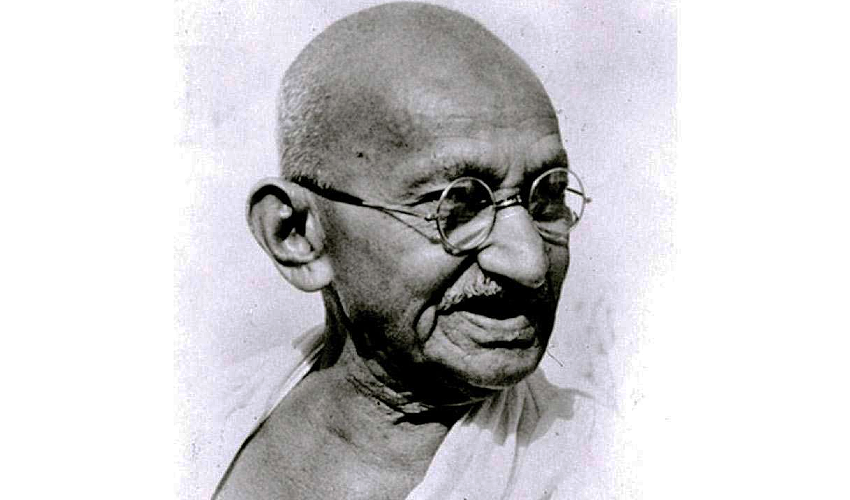
1893-1946 A Historian Recommends: Gandhi Vs. Caste -
1897 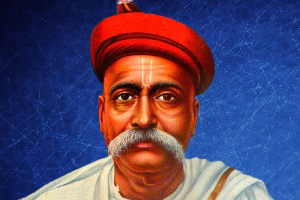
1897 Queen Empress vs. Bal Gangadhar Tilak: An Autopsy -
1913 - 1916 Modern Review 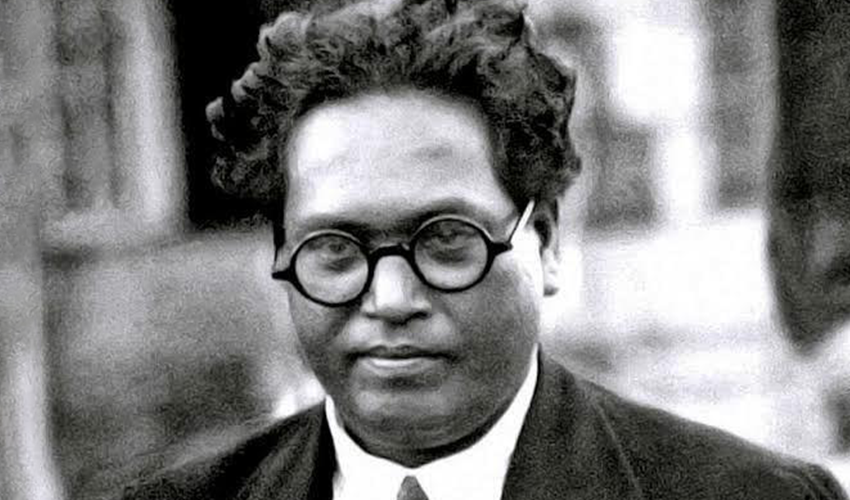
1913 - 1916 A Young Ambedkar in New York -
1916 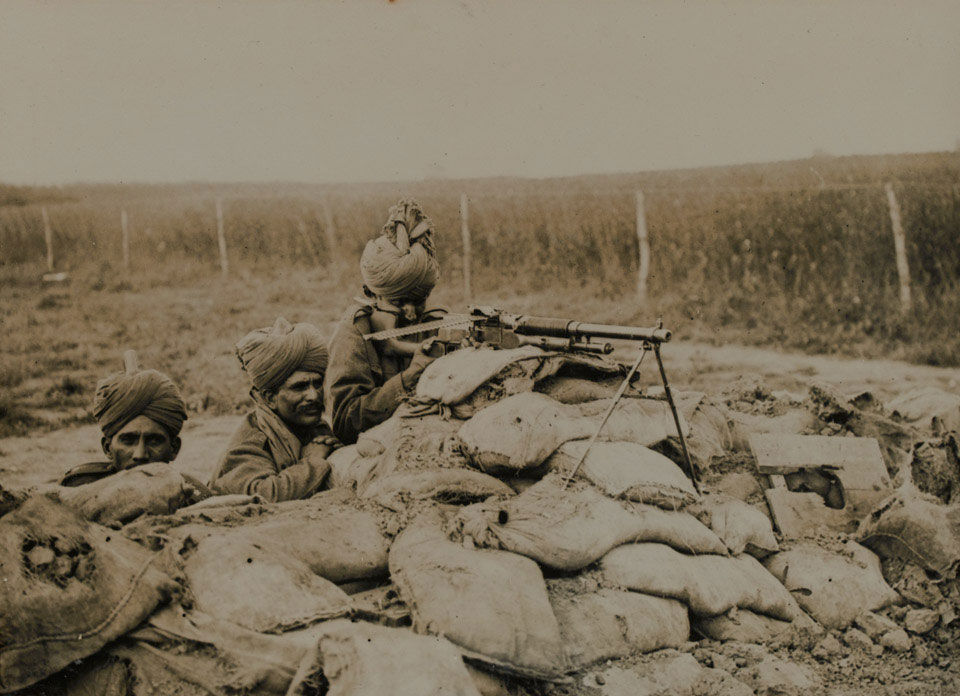
1916 A Rare Account of World War I by an Indian Soldier -
1917 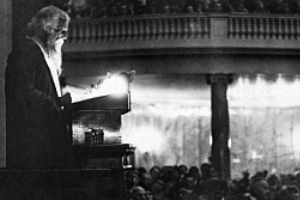
1917 On Nationalism, by Tagore -
1918 - 1919 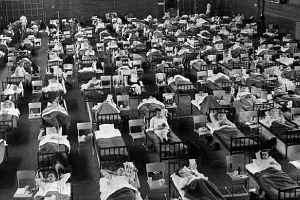
1918 - 1919 What Happened to the Virus That Caused the World’s Deadliest Pandemic? -
1920 - 1947 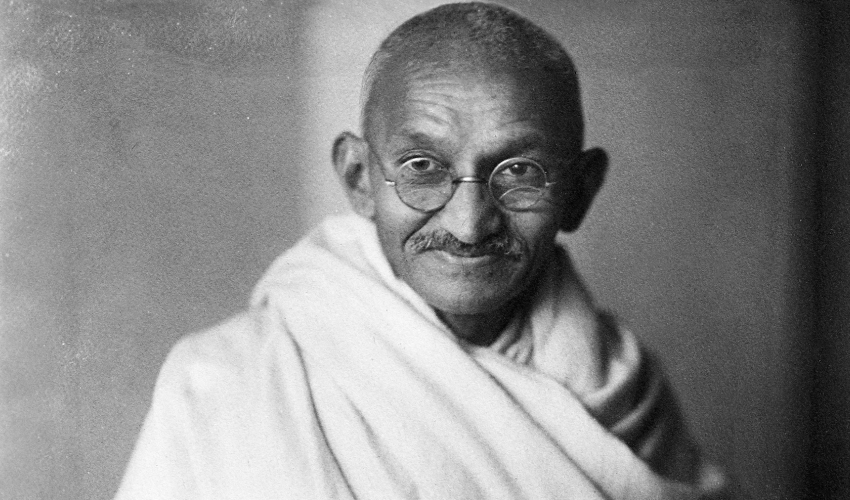
1920 - 1947 How One Should Celebrate Diwali, According to Gandhi -
1921 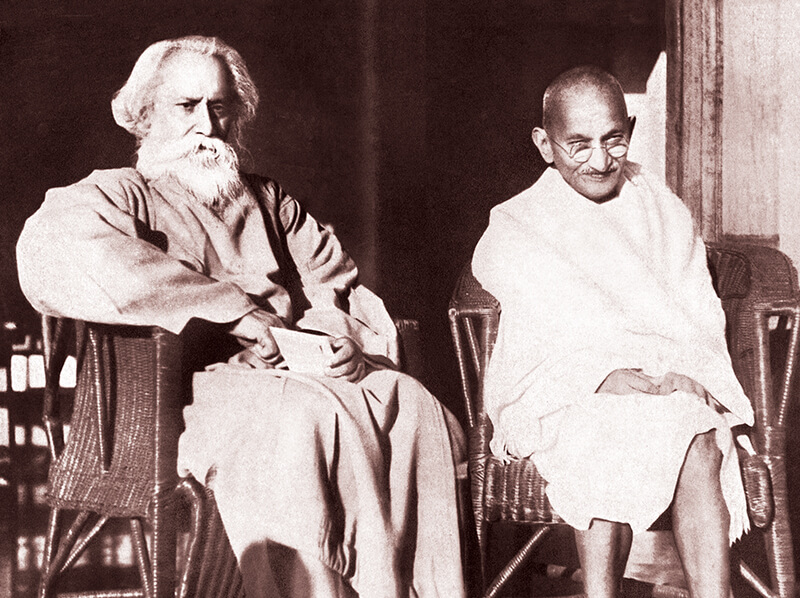
1921 Great Debates: Tagore Vs. Gandhi (1921) -
1921 - 2015 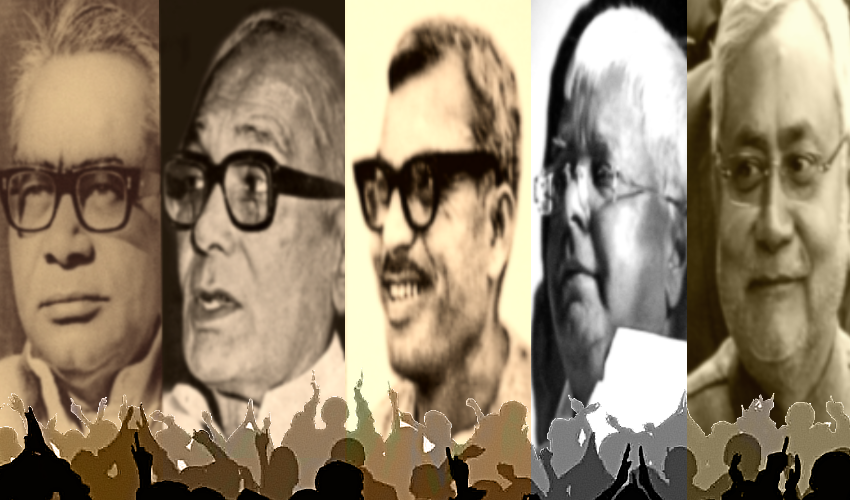
1921 - 2015 A History of Caste Politics and Elections in Bihar -
1915-1921 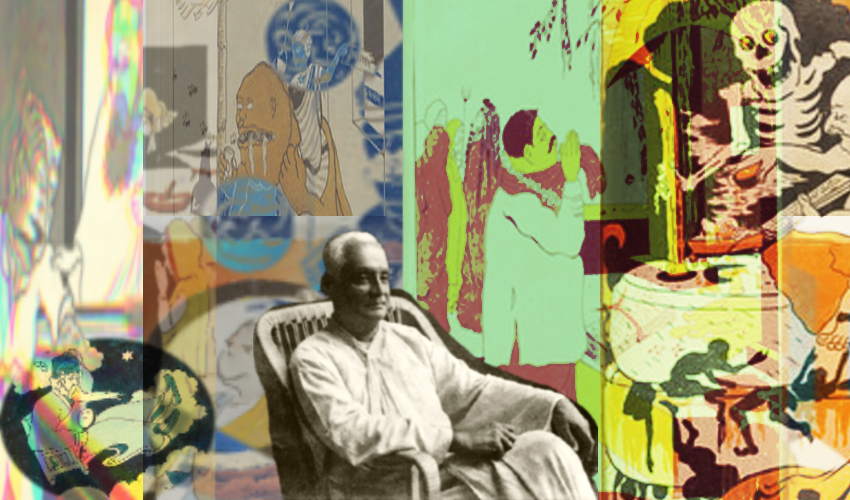
1915-1921 The Satirical Genius of Gaganendranath Tagore -
1924-1937 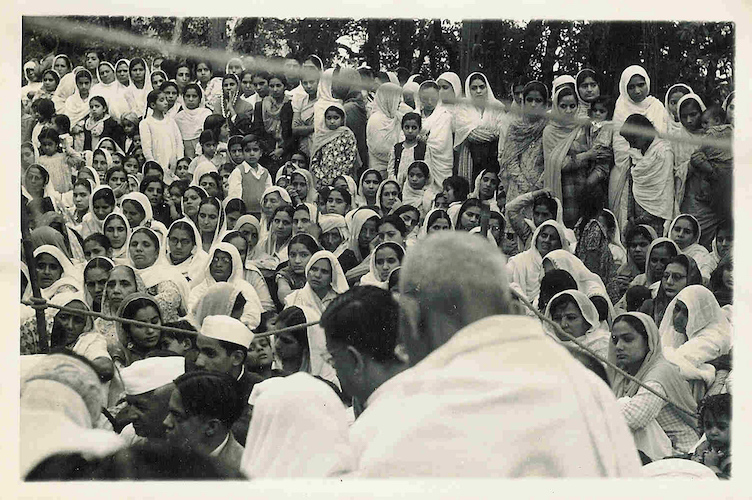
1924-1937 What were Gandhi’s Views on Religious Conversion? -
1900-1950 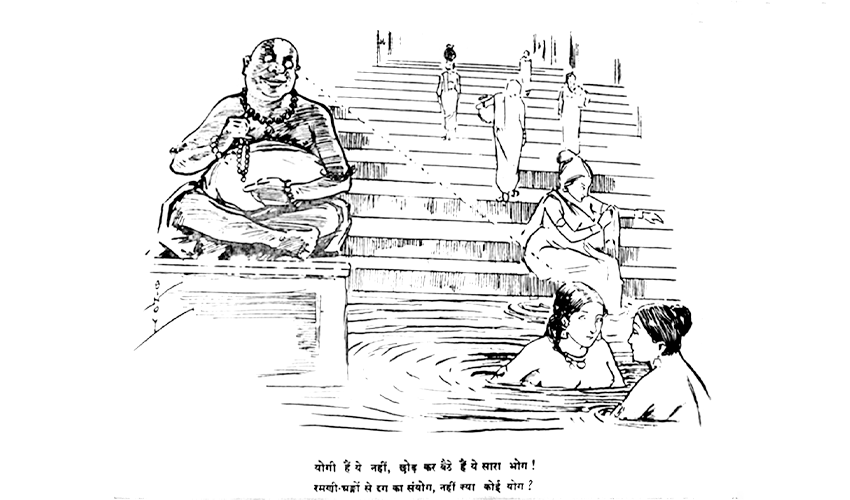
1900-1950 Gazing at the Woman’s Body: Historicising Lust and Lechery in a Patriarchal Society -
1925, 1926 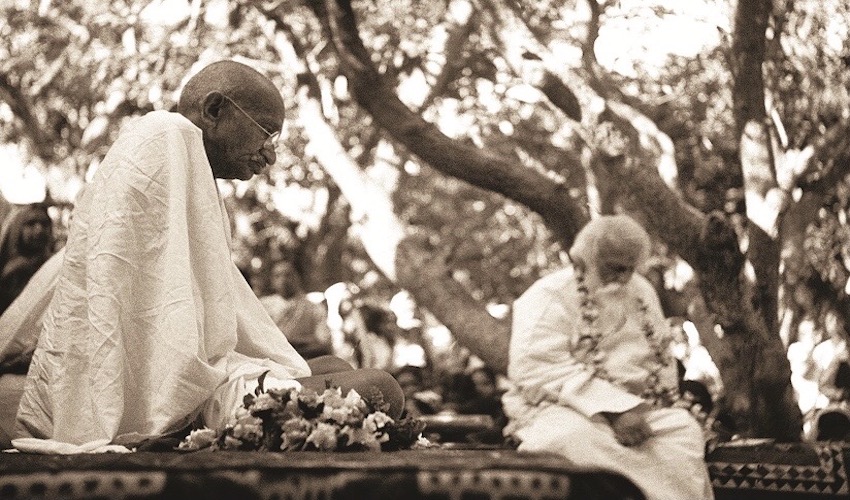
1925, 1926 Great Debates: Tagore vs Gandhi (1925-1926) -
1928 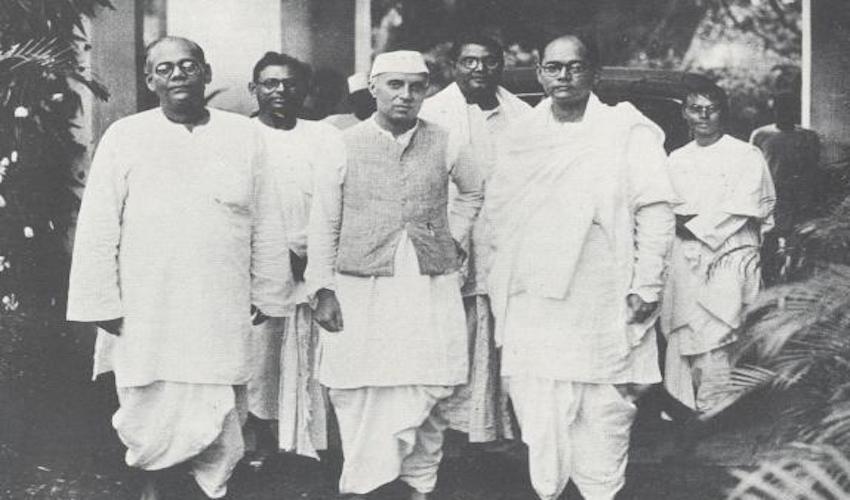
1928 Bhagat Singh’s dilemma: Nehru or Bose? -
1930 Modern Review 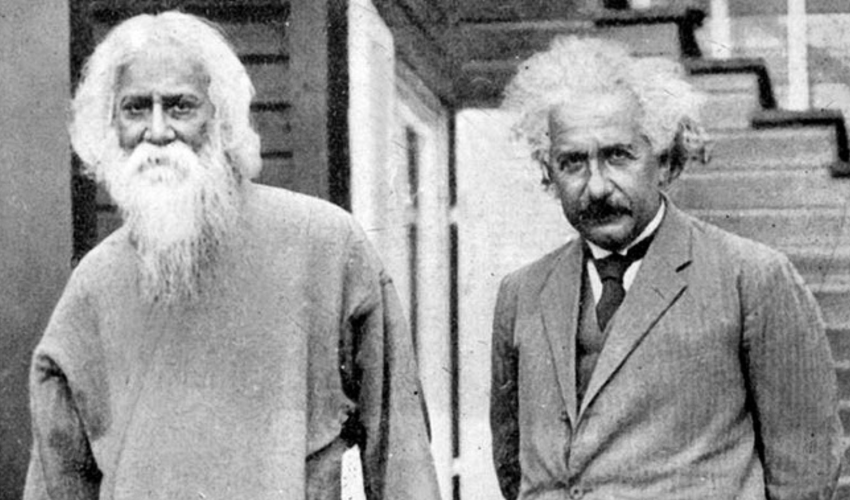
1930 The Modern Review Special: On the Nature of Reality -
1932 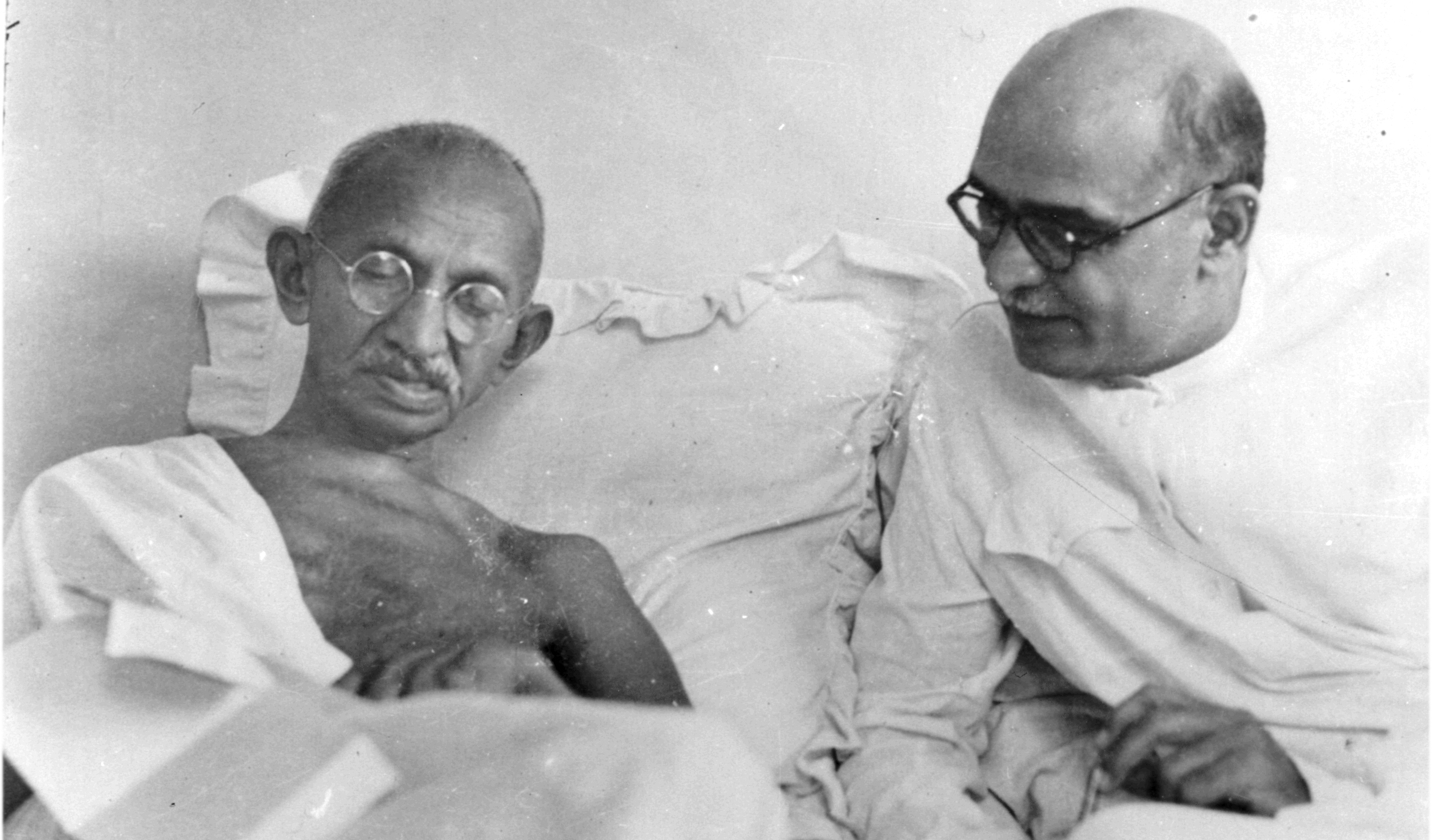
1932 Caste, Gandhi and the Man Beside Gandhi -
1933 - 1991 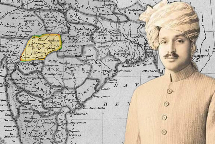
1933 - 1991 Raghubir Sinh: The Prince Who Would Be Historian -
1935 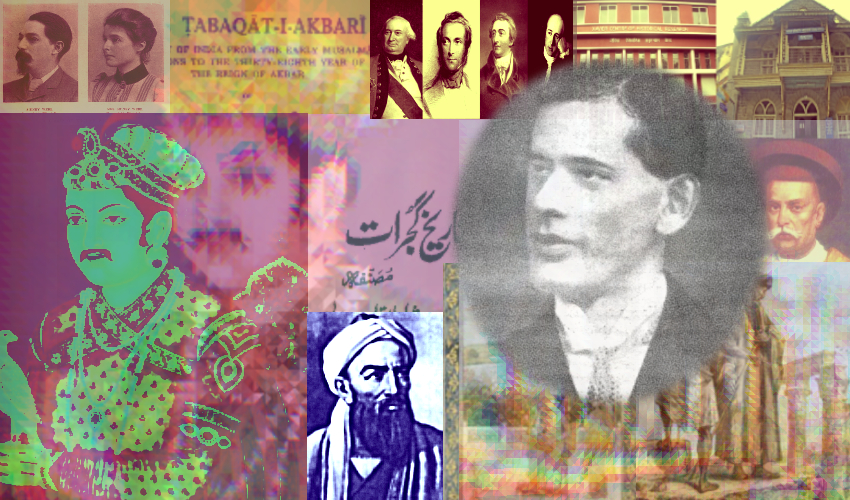
1935 A Historian Recommends: SA Khan’s Timeless Presidential Address -
1865-1928 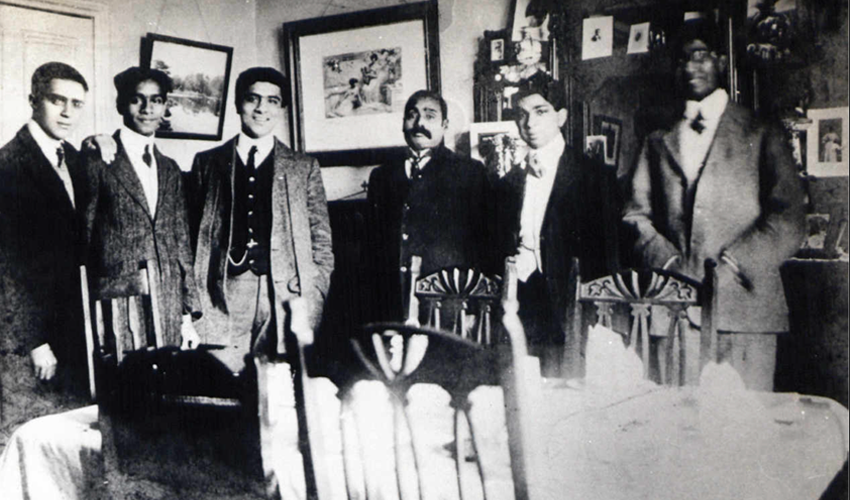
1865-1928 Understanding Lajpat Rai’s Hindu Politics and Secularism -
1935 Modern Review 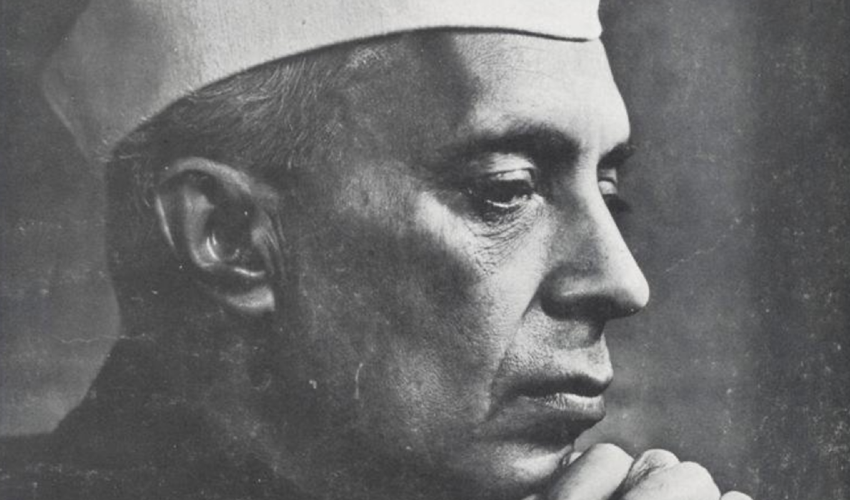
1935 The Modern Review Special: The Mind of a Judge -
1936 Modern Review 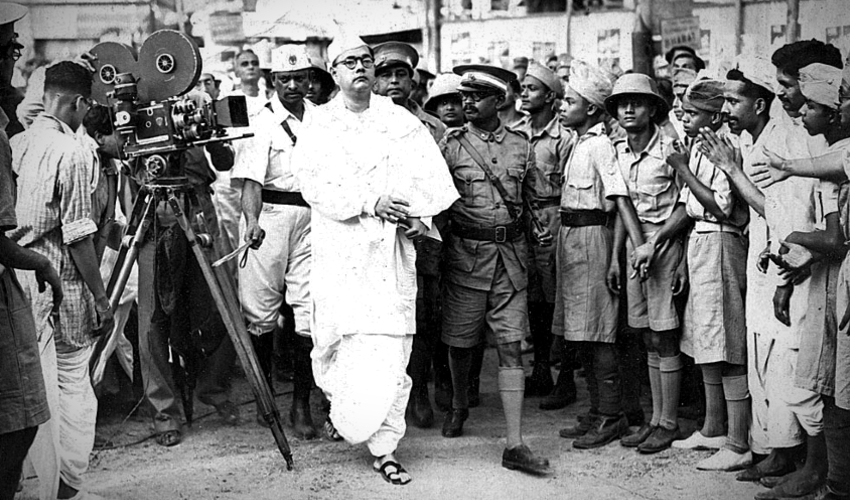
1936 The Modern Review Special: When Netaji Subhas Bose Was Wrongfully Detained for ‘Terrorism’ -
1936 
1936 Annihilation of Caste: Part 1 -
1936 Modern Review 
1936 The Modern Review Special: An Indian MP in the British Parliament -
1936 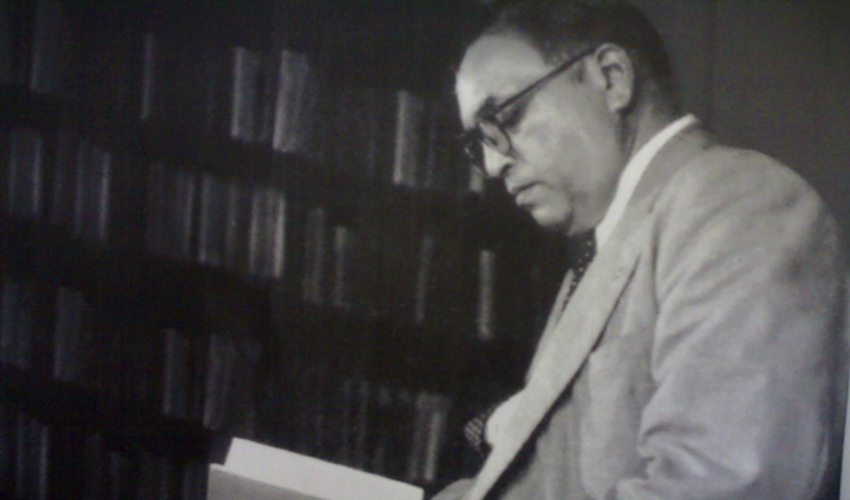
1936 Annihilation of Caste: Part 2 -
1936 
1936 A Reflection of His Age: Munshi Premchand on the True Purpose of Literature -
1936 Modern Review 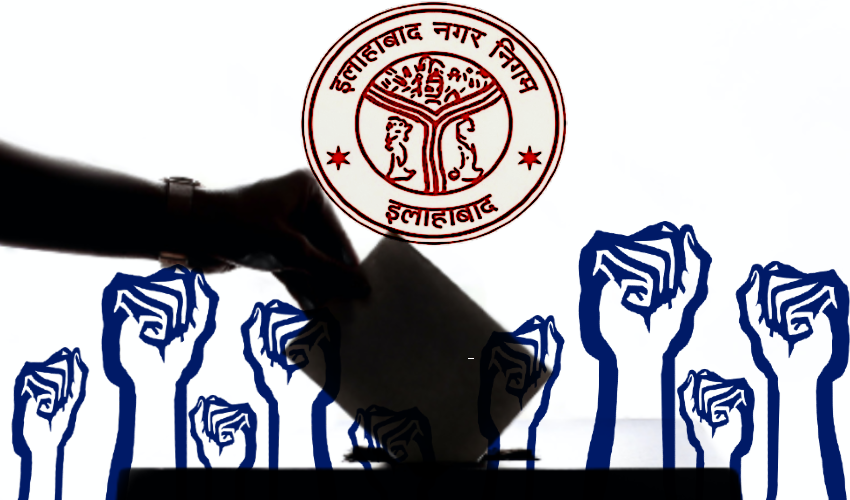
1936 The Modern Review Special: The Defeat of a Dalit Candidate in a 1936 Municipal Election -
1937 Modern Review 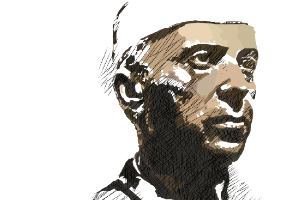
1937 The Modern Review Special: Rashtrapati -
1938 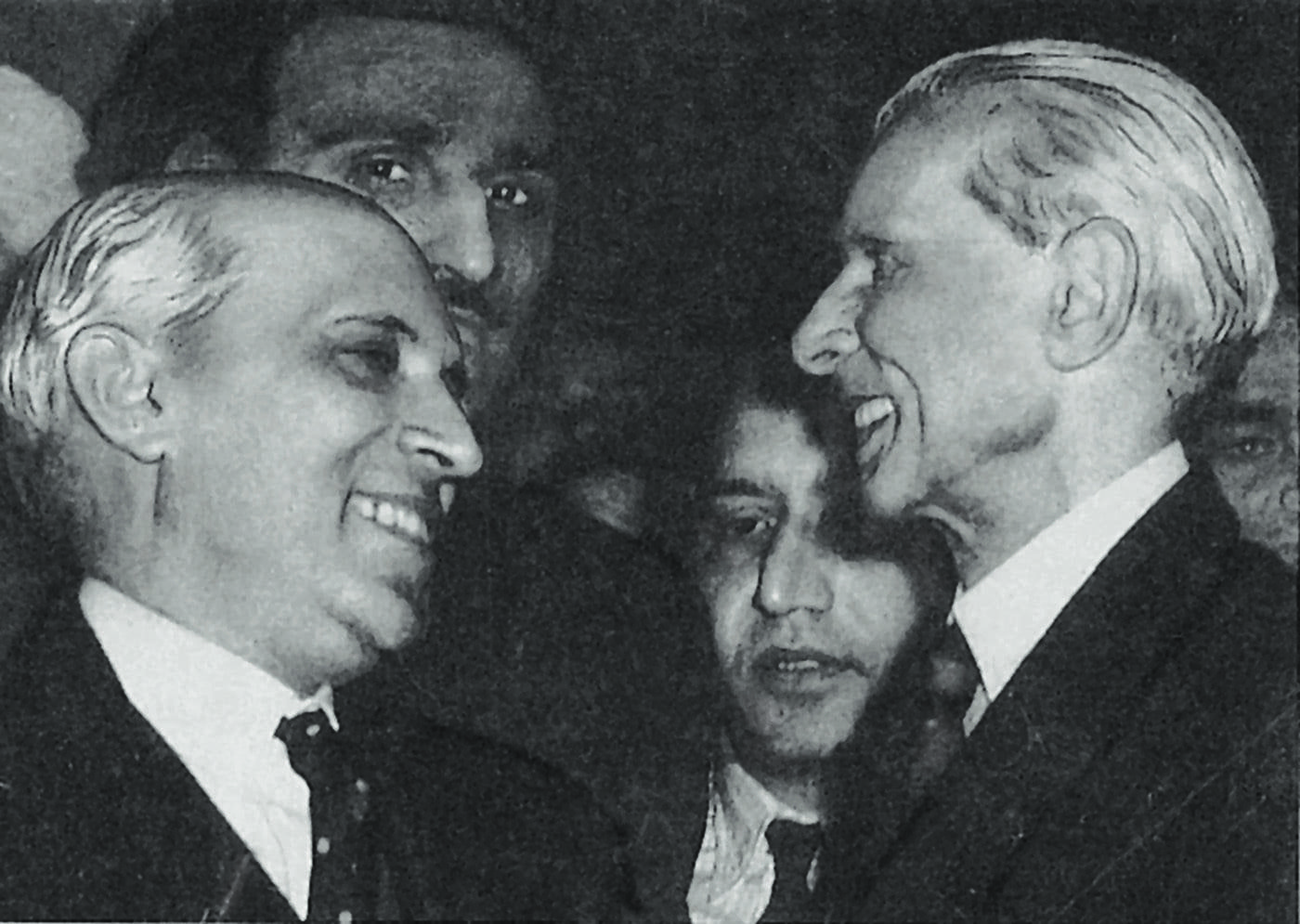
1938 Great Debates: Nehru Vs. Jinnah (1938) -
1942 Modern Review 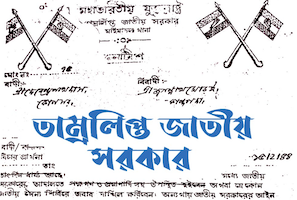
1942 IHC Uncovers: A Parallel Government In British India (Part 1) -
1943-1945 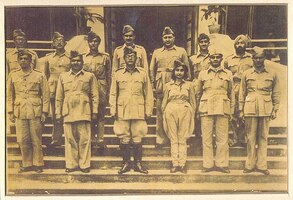
1943-1945 Origin Of The Azad Hind Fauj -
1942-1945 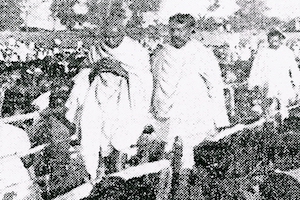
1942-1945 IHC Uncovers: A Parallel Government in British India (Part 2) -
1946 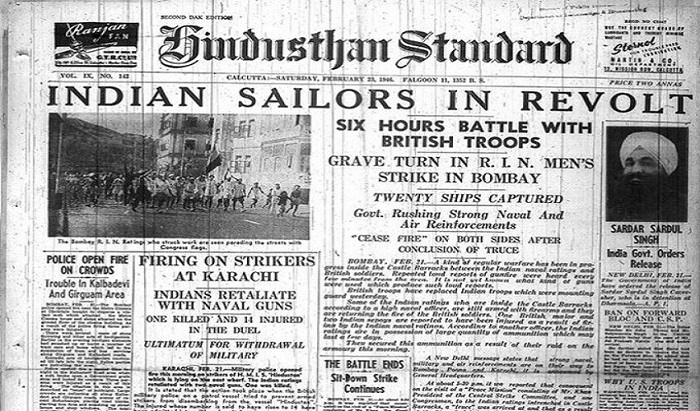
1946 Our Last War of Independence: The Royal Indian Navy Mutiny of 1946 -
1946 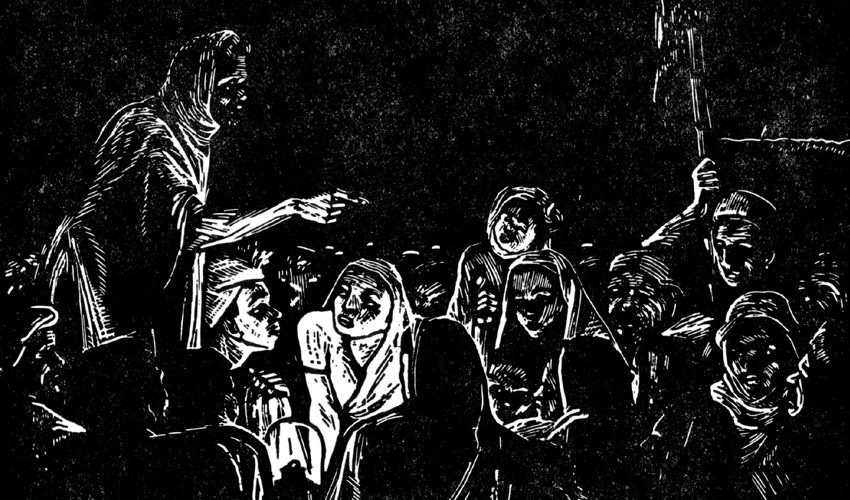
1946 An Artist’s Account of the Tebhaga Movement in Pictures And Prose -
1946 – 1947 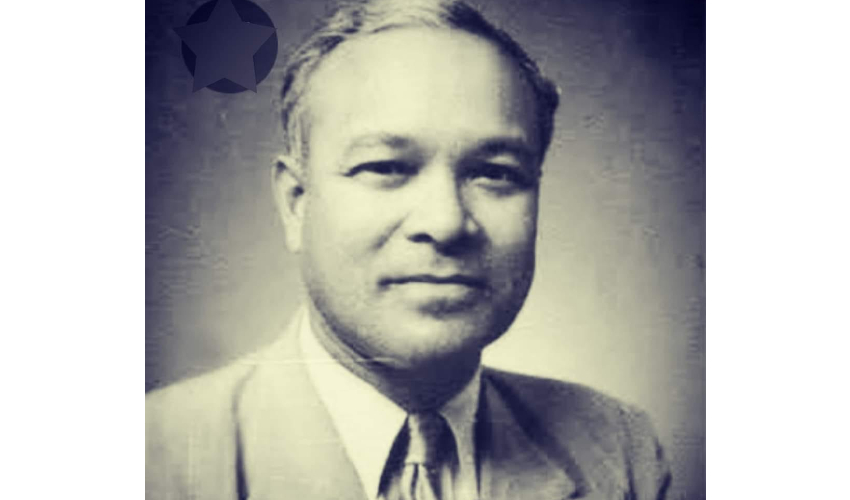
1946 – 1947 “The Most Democratic People on Earth” : An Adivasi Voice in the Constituent Assembly -
1946-1947 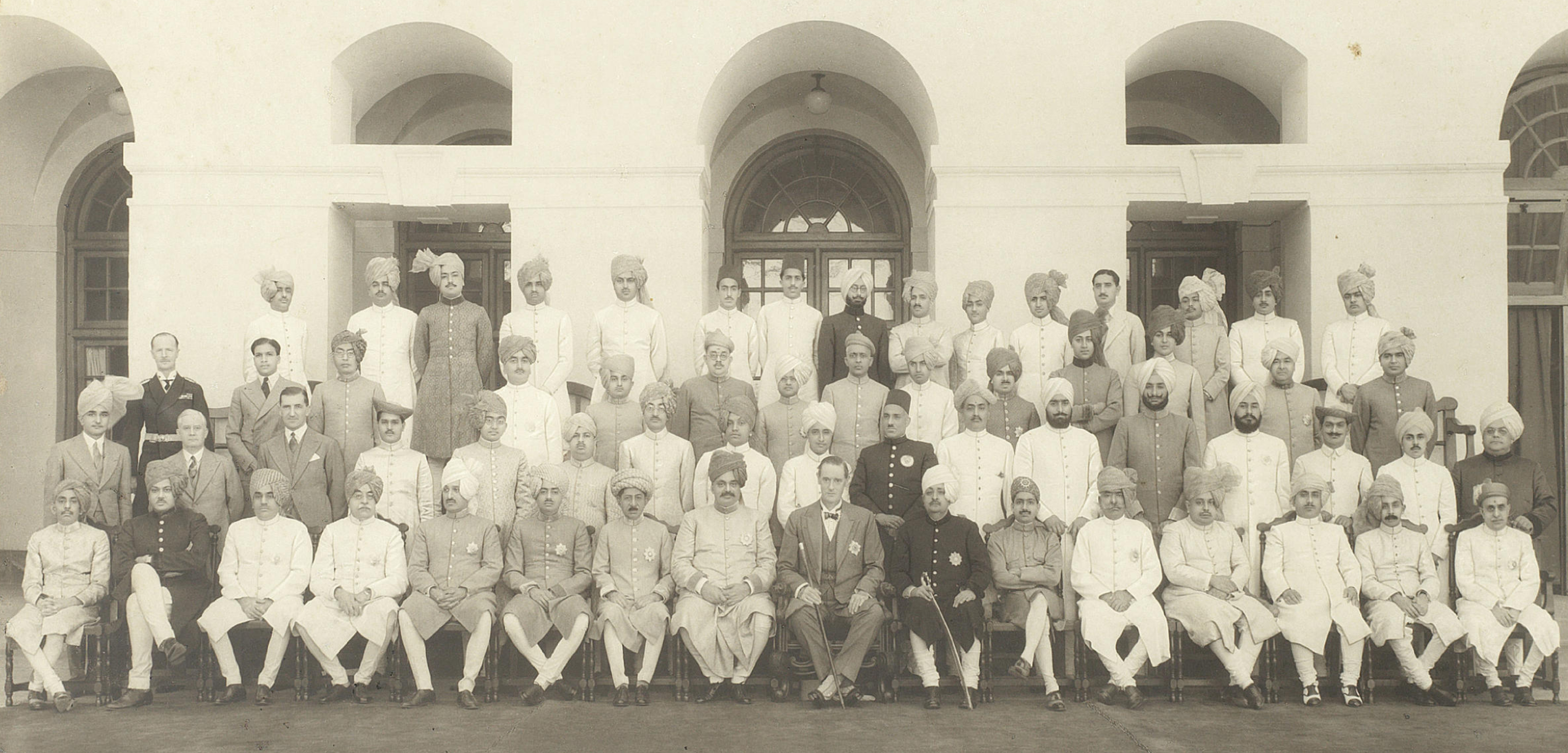
1946-1947 VP Menon and the Birth of Independent India -
1916 - 1947 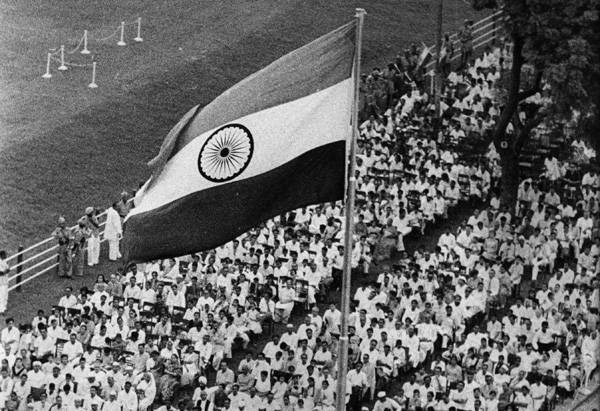
1916 - 1947 8 @ 75: 8 Speeches Independent Indians Must Read -
1947-1951 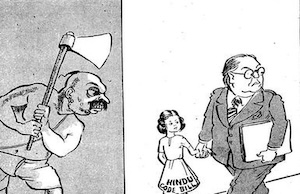
1947-1951 Ambedkar Cartoons: The Joke’s On Us -
1948 
1948 “My Father, Do Not Rest” -
1940-1960 
1940-1960 Integration Myth: A Silenced History of Hyderabad -
1948 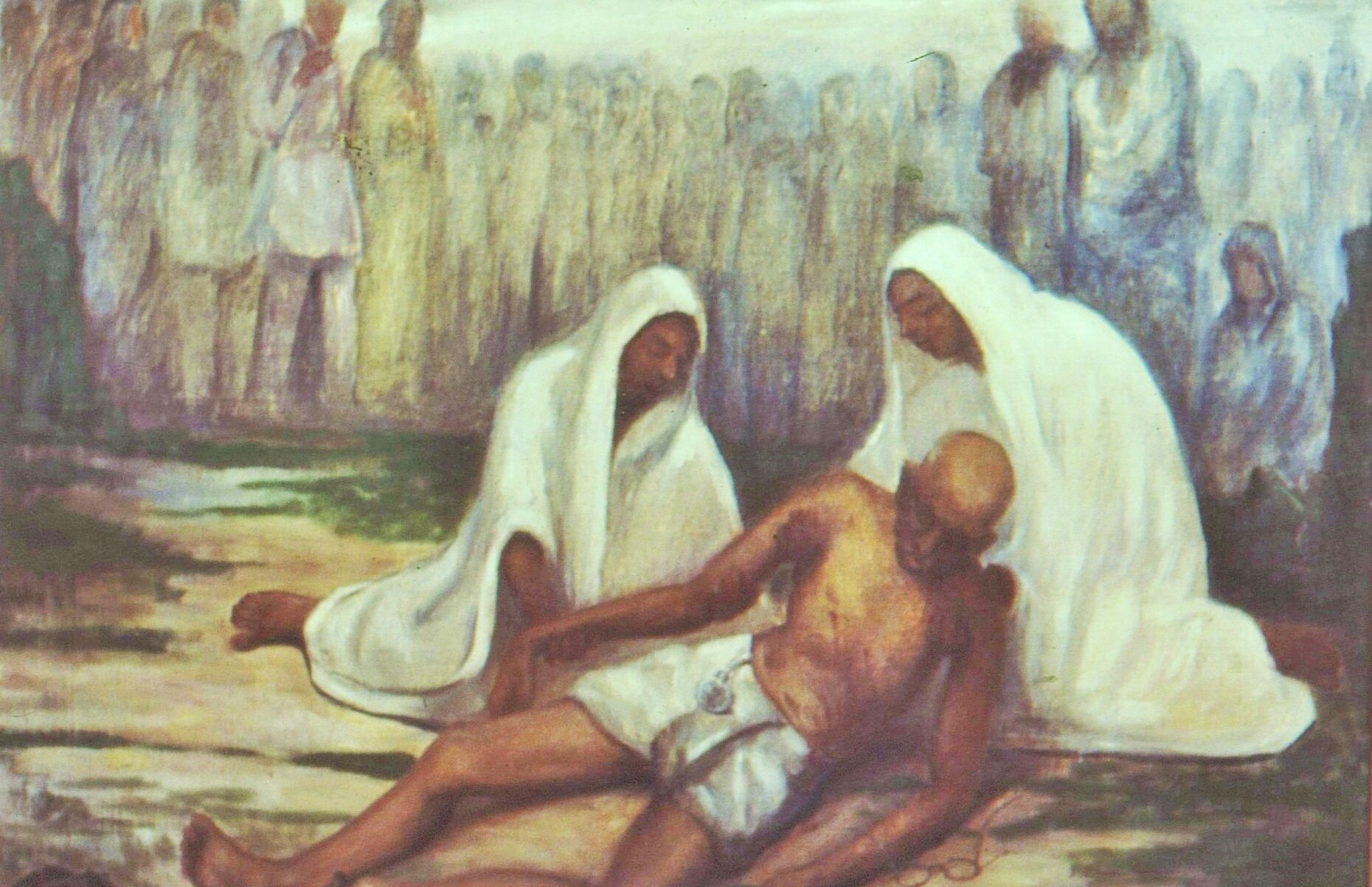
1948 The Assassination of a Mahatma, the Princely States and the ‘Hindu’ Nation -
1949 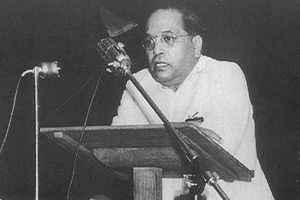
1949 Ambedkar warns against India becoming a ‘Democracy in Form, Dictatorship in Fact’ -
1950 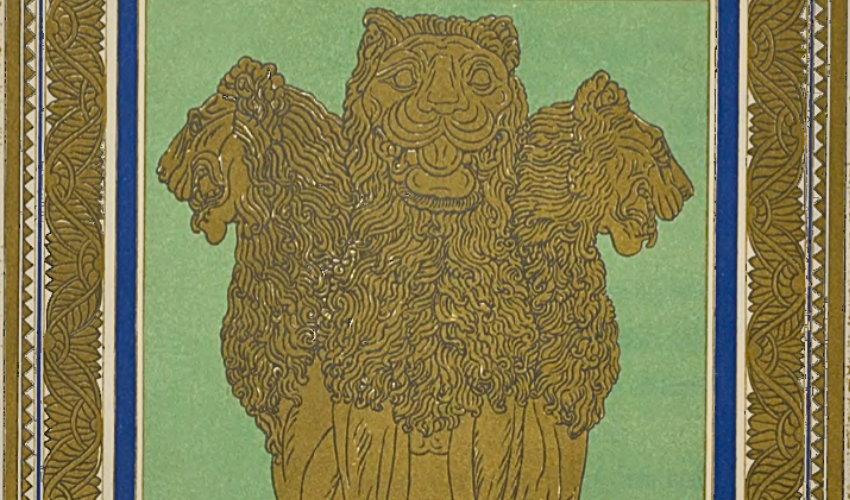
1950 Illustrations from the constitution -
1951 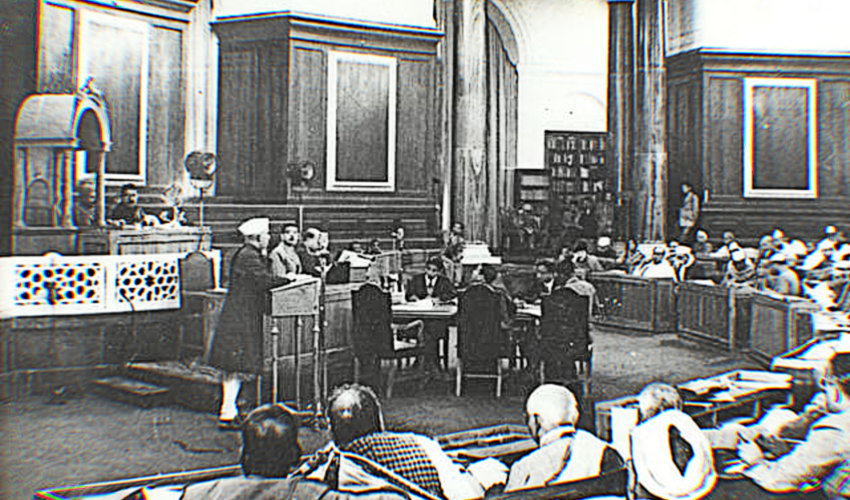
1951 How the First Amendment to the Indian Constitution Circumscribed Our Freedoms & How it was Passed -
1967 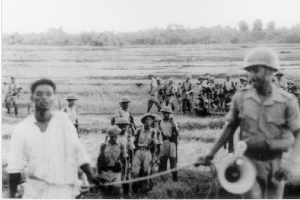
1967 Once Upon A Time In Naxalbari -
1970 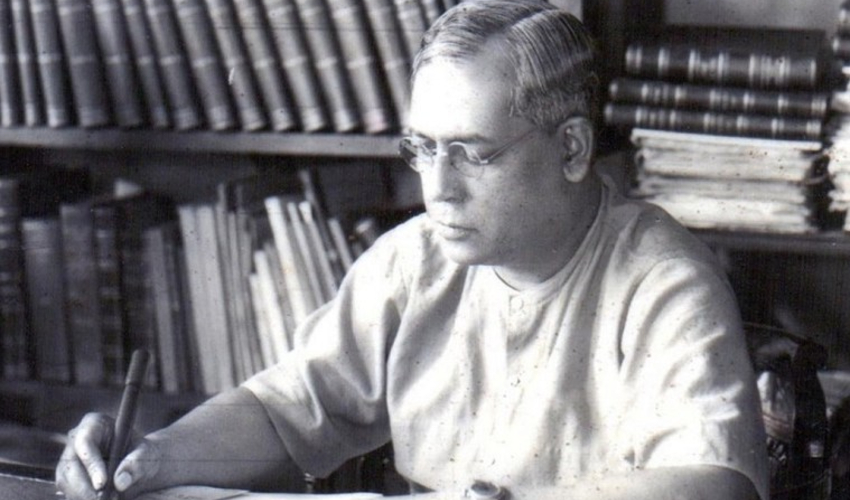
1970 R.C. Majumdar on Shortcomings in Indian Historiography -
1973 - 1993 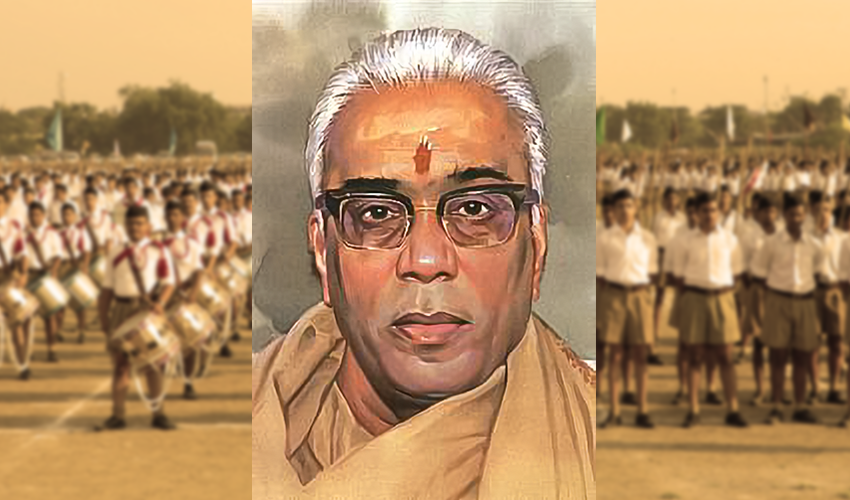
1973 - 1993 Balasaheb Deoras: Kingmaker of the Sangh -
1975 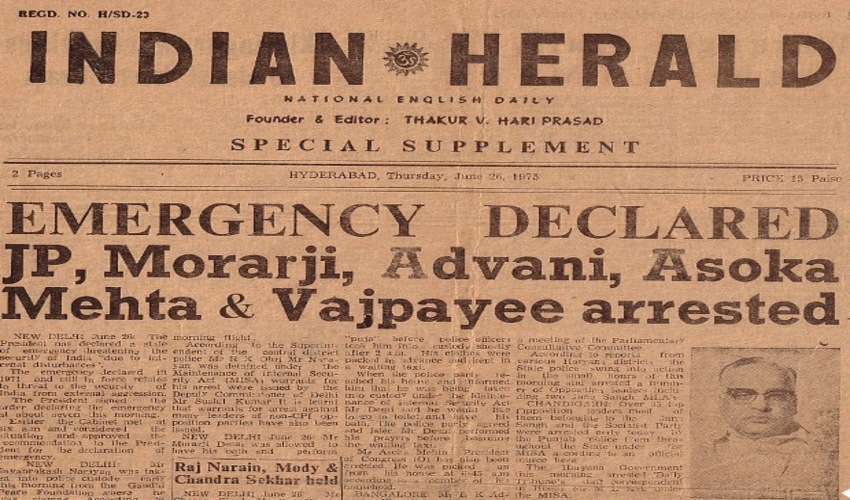
1975 The Emergency Package: Shadow Power -
1975 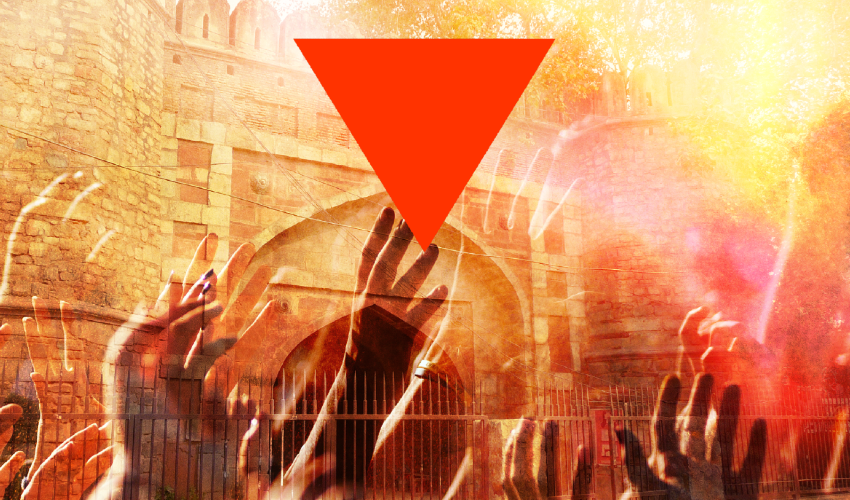
1975 The Emergency Package: The Prehistory of Turkman Gate – Population Control -
1977 – 2011 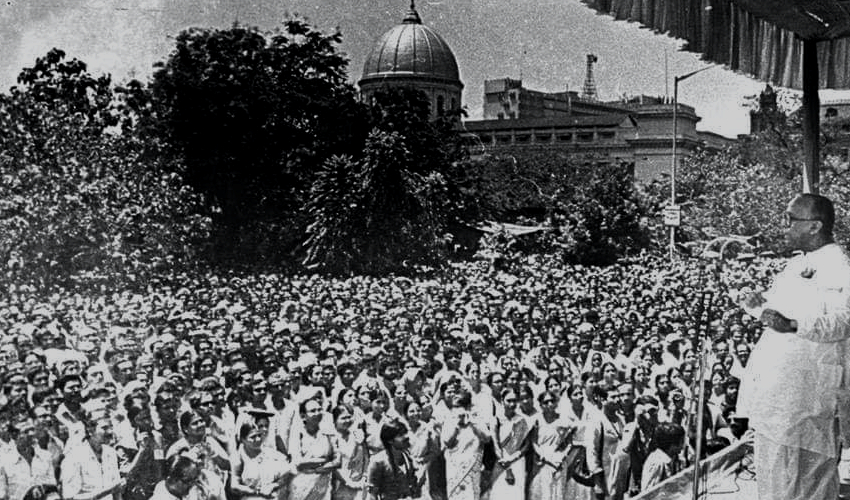
1977 – 2011 Power is an Unforgiving Mistress: Lessons from the Decline of the Left in Bengal -
1984 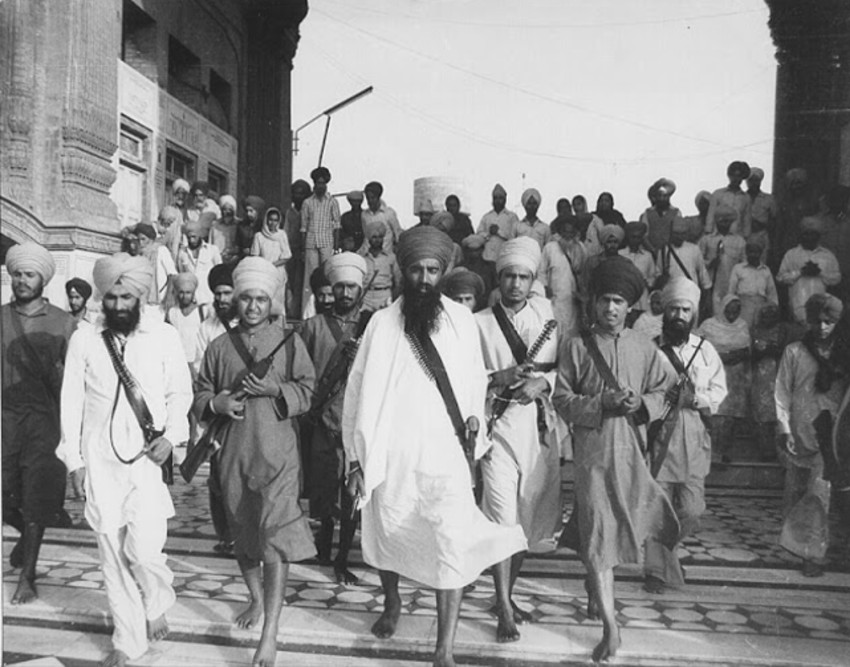
1984 Mrs Gandhi’s Final Folly: Operation Blue Star -
1916-2004 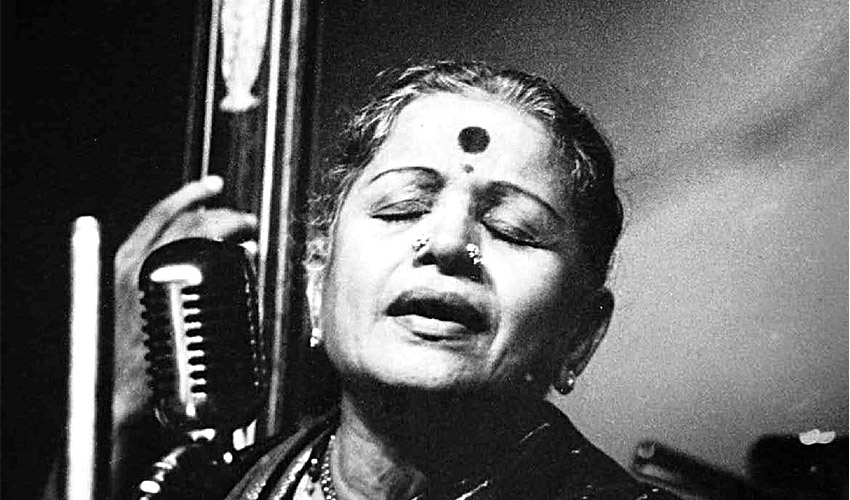
1916-2004 Amjad Ali Khan on M.S. Subbulakshmi: “A Glorious Chapter for Indian Classical Music” -
2008 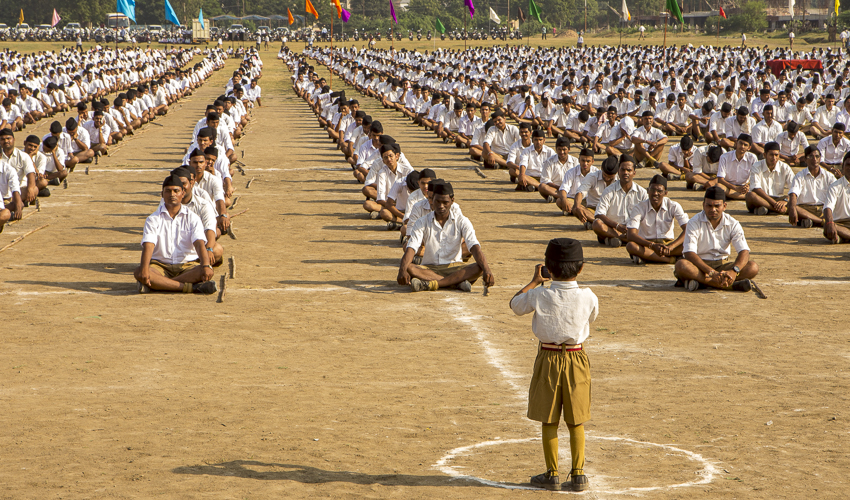
2008 Whose History Textbook Is It Anyway? -
2006 - 2009 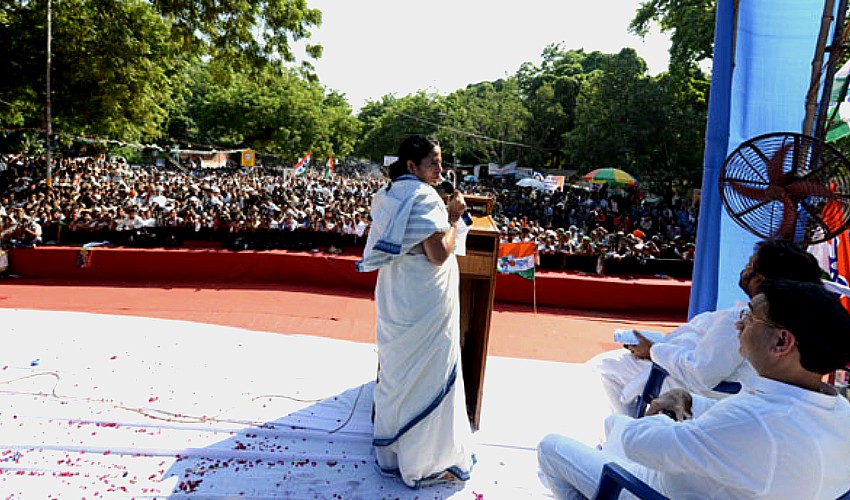
2006 - 2009 Singur-Nandigram-Lalgarh: Movements that Remade Mamata Banerjee -
2020 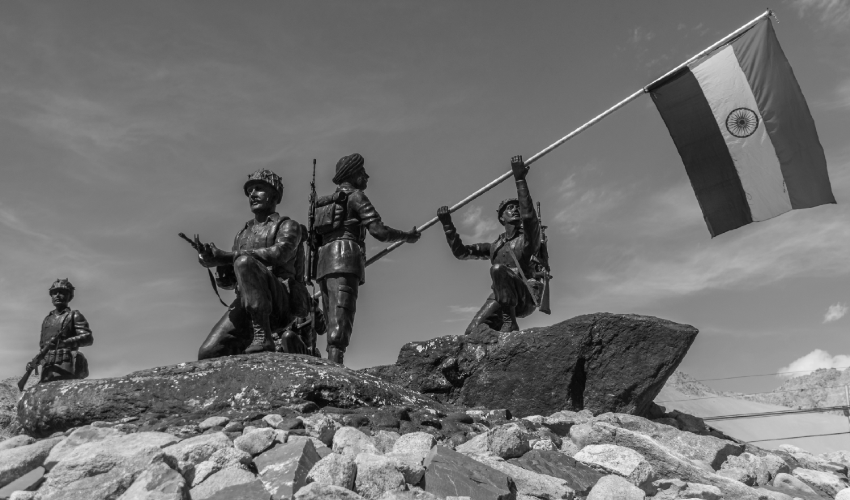
2020 The Indo-China Conflict: 10 Books We Need To Read -
2021 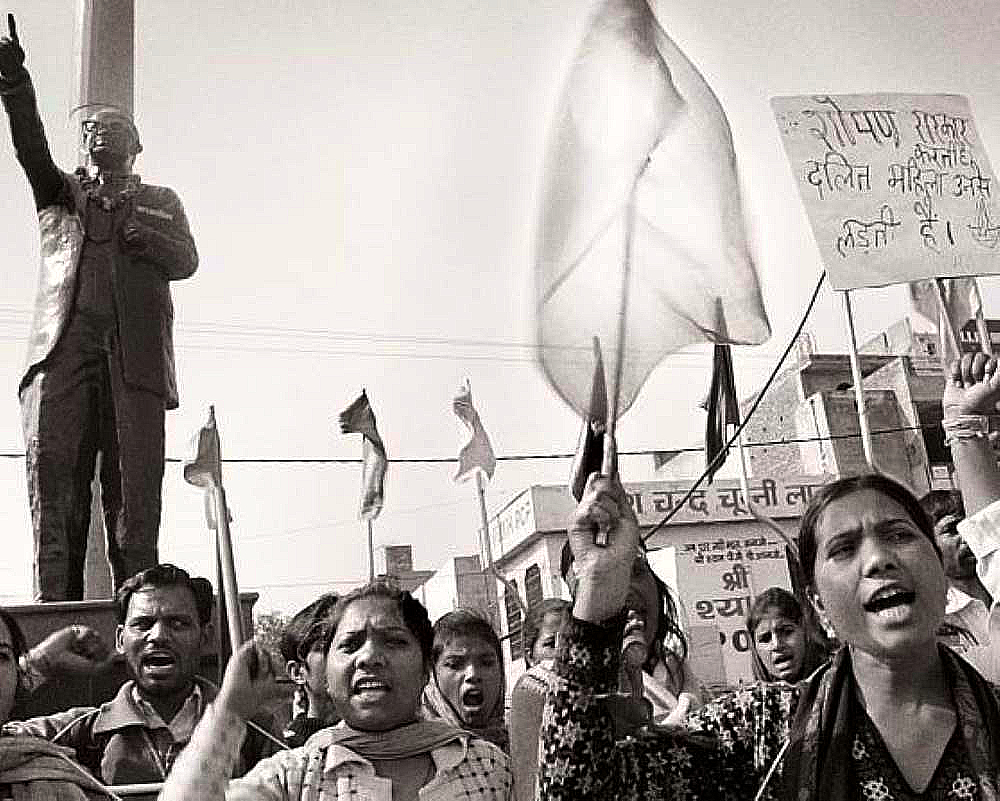
2021 Singing/Writing Liberation: Dalit Women’s Narratives

